


























In 1974, a study was conducted on a few dozen students who were shown a video of a car accident. Half of the students were then asked to estimate the speed of the vehicles when they “hit” each other, while the other half were asked to estimate the speed of the vehicles when they “smashed” into each other. It turned out that the students who were asked about the speed of the vehicles that “smashed” into each other estimated the speed of the vehicles to be much faster than the group who were estimating the speed of the vehicles that “hit” each other. Furthermore, one week later, the groups were brought back, and the group that was reminded about the cars that “smashed” into each other recalled seeing glass breaking during the accident, even though there was no broken glass.
Language is so powerful. The Lubavitcher Rebbe, zt”l, famously never used negative language to describe things. In fact, to say the last sentence, the Rebbe probably would have likely used the phrase “always used positive language” instead of invoking the negative aspect of it. That is a very high level. But the truth is, using positive language doesn’t just affect us and change us in a spiritual way. Psychologically, positive language impacts our lives and rewires our brains to think differently. As the Rebbe always used to say, “Tracht gut, vet zein gut – think good and it will be good.”
This week, the International Criminal Court (ICC) issued a request for an arrest warrant for the leaders of the Hamas savages that brutally tortured, maimed, and killed innocent men, women, and children on October 7. But in the same
breath, they also requested arrest warrants for the leaders of the only democracy in the Middle East, who are valiantly engaged in an effort to root out evil and protect freedom.
With this announcement, the ICC is showing its true colors. When the world hears, “ICC issues arrest warrants for Hamas leader Sinwar and Israeli Prime Minister Netanyahu,” they are equating, in their minds, Sinwar, a sadistic murderer, with Israeli Prime Minister Netanyahu.
And perhaps that is the real reason for this arrest warrant – to create parity between Hamas and Israel. The ICC is a joke on the world stage, with no real power. Netanyahu (and Sinwar) have no concerns about really being arrested. But the headline itself – creating a moral equivalence between Hamas and Israel – was the ICC’s mission. And with this mission, they help Hamas advance its sinister goal against Israel and the world.
When kids are young, they may chant in the playground, “Sticks and stones will break my bones, but words will never harm me.” But as adults, we understand the power of our words. We know that words can break or build worlds.
Whether it is on the world stage or in our own homes, we have the power to create, encourage, inspire, persuade, and boost the people around us. Let us use these powerful forces to uplift those around us and change their worlds.
Wishing you an uplifting and joyful Shabbos with your wonderful family and friends, Shoshana

Yitzy Halpern, PUBLISHER publisher@fivetownsjewishhome.com
Yosef Feinerman, MANAGING EDITOR ads@fivetownsjewishhome.com
Shoshana Soroka, EDITOR editor@fivetownsjewishhome.com
Nate Davis
Editorial Assistant
Nechama Wein
Copy Editor
Rachel Bergida
Shana Brecher
Lani White
Design & Production
Gabe Solomon
Distribution & Logistics
P.O. BOX 266
Lawrence, NY 11559
Phone | 516-734-0858
Fax | 516-734-0857
Classified Deadline: Monday 5:00PM classifieds@fivetownsjewishhome.com text 443-929-4003
PAYMENT VIA CREDIT CARD MUST BE SUBMITTED ALONG WITH CLASSIFIED ADS
The Jewish Home is an independent weekly magazine. Opinions expressed by writers are not necessarily the opinions of the publisher or editor. The Jewish Home is not responsible for typographical errors, or for the kashrus of any product or business advertised within. The Jewish Home contains words of Torah. Please treat accordingly.




Dear Editor,
As the warm summer months approach, I find myself deeply worried about the growing use of mosquito pesticides within our community. While the intention behind their use is to protect us from the annoyance of mosquitoes, we must not overlook the proven detrimental and long-term effects of these substances to our health and the well-being of our children. We must approach the use of these chemicals with caution, as their potential repercussions are not limited to the intended target as the members of our community who willingly apply the chemicals and those who are forced to breathe its vapors second-hand are harmed all the same.
Research has shed light on the detrimental impact of pesticides on people, our environment and living organisms. Numerous studies have linked exposure to these chemicals with adverse health effects, such as respiratory issues, neurological disorders, endocrine disruption, and even certain types of cancer. Children, whose bodies are still developing, may be particularly vulnerable to the potential harms these substances can inflict.
Perhaps we ought to know what’s in these chemicals and reconsider whether our health is not as important as having to be bothered with smacking off a few mosquitoes every now and then. The most popular insecticide companies of the Five Towns treat the grass with a formula containing Bifenthrin. According to the EPA, Bifenthrin is known to be environmentally hazardous. If the spray mist is inhaled, Bifenthrin causes cancers and organ damage, especially to the organs of the reproductive, endocrine, and central nervous system. PBO-8 Synergist is another main ingredient in this treatment.
Piperonyl Butoxide (PBO) is a toxic carcinogen that causes a range of short- and long-term effects, including cancer and adverse impacts on liver function. PBO has been shown to adversely harm a variety of reproductive functions.
The cumulative effect of environmental pollutants is becoming increasingly apparent, and it is doubly unfair to those of us who are aware of the danger yet have no choice but to suffer at the hands of their neighbors whose decisions impact us all. We live in an era where innovative, less harmful alternatives to traditional pesticide use are available.
I implore our community to consider the long-term consequences of mosquito pesticide usage. I sincerely hope that we can reevaluate our approach to mosquito control, prioritizing the long-term well-being of our community members, especially our children. Let us not unwittingly facilitate our own demise in a world already crawling with toxins.
I sincerely thank you for your consideration.
Truly yours,
A Five Towns Resident Yearning to Breathe Free
Dear Editor,
The ba’alei ha-mussar note that in Pirkei Avot, the thirty-second out of the forty-eight steps to acquire Torah is “to love people.” This symbolizes the day before Lag Ba’Omer where the students of Rabbi Akiva died out because of lacking respect for one another. Indeed, loving others is the antidote to not respecting them.
Taking it further, the midrash notes that stinginess can also refer to a refusal to teach others Torah. Rabbi Shimon
Continued on page 12
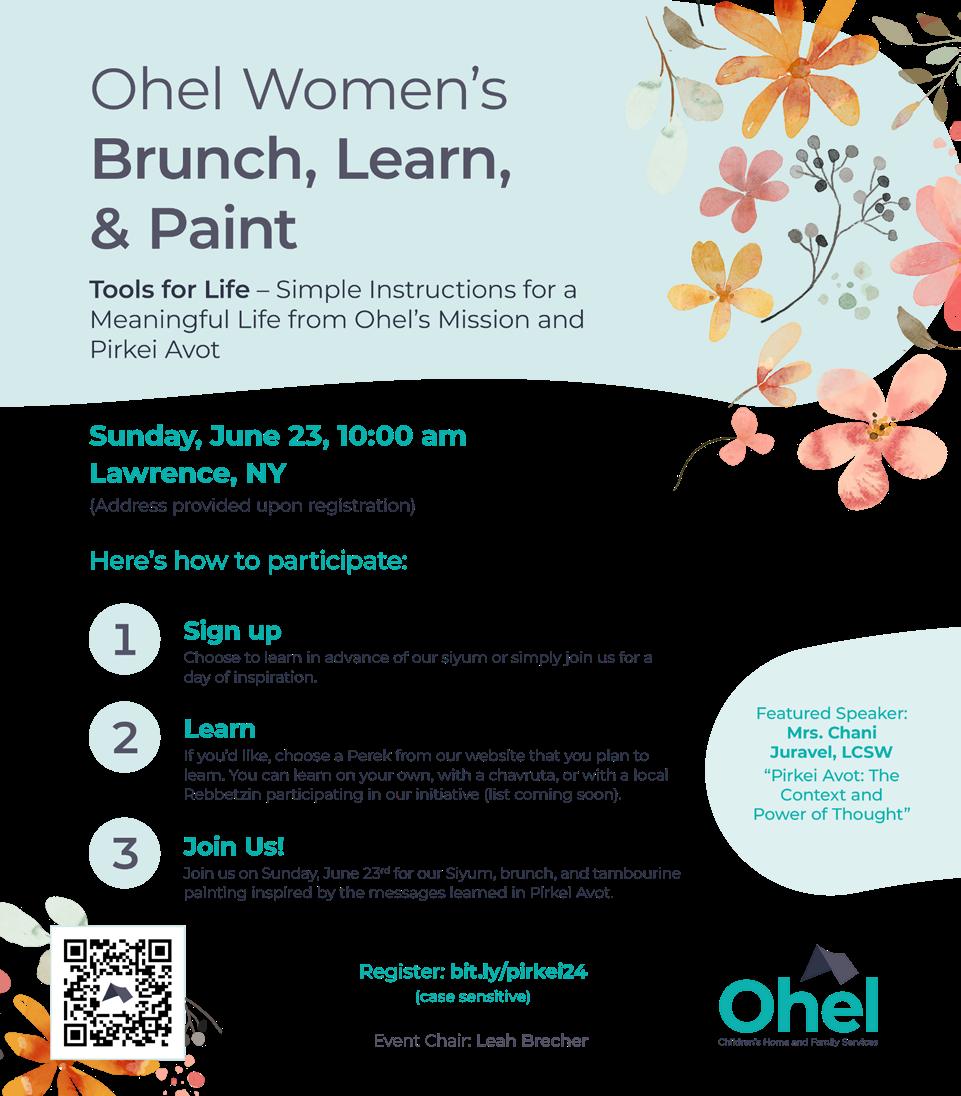
bar Yochai, whose yahrtzeit is on Lag Ba’Omer, was the tikkun to this because he re-disseminated the Torah of Rabbi Akiva.
The gematria of lev tov is forty-nine. This is in fact the key to surpass the forty-eight levels of what’s needed to acquire Torah. It’s the sine qua non to have all blessings.
Rabbi Akiva famously said that the great rule of the Torah is to love your neighbor. We may say if you want the Torah like Rabbi Akiva did, work on achieving a lev tov.
Steven Genack
Dear Editor,
Last Thursday, there was a Pro-Palestinian rally at the Vietnam Memorial Plaza next to 55 Water St. The rally was sponsored by NYC Educators for Palestine. The reason for the rally was the usual message. They want TRSNYC (Teachers’ Retirement of NYC) to divest itself from all business with Israel.
The only connection that TRSNYC had with Israel is via an International Investment Fund, which is one of several funds that pension members may elect for their retirement fund. TRS does not produce any products and otherwise
has no business connections with Israel. Considering how many successful profitable companies there are in Israel, that, in turn, provide significant earnings for this TRS fund, it would be foolish for TRS to divest itself from Israel. Also, considering how many Jewish teachers – active and retirees – are members of TRS, I can’t fathom that members would want such action. Regardless, any member that hates Israel can individually opt to withdraw their investments from this fund and elect a different one.
I am alerting readers who are TRS members to write to the management of TRS to show your support for Israel and ask them to pay no attention to such divestment requests. On a larger scale, if you are a member of DC37, the main NYC union, you should send a similar letter to them.
Think about this angle. NYC Educators for Palestine requests divestment from profitable Israeli companies. Can you name even one Palestinian company that has been profitable?
Daniel FeldmanDear Editor,
I take exception to the article entitled “Trust Biden on Israel anymore? Don’t” on page 123 of your 5/16/24 issue. The

reason for my disagreement with this headline is that it implies some level of confidence in Biden vis-a-vis Israel, as well as vis-a-vis his world outlook in general. I have never been under any such illusion.
Let’s look critically at “Jihad Joe” Biden. This is the same Joe Biden who, when senator, threatened Menachem Begin with cutting off arms supplies to Israel. This is the same Joe Biden who was opposed to the elimination of Osama bin Laden and was the only Cabinet member so inclined. This is the same Joe Biden who pulled out of Afghanistan at the cost of lives of United States Armed Service members and billions of dollars of military equipment left behind. This is the same Joe Biden who provided (and continues to provide) sanctions relief for Iran, as well as billions of dollars in ransom payments. This is the same Joe Biden who has woefully inadequately responded to attacks on vessels in the Red Sea by Houthi Yemenite rebels, funded and supplied by Iran. This is the same Joe Biden who was silent in the face of chants of “Death to America” by Islamist radicals in Michigan. Biden has always been “Jihad Joe” Biden and will continue to be “Jihad Joe” Biden.
Although your article did not mention him, a critical eye must also be cast upon Charles Schumer – Schumer the Schemer/Scammer – who never met a camera that he didn’t like. The compendium of Oral Law, the Talmud, relates how the pig holds its split hooves aloft, proclaiming loudly, “Look! I’m kosher! I’m KOSHER!!” Schumer, the Schemer/ Scammer, in a similar fashion, loudly proclaims, “I am the shomer (guardian) of Israel,” but lacks the required characteristics for that title. Schumer, the Schemer/Scammer, at the time that Obama was ramming the JCPOA with Iran down the throat of America, was against that agreement at first, then for it, then finally against it – but not on the grounds that it would do incalculable damage not only to American and Israel, but to the world in general. Rather, he was permitted by Obama to publicly oppose it since his opposition would not affect the adoption of the agreement and so that Schumer would be able to speciously claim to have “stood up for Israel,” even though his “stance” had no material effect on the outcome, since he did nothing to try to influence enough other Senators to prevent the agreement. This is the same Schumer the Schemer/Scammer who threatened violence against two Supreme Court justices because of opposition to their positions on abortion. This is the same Schumer
the Schemer/Scammer who attempted to interfere in the internal affairs of not only an independent sovereign nation, but an ally of the United States, by calling for the resignation of its prime minister at the time that nation is in the midst of a struggle for its very existence. Schumer the Schemer/Scammer does not raise a peep against the Communist (Bernie Sanders)/Islamist coterie that has hijacked the Democratic Party and the legislative and executive branches of the American government. This is the same Schumer the Schemer/Scammer who expressed support for withholding arms supplies to Israel while it is involved in a struggle for its existence, rather than demanding that actions be taken against Iran if it continues to arm its proxies. Schumer is not only no “guardian” of Israel, but his name can be thought as being an acronym for “SCHakran U Motsi shEm Ra” (liar and defamer, besmirching Israel for fighting a war that was forced upon it). Schumer is indeed “the pig who would be kosher.”
Your article also omits mention of Biden and Schumer’s crony, Nattering Jerry Nadler. This is perhaps not of significance, although he is as contemptible as “Jihad Joe” and Schumer the Schemer/Scammer.
One who is reading this letter might feel that it is full of vitriol, to which I would respond that it perhaps lacks sufficient vitriol.
Truly the most consequential election in our lifetime is now less than six months away. The choice is simple and stark. We are given to choose between “death to America”(“the Great Satan”) and “death to Israel” (“the Little Satan”) versus “make America great again” and make Israel safe again. I choose to “make America great again” and to make Israel safe again.
Dear Editor,
I always love reading your magazine and appreciate all the articles each week. This week, I was heartened to read your note to readers, where you pointed out that protests on college campuses are bringing scores of Jewish youth back to their roots. It was a beautiful way to look at a scary situation that is affecting Jewish teens. And it was a wonderful way to see the love Hashem has for His people.
May He bring Moshiach soon! B. Rosengarten



On Sunday, the president of Iran, Ebrahim Raisi, died in a helicopter crash along with the country’s foreign minister and other officials.
Raisi was 63 years old at the time of his demise. He was nicknamed The Butcher of Tehran for his role in overseeing the executions of thousands of people in 1988 and was a close protégé of the Ayatollah, leading his country in the quest for enriched uranium and recently launching scores of missiles and drones at Israel.
Raisi played a huge role in the 1988 executions, in which political prisoners and militants were sent to their deaths in mass sham trials.
At the time, after Iran’s then-supreme leader Ayatollah Ruhollah Khomeini accepted a UN-brokered ceasefire to the Iran-Iraq war, members of the Iranian opposition group Mujahedeen-e-Khalq, heavily armed by Saddam Hussein, stormed across the Iranian border from Iraq in a surprise attack. Iran blunted their assault.
The trials began at that time. Defendants were asked to identify themselves. Those who responded “mujahedeen” were sent to their deaths, while others were questioned about their willingness to “clear minefields for the army of the Islamic Republic,” according to a 1990 Amnesty International report. It is estimated that 5,000 people were killed in those executions. Raisi served on the commissions.
“I am proud of being a defender of human rights and of people’s security and comfort as a prosecutor wherever I was,” Raisi said.
Raisi’s hardline approach was apparent recently after mass protests swept Iran in 2022 after the death of Mahsa
Amini, a woman who died in police custody after being arrested for not wearing her hijab correctly. More than 500 people were killed in the protests, and more than 22,000 others were detained.
Iran has been a lurking presence in the Israel-Hamas war, which erupted on October 7 when the Hamas terror group massacred more than 1,200 people and kidnapped 252 people. Iran’s other proxies have also been terrorizing the Jewish state.
Only a day after the October 7 terror attack, Raisi hailed the “legitimate defense of the Palestinian nation” and met with leaders of terror groups. He repeatedly praised Hamas and threatened Israel’s annihilation, but denied Tehran had a direct role in the massacre.
It was also under Raisi’s watch that Iran launched a direct attack against Israel last month, sending hundreds of drones, cruise missiles and ballistic missiles at the Jewish state. Thankfully, no one was hurt in those attacks.
Many saw Raisi as a possible candidate for Iran’s supreme leader. The supreme leader in Iran has the final say on all state matters and serves as the nation’s commander-in-chief.
Khamenei had appointed him in 2016 to run the Imam Reza charity foundation, which manages a conglomerate of businesses and endowments in Iran. It is one of many bonyads, or charitable foundations, fueled by donations or assets seized after Iran’s 1979 Islamic Revolution and only answers to Khamenei. The fund that Raisi managed is worth tens of billions of dollars as it owns almost half the land in Mashhad, Iran’s second-largest city.
Raisi was born in Mashhad, to a family that traces its lineage to Islam’s Prophet Muhammad, marked by the black turban he would later wear. He would go to the seminary in the Shiite holy city of Qom and later would describe himself as an ayatollah, a high-ranking Shiite cleric.
Mohammed Mokhber, Raisi’s vice president, waas approved by Khamenei on Monday to be acting president in Raisi’s place. Elections need to be held within 50 days and are set for Friday, June 28. Despite the supposed voting that will be taking place, the next president is expected to be handpicked by Khamenei.
Citizens in the Dominican Republic headed to the polls over the weekend,

handing President Luis Abinader another term.
His two top challengers conceded the election on Sunday.

With this victory, Abinader will be able to hold office until 2028. The 56-year-old former economist and businessman first assumed the presidency in 2020 during the Covid-19 pandemic and has presided over one of the fastestgrowing economies in the region.
Abinader is popular among his constituents. He promised them four more years of economic growth and is expected to expand on his first term’s priorities, which include development, reform, and the fight against corruption.
As president of Dominican Republic Abinader has had to deal with the crisis looming over neighboring Haiti, which shares the island of Hispaniola with the Dominican Republic. The situation has
seen Abinader’s administration seal the island’s shared border and airspace.

Majd Kamalmaz, a psychotherapist from Texas, was detained in Syria in 2017 at a checkpoint in Damascus while visiting his family. Last week, it was determined that Kamalmaz had died.
“Tragically, he did not survive the brutal conditions of the prisons, enduring seven long years without a case, trial or any form of communication with his family,” read a statement from Jonathan Franks, spokesperson for Bring Our Families Home Campaign (BoFH), a group that campaigns on behalf of Americans held hostage or wrongfully detained overseas.

“He was a kindhearted, loving and caring person who embodied these qualities as a son, husband, father, grandfather, brother and uncle.”
Family members struggled with Kamalmaz’s absence, hoping to hear from him – but to no avail. They were hopeful that President Trump would be able to procure his release, but the president was unable to do so. President Joe Biden was also not effective.
“We do feel invisible,” said Maryam Kamalmaz, speaking on the first-ever Hostage and Wrongful Detainee Day about her father’s disappearance earlier this year.
“For the last seven years, we have been struggling to come to grips with my father’s absence,” Maryam Kamalmaz said in the statement announcing her father’s death.
“The anguish and emotional turmoil that our family has been through has taken a heavy toll on our lives. He will be missed tremendously, yet we hope that his legacy of helping others in need lives on and is carried out by many.”
The FBI confirmed, “In 2017, Majd Kamalmaz, a trauma psychologist who worked with individuals affected by war and natural disasters, traveled to Syria to visit a family member,” a statement from the FBI’s Hostage Recovery Fusion Cell read. “Kamalmaz has not been seen or heard from since his disappearance in Syria in February 2017. No matter how much time has passed, the Hostage Recovery Fusion Cell works on behalf of the victims and their families to recover all U.S. hostages and support the families whose loved ones are held captive or missing.”

For three months, Hait’s main international airport lay silent, closed by authorities after relentless gang violence. This week, the Toussaint-Louverture airport in the capital of Port-au-Prince will be open for business, helping to ease a critical shortage of medications and other supplies to the gang-ravaged nation.
The country’s main seaport remains
paralyzed. Gangs control 80% of the capital.
U.S.-based airlines are not expected to start using the airport until late May or early June.
The first commercial passenger flight since March left for Miami on Monday nearly two hours behind schedule. Before Monday, the sole airport operating in Haiti was located in the north coastal city of Cap-Haitien. Many people couldn’t access that airport, with many roads being controlled by gangs that open fire on cars and buses passing through.
When violence began to take hold months ago, the U.S. government had evacuated hundreds of citizens by helicopter from Port-au-Prince, as did nonprofit organizations.
The bloodshed began on February 29, when gunmen seized control of police stations and stormed Haiti’s two largest prisons, freeing more than 4,000 inmates. Many peaceful communities have been caught in the crossfire, rendering thousands of people homeless. Thousands have been killed or injured in the violence.
Gangs also forced former Prime Minister Ariel Henry out of the country. He had been in Kenya on an official trip to try to persuade Kenya to send officers to help with security in Haiti. But when the airport was shut down by gangs, Henry was left with no choice but to resign. A transitional presidential council is seeking a new prime minister. It is also tasked with selecting a new Cabinet and organizing general elections.
In March, Kenya and Haiti signed agreements to try to salvage a plan for the country to deploy 1,000 police officers to the troubled Caribbean nation. Other countries expected to support Kenyan forces include the Bahamas, Barbados, Benin, Chad and Bangladesh.

Last Wednesday, Prime
in
abdomen while greeting supporters outside a cultural center in Handlova. The perpetrator shot at Fico five times before being

tackled by law enforcement. Fico was quickly rushed into a car and underwent a five-hour surgery followed by another two-hour surgery on Friday.
On Monday, the hospital announced, “After today’s consultation, the patient’s condition is stabilized.”
A statement released by the clinic said Fico is “clinically improving, communicating, inflammatory parameters are slowly decreasing.”
He is still in the hospital.
The would-be assassin is being charged with attempted murder and remains behind bars.
Government officials originally said they believed it was a politically motivated attack committed by a “lone wolf,” but announced on Sunday that a “third party” might have been involved in “acting for the benefit of the perpetrator.”
Over the past few months, five U.S. tourists have been detained in the British Overseas Territory on charges of illegally possessing ammunition. The latest ar-
rest took place on Monday, May 13, when 45-year-old Sharitta Shinese Grier was detained in Providenciales, an island in Turks and Caicos, after security officials from Howard Hamilton International Airport found ammunition in her possession.

Grier lives in Orlando, Florida.
On Thursday, Grier came before the Turks and Caicos Magistrate Court. She is expected to reappear in court on July 5, according to police officials.
In early May, the government of Turks and Caicos announced that four U.S. citizens had been charged with bringing ammunition to the islands, an action that is “strictly forbidden” unless police grant an individual permission to do otherwise, the Turks and Caicos Island government said. The minimum sentence for those who are convicted of possessing firearms is twelve years in prison, according to the
U.S. Embassy in the Bahamas. However, the TIC Attorney General, on May 8, said that in “exceptional circumstances,” judges may opt to decrease the minimum sentence.
A few of the charged Americans have denied intentionally bringing ammunition into the islands.
Bryan Hagerich, a U.S. citizen who was arrested in February at the Hamilton International Airport, will likely be sentenced on May 29, Hagerich’s attorney said. Hagerich has pleaded guilty to bringing twenty rounds of ammunition with him on his trip.
Oklahoma Gov. Kevin Stitt, Pennsylvania Gov. Josh Shapiro, and Virginia Gov. Glenn Youngkin have sent a letter to Dileeni Daniel-Selvaratnam, the governor of Turks and Caicos, requesting that she “reconsider the charges” and “expedite… [the] release” of three men from Oklahoma, Pennsylvania, and Virginia.
“They have all maintained that they did not intend to bring ammunition into Turks and Caicos,” the U.S. governors said. “We humbly ask that your government – in its wisdom – temper justice with mercy and recognize that these men made mistakes but had no apparent malicious intent.”
This week, a group of U.S. lawmakers
traveled to Turks and Caicos to press for the Americans’ release. Republican Sen. Markwayne Mullin led the trip, which also was attended by Democratic Sen. John Fetterman and GOP Reps. Guy Reschenthaler, Josh Brecheen, Michael Cloud and Bob Good. The lawmakers met with Turks and Caicos officials, including the governor, attorney general, minister of tourism and police leaders.
“Unfortunately, despite our willingness to work with Turks and Caicos officials to get our constituents home, we were not able to find a path forward today,” Mullin said in the statement. “At this point, well-intentioned American citizens are facing a dozen years in prison all for unknowingly having one or two bullets in their luggage.”
Russian President Vladimir Putin visited Beijing last week to meet with Xi Jinping, the president of China, marking the Russian leader’s first overseas trip since the beginning of his new term, which began last week.
The two leaders discussed Ukraine, Taiwan, and the Middle East, as well as other issues, such as trade, security, and





energy. Putin, along with top Russian defense and security officials, arrived in China on Thursday and stayed for two days.
The relationship between China and Russia continues to stand “the test of rapid changes in the world, demonstrating strength and stability, and [is] experiencing the best period in their history,” said Xi and Putin in a statement, declaring one another “priority partners.”
Amid heavy international sanctions
levied in the wake of the war in Ukraine, Russia has become more and more dependent on Chinese trade, with Putin praising Moscow and Beijing’s “practical cooperation.”
Putin and Xi have met four times since the war in Ukraine broke out in 2022, with China remaining “neutral” and refusing to criticize Russia’s actions. In the past few weeks, the U.S. has accused China of providing support to Russia in its war effort, including by exporting ma-
leader adding that he welcomes China’s willingness to “play a constructive role.”
“It is necessary to eliminate its [the conflict’s] root causes and adhere to the principle of the indivisibility of security,” said Putin, suggesting that NATO is at fault for the war in Ukraine.

The two countries have criticized the U.S. for taking on a “clear anti-Russian and anti-Chinese orientation” in its military actions with allies, with Xi claiming that “unilateral hegemony, camp confrontations, and power politics threaten world peace and security of every country.”
The two leaders also “reaffirmed there can be no winners in a nuclear war and it should never be fought.”
Xi and Putin have met 43 times since the Chinese leader rose to power in 2012.

For the first time, Jake Sullivan, the Biden administration’s national security advisor, met with representatives from seventeen nations whose citizens were taken captive in Israel on October 7 by the Hamas terror group.
chine tools, drone and turbojet engines, and microelectronics. Beijing has denied such claims and insists that it and Moscow maintain “normal trade and economic exchanges.”
China has advocated for a compromise to be brokered between Russia and Ukraine.
“China hopes for peace and stability in Europe soon, and continues to play a constructive role,” Xi said alongside Putin at a joint press conference, with the Russian
In addition to the United States, citizens from seventeen countries were dragged into Gaza on October 7, including those from Argentina, Brazil, Colombia, Canada, United Kingdom, France, Germany, Denmark, Poland, Hungary, Austria, Serbia, Romania, Bulgaria, Spain, Portugal, and Thailand. Sullivan held a meeting with officials from each of the seventeen countries last Wednesday to discuss potential ways of bringing the remaining hostages home, as the prospect of a near-future hostage deal appears increasingly unlikely.

24
During the meeting, the representatives thought of ideas on how to persuade Israel, Egypt, Qatar, and other parties to restart negotiations for a ceasefire and hostage release deal. The officials also discussed the idea of forming a group together in the United Nations and other public and private settings.
Last week, Sullivan had another meeting with relatives of the U.S. citizens who were kidnapped on October 7, during which the idea of forming a group with representatives from each of the aforementioned countries was proposed.
In late April, the seventeen countries and the U.S. issued a statement, declaring the wellbeing of the hostages a matter “of international concern” and called on Hamas to agree to the ceasefire deal that Israel had, at the time, proposed.
“We emphasize that the deal on the table to release the hostages would bring an immediate and prolonged ceasefire in Gaza, that would facilitate a surge of additional necessary humanitarian assistance to be delivered throughout Gaza, and lead to the credible end of hostilities,” the countries stated. “We reiterate our call on Hamas to release the hostages, and let us end this crisis so that collectively we can focus our efforts on bringing peace and stability to the region.”
While the U.S. has generally been supportive of Israel since war broke out on October 7, the two nations’ “ironclad” relationship was put into question earlier this month when U.S. President Joe Biden threatened to withhold weapons from the Jewish state if it crosses the “red-line” by significantly expanding its ground campaign into Rafah.

Lai Ching-te was sworn in as president of Taiwan on Monday, marking the Democratic Progressive Party’s (DPP) third consecutive term.
Lai, a 64-year-old doctor who was previously the island’s vice president, was sworn in along with the new vice president, Hsiao Bi-khim, who used to work

as a top Taiwanese envoy to the United States.
The new president, during a thirty-minute speech at his inauguration, said that a “glorious era of Taiwan’s democracy has arrived” and called on China “to cease their political and military intimidation against Taiwan, share with Taiwan the global responsibility of maintaining peace and stability in the Taiwan Strait as well as the greater region, and ensure the world is free from the fear of war.”
Lai added, “The future of the Republic of China Taiwan will be decided by its 23 million people. The future we decide is not just the future of our nation, but the future of the world,” referring to Taiwan by its official name.
Lai succeeded DPP’s Tsai Ing-wen, the first female president of Taiwan, who was ineligible to run again due to term limits.
In the months before the election, China issued warnings, threatening that a victory for the DPP would make the prospect of conflict between Beijing and Taipei more likely. Beijing claims that Taiwan is a part of China.
Six years ago, Lai expressed his support for Taiwan’s independence, a controversial movement. However, Lai has since changed his stance, now declaring
that “Taiwan is already an independent sovereign country” and thus, there is “no plan or need” to push for the island’s independence.
“Taiwan independence is a dead end. No matter what pretext or banner one uses, promoting Taiwan independence and secession is doomed to fail,” said China’s Foreign Ministry in response to Lai’s inauguration.
“So long as China refuses to renounce the use of force against Taiwan, all of us in Taiwan ought to understand, that even if we accept the entirety of China’s position and give up our sovereignty, China’s ambition to annex Taiwan will not simply disappear,” Lai said.
Following Lai’s swearing-in, U.S. Secretary of State Antony Blinken congratulated Lai and “the Taiwan people for once again demonstrating the strength of their robust and resilient democratic system.”
“We look forward to working with President Lai and across Taiwan’s political spectrum to advance our shared interests and values, deepen our longstanding unofficial relationship, and maintain peace and stability across the Taiwan Strait,” added Blinken.
On the day of Lai’s inauguration, China’s Taiwan Affairs Office criticized Lai for “sending dangerous signals of seeking



independence, provocations and undermining peace and stability across the Taiwan Strait.”
Chinese leader Xi Jinping previously expressed his goal of reunifying Taiwan with China, although the People’s Republic of China has never controlled Taiwan. Few citizens of Taiwan are interested in being governed by China, with less than 10% supporting unification. The “1992 consensus,” which dictated that Taiwan and mainland China are part of one coun-
try, has been rejected by the DPP and supported by KMT, an opposition party. China refuses to hold talks with Taiwan if the consensus is not respected.
According to the U.S. Defense Department and the Nigerien Ministry of
when the African nation’s ruling junta ended the agreement that permitted U.S. military and Defense Department officials to operate in Niger. Nevertheless, a senior U.S. official has said that Niger still wants “to maintain a relationship with us, and that relationship is certainly informed by where we’ve been with them.” How the U.S. and Niger will continue working together in the future is currently unclear.
The U.S. has been withdrawing its forces via commercial flights up until now. However, this new agreement will now allow forces to withdraw via military flights.

For over a decade, the U.S. has worked with Niger to fight against terrorism in West Africa, with American troops operating in the Agadez and Niamey bases. Now, the U.S. is only left with its base in Niamey, which it shares with Russian forces.
“Niger has been really an anchor for our counterterrorism efforts over a decade,” said a defense official.
As part of the U.S. and Niger’s meetings last week, Chris Meier, the assistant secretary of defense for special operations and low-intensity conflict, led the U.S. delegation, while Nigerian military chief of staff Col.-Maj. Mamane Sani Kiaou led the Nigerien delegation.
“Both delegations confirmed the guarantees of protection and security to the American forces during their withdrawal. The delegations also established procedures to facilitate the entry and exit of U.S. personnel, including overflight and landing clearances for military flights,” the nations jointly stated.
National Defense, the United States will withdraw its forces and military equipment from Niger by September 25, as per a newly brokered agreement between the two nations.
Fewer than 1,000 American troops are currently in Niger. The withdrawal will force those troops to leave the West African country along with their equipment.
Niger had urged the U.S. to withdraw its military from the country since March
According to a defense official, “sensitive equipment, lethal equipment, hazardous equipment” and the like will have to be removed, while non-mobile items, such as housing and life support equipment, will likely be left behind. The same official said that it is unlikely for the Russian military to take or use the leftover equipment.
“We got the strong sense in the conversations that they do not intend to share what equipment is left behind with any other party that might be here or in the future,” the official added. “At least for the time being.”


“The United States and Niger are committed to ongoing diplomatic dialogue to define the future of their bilateral relations,” the two countries said.
Niger, located in Africa, is bordered by Libya, Chad, Nigeria, Benin, Mali, and Algeria. It is the largest landlocked country in West Africa. More than 80 percent of its land lies in the Sahara Desert. Around 25 million people call Niger their home. It is one of the poorest countries in the world.

A 4.4-magnitude earthquake shook the area around Campi Flegrei supervolcano close to Naples, Italy, on Monday.
The tremor in Pozzuoli, a densely populated port city, was followed by 150 quakes that were also strongly felt in Naples.
Many people fled their homes as cracks formed in their walls and chunks of masonry collapsed. Schools were closed on Tuesday in some areas.
“We left our home at midnight and went to our son’s in Vomero [Naples],” Mimmo Pignatelli, who lives in Solfatara, a town adjacent to one of Campi Flegrei’s 24 ancient volcanic craters, said.
“We are used to the quakes – but this one was very frightening as it was the strongest in 40 years. We could feel the ground move as we walked.”
At least 360,000 people live in the seven areas of Campi Flegrei which are most susceptible to seismic activity. Tremors have increased over the past two years, with the frequency and strength of the quakes increasing as the caldera, the basin at the top of the volcano, weakens and pressure beneath it builds. This causes the ground to rise and the volcano’s crust to stretch.
The 7-mile Campi Flegrei caldera is a much larger volcano than the nearby, cone-shaped Vesuvius, which destroyed the ancient Roman city of Pompeii and is much more active.
The supervolcano has been in a restless state for more than 70 years as a result of a phenomenon known as bradyseism, which scientists understand to be
the gradual movement of part of Earth’s surface caused by the filling or emptying of an underground magma chamber or hydrothermal activity. The last time Campi Flegrei had a comparable burst of earthquakes was in the early 1980s.
The Italian government has developed a mass evacuation plan in case of emergency.

Severe turbulence on a Singapore Airlines flight from London to Singapore this week led to the death of one person. Thirty other people were injured.
The Boeing 777-300ER plane was diverted to Bangkok. There had been 211 passengers and 18 crew who were on board.
The person who died was revealed to be a 73-year-old man from Britain.
The aircraft had supposedly plummeted 6,000 feet during the episode, causing people’s heads to slam into the overhead bins.
Singapore President Tharman Shanmugaratnam issued a statement on his social media accounts, expressing “condolences to the family and loved ones of the deceased.”
Singapore’s Minister for Transport Chee Hong Tat added that he was “deeply saddened to learn about the incident,” in a statement posted to his social media.
“Ministry of Transport, Singapore, Singapore Ministry of Foreign Affairs, Civil Aviation Authority of Singapore and Changi Airport officials as well as SIA [Singapore Airlines] staff are providing support to the affected passengers and their families,” he said.
Turbulence occurs when a plane flies through clashing bodies of air moving at widely different speeds. Light and moderate turbulence can cause unsecured items to move around the cabin. Severe turbulence can throw passengers around the aircraft, causing severe injuries and occasionally death.
The military of Congo said on Sunday that it had foiled a coup attempt involving

foreigners, hours after a gunfight near the presidential palace in which at least three people were killed.
In a brief statement on state television, an army spokesperson, Brig. Gen. Sylvain Ekenge, initially offered little detail about the purported putsch in the capital, Kinshasa, other than to say that the plotters and their leader had been “put out of action.”

But he later told The Associated Press that three Americans were among the perpetrators, and the United States ambassador to Congo, Lucy Tamlyn, acknowledged publicly that American citizens may have been involved.
The United States will cooperate “to the fullest extent” with Congolese authorities “as they investigate these criminal acts and hold accountable any U.S. citizen involved,” she said on the social network X.
Her statement came hours after vid-
eos circulated widely on social media showing a white man with a bloodied face sitting at the feet of Congolese soldiers — one of three Americans the military accused of involvement.
President Felix Tshisekedi, who was reelected for a second term after a chaotic vote in December, was unharmed in the incident. But its brief and apparently confused nature, as well as many incongruous details, left many Congolese puzzled Sunday and triggered intense speculation about who was behind it, or whether it was even a genuine coup attempt.
A wave of military takeovers in central and western Africa in recent years has caused alarm in Washington, D.C., because they have undermined democracy in the region and given Russia opportunity to increase its influence. In Niger, where the military seized power in August, the government is pressing the United States to withdraw its troops from bases where Russian personnel have started to arrive.
Congo is a focus of U.S. policy in Africa for its deep reserves of cobalt, a key mineral in the production of electric vehicles. China owns or controls most of Congo’s cobalt-producing sites, a source of concern to the Biden administration. But although most of the region’s re-
cent coups have been led by senior military officers from those countries, the purported one in Kinshasa on Sunday appeared to have been led by an obscure opposition politician based in the United States and appeared to have little prospect of succeeding. (© The New York Times)
had requested arrest warrants from the court’s judges for Prime Minister Benjamin Netanyahu and Defense Minister Yoav Gallant, along with top Hamas leaders.
According to Khan, the charges against Israel’s premier and defense chief are for the crimes of “causing extermination, causing starvation as a method of war including the denial of humanitarian relief supplies, deliberately targeting civilians in conflict.”

Earlier this week, Karim Khan, the chief prosecutor of the International Criminal Court, announced that he
“We submit that the crimes against humanity charged were committed as part of a widespread and systematic attack against the Palestinian civilian population pursuant to State policy. These crimes, in our assessment, continue to this day,” said Khan in reference to Netanyahu and Gallant.
In an effort to appear “evenhanded,” the prosecutor said he is also applying for arrest warrants against Hamas leaders Yahya Sinwar and Ismail Haniyeh along with Hamas’ military chief Mohammed Deif.
The charges against the terrorist leaders included extermination, murder, hostage-taking, and assault.
“We submit that the crimes against humanity charged were part of a widespread and systematic attack against the


civilian population of Israel by Hamas and other armed groups pursuant to organizational policies,” said the statement.
Both Sinwar and Deif are believed to be hiding in Gaza as Israel tries to hunt them down. Haniyeh is based in Qatar and frequently travels across the region.
Israel is not a member of ICC, and Netanyahu and Gallant do not face any immediate risk of prosecution.
War cabinet minister Benny Gantz slammed the decision, saying that Israel’s military is complying with international law in its fighting in Gaza, calling the decision “a crime of historic proportions.”
“The State of Israel is waging one of the just wars fought in modern history following a reprehensible massacre perpetrated by terrorist Hamas on the 7th of October,” he said in a statement.
“While Israel fights with one of the strictest moral codes in history, while complying with international law and boasting a robust independent judiciary, drawing parallels between the leaders of a democratic country determined to defend itself from despicable terror to leaders of a bloodthirsty terror organization is a deep distortion of justice and blatant moral bankruptcy,” Gantz said.
“The prosecutor’s position to apply for arrest warrants is in itself a crime of his-
toric proportions to be remembered for generations,” he added.
The ICC’s decision “equates the victim with the executioner,” senior Hamas official Sami Abu Zuhri told Reuters, alleging that it encourages Israel to continue its “war of extermination” in Gaza.
Khan had visited Israel in December on an official trip. After touring some of the towns attacked by Hamas on October 7, 2023, and hearing testimonies from survivors, he said he had witnessed “scenes of calculated cruelty” and that it was clear to him the victims had been targeted because of their identities.
He also said he felt duty-bound to work with the court’s prosecutors to open investigations into Hamas’s actions on October 7.
On Monday evening, Netanyahu said in a video statement that the “absurd and false warrant by the prosecutor in The Hague is directed not only against the prime minister of Israel and the defense minister but against the entire State of Israel.”
He added, “It is directed against the IDF soldiers, who are fighting with supreme heroism against the vile Hamas murderers.
“With what chutzpah do you dare compare the monsters of Hamas to the

soldiers of the IDF, the most moral army in the world?” the premier queried. “With what audacity do you compare between the Hamas that murdered, burned, butchered … and kidnapped our brothers and sisters, and the IDF soldiers who are fighting a just war that is unparalleled, with a morality that is unmatched?”
He noted that the comparison between Hamas and Israel is an example of the “new antisemitism” that has been become rampant throughout the world.

Five Israeli soldiers were tragically killed by friendly fire on Wednesday, May 15, in the Gazan city of Jabaliya, with seven others sustaining injuries from the incident.
The fallen soldiers were named as Sgt. Ilan Cohen, Sgt. Daniel Chemu, Staff Sgt. Betzalel David Shashuah, Staff Sgt. Gilad Arye Boim, and Cpt. Roy Beit Yaakov.
All five soldiers were buried last Thursday, except for Ilan Cohen, a twenty-year-old Argentinian immigrant who was a student at Yeshiva Har Bracha, a program that merges Torah learning with military service. Cohen fought in the 202nd Battalion of the Paratrooper’s Brigade and was a lone soldier.
“Ilan was a pleasant person. I was surprised by how quickly he integrated in all aspects: socially and scholastically. He didn’t let anything stop him, even when he had difficulties with the language [Hebrew],” said Barel Shevach, a rabbi at Cohen’s yeshiva, adding that he was “fearless…and Zionistic in every fiber of his being.”
Chemu, who was also a twenty-yearold lone soldier, grew up in Tiberias and was buried in Netanya. Just a few months ago, on October 26, Chemu had donated his bone marrow to save the life of a sixtyyear-old woman.
“We grieve with the rest of Israel for every person who gives their life to protect us, all of us, including the five who fell yesterday,” said Tiberias community leader Avionam Gotliv. “But the fact that he came from our community, from our circles, made it even more poignant.”
Roy Beit Yaakov, the commander of
the forces attacked in the friendly fire, hailed from the Israeli settlement of Eli. His father, Avidan Beit Yaakov, the village’s mayor, said that his deceased son was “a quiet and gentle combatant, humble and goal-oriented.”
Betzalel David Shashuah was buried in the Kiray Shaul cemetery in Tel Aviv, the city where he resided. Thousands attended his funeral.
“The most important thing to him was unity among the People of Israel,” Shashuah’s family wrote of him.
Gilad Arye Boim, 22, was from the settlement of Karnei Shomron. Boim’s sister, Chen Lapid, addressed the troops who mistakenly killed him and said, “We embrace you. We feel no anger toward you. We know that everything you did was for the People of Israel. Carry on with your important mission and, when you’re able, come visit us.”
Boim’s uncle, Kalman Libeskind, a well-known journalist with the Kan public broadcaster, called his late nephew on X “a boy of light and kindness, a loyal soldier of this good land, who was killed defending the homeland.”
According to the IDF, an Israeli tank operating alongside the paratroopers in Jabaliya fired two shells at a building where they were gathered at around 7 p.m. The forces had later identified a gun barrel from one of the windows of the building and believed it was enemy forces, leading them to fire the two shells.

The IDF has confirmed the deaths of Sonthaya Oakkharasr and Sudthisak Rinthalak, two Thai nationals who were working in Kibbutz Be’eri when Hamas launched its sudden attack on southern Israel on October 7, murdering more than 1,200 Israelis, kidnapping over 250 others, and wounding thousands more.
Oakkharasr and Rinthalak were previously believed to be alive in Hamas captivity, but the IDF, on Thursday, confirmed that the two were killed on October 7, with the Hamas terror group holding onto their bodies in Gaza.



“On October 7, Hamas terrorists brutally murdered 39 Thai nationals and kidnapped 31 Thai nationals to Gaza,” said IDF Spokesman Rear Adm. Daniel Hagari. “Like them, other foreign nationals were abducted, including from Tanzania, Nepal, Mexico, the U.S., and France.”
He noted, “The terrible cruelty of Hamas was used against anyone that stood in its way, without distinction of their origin.”
Eight Thai nationals likely remain in Gaza, while 23 were freed during a shortlived hostage deal in late November.
The government of Thailand expressed its condolences to the loved ones of Oakkharasr and Rinthalak and called for “the immediate release of all remaining hostages, including the six remaining Thai nationals in Gaza, so that they may return home safely.” The Thai government added that “all sides [should] exercise their utmost efforts in negotiations leading to an urgent solution to the current humanitarian crisis in Gaza.”
According to the Hotline for Refugees and Migrants, Oakkharasr would have celebrated his 31st birthday on May 16, had he been alive.
“We share in the grief of the families of Sudthisak Rinthalak and Sonthaya Oakkharasr, who discovered this evening
that their loved ones were murdered on October 7 and their bodies have been held captive ever since,” the hotline wrote on X. “In the horrific massacre carried out by Hamas on October 7, 66 immigrants were murdered — far above their proportion in the Israeli population. People who were innocent of any crime, who crossed the world to make a living and ensure a better future for themselves and their families.”
Around 30,000 Thai nations had been working in Israel during the October 7 massacre. Hamas currently holds 128 hostages; at least 38 have tragically passed away while in captivity. In late November, 105 abductees were freed, while three were later rescued by the IDF. The remains of twelve others were recently recovered as well.
Shani Louk, Itzhak Gelerenter, Amit Buskila, and Ron Benjamin, who were murdered on October 7 by Hamas and whose bodies were held in Gaza for over seven months, were recovered by the IDF over the weekend. Shani, Itzhak and Amit were finally laid to rest by their families

on Sunday. Ron was buried on Monday.
Shani, Itzhak and Amit had been attending the Supernova music festival on the tragic day of October 7. Ron was murdered while on a bike ride.

Shani, a twenty-two-year-old German-Israeli, was buried in Srigim, a town south of Beit Shemesh.
“I didn’t believe they’d be able to bring her body back, and it was a relief when the army informed us that they’d found her body and that it was complete,” said Shani’s mother, Ricarda, who spoke of her late daughter’s love of nature, dancing, sewing, and art.
Shani had advocated for peace. Her funeral concluded with the playing of her song, “Home,” which includes the lyrics, “I don’t want war.”
“We did everything to achieve peace, but that has now passed,” Shani’s father, Nissim, said. “Our leadership repeats the same mistakes, without learning. [Albert] Einstein once said that only a fool does the same thing again and again and expects that the result will be different each time. If we continue to make the same mistakes of the last few decades, we will likely lose our country.”
On Sunday, thousands attended the funeral for Amit, 28, who was a fashion stylist. Her mother, Ilana, said, “I prayed for a different ending to the torment I’ve been through.”
“I was lucky to have you for 28 years,” her mother added. “You wrapped me in love, you were my inspiration… you entered the hearts of the people of Israel.”
Amit’s brother, Siel, eulogized her, saying she was “the light, the sun, she had courage and bravery. I was proud of your strength, my beloved little sister… You dreamed of conquering the world, but now your bed is made up and empty. The mirror in your room will not see your face. The pots in the kitchen will not feel the warmth of your hands. You were killed for being Jewish.”
“You are in a good world now, and you have left us shattered,” her father, Meir, said.
Itzhak’s brother, Itay, said at his funeral, “We understood, truthfully, that we can be comforted by [the fact that] we have a grave, we have somewhere to cry, somewhere to fall apart.”
Itzhak’s daughter, Yarden Pivko,
called her father a “smiling person, witty, with a sense of humor, the first dad to show up when called, a wonderful grandfather. As much as he was macho and strong and tough, with my daughters he was like butter. All his tenderness emerged. He was a wonderful person, a good friend, he totally loved life.”
She added, “We are grateful for the opportunity to say goodbye properly. There is comfort in that… This is the first time I have said ‘good morning’ since October 7, specifically on the day of my father’s funeral, because the lack of knowledge [about him] has been too heavy a weight to walk around with and live with,” Pivko said.

On Sunday, the IDF announced the tragic deaths of two soldiers who had been killed during fighting in Gaza.
Staff Sgt. Nachman Meir Haim Vaknin, 20, from Eilat, and Staff Sgt. Noam Bittan, 20, from Yad Rambam, were both part of the Givati Brigade’s reconnaissance unit.
Nachman and Noam were killed and another two soldiers and an officer of the unit were seriously wounded as a result of a blast in a booby-trapped tunnel shaft in the Rafah area.
Their deaths brought the toll of slain troops in the IDF’s ground offensive against Hamas in Gaza and in operations on the border to 282.
In a separate incident, a reservist of the 5832nd Combat Engineering Battalion was seriously wounded in Rafah after his D9 armored bulldozer was hit by an RPG.
The IDF has been fighting hard in Gaza. On Saturday morning, the military said the air force struck more than 70 targets throughout the Strip over the past day, as ground forces operated in Rafah, Jabaliya in the north, and the Netzarim Corridor.
The forces targeted weapon depots, infrastructure, and buildings belonging to terror groups, as well as operatives.
One of the airstrikes in Rafah killed

38 a senior Palestinian Islamic Jihad operative, who the IDF said was head of logistics for the terror group in the city in southern Gaza. “As part of his role, he was responsible for preparing the enemy for the IDF maneuver in Rafah,” the military said.
Thousands of Palestinians have been evacuated from the area. Hamas maintains a stronghold in the area, where at least four of its battalions are deployed. Israel also believes that many of the hostages taken on October 7 are being held in Rafah.
video. “It’s an important move towards reversing longstanding inequities.”
In April, the Justice Department recommended the drug’s reclassification to a Schedule III substance. Other Schedule III substances include ketamine, Tylenol with codeine, and other prescription drugs.

On Thursday, the Biden administration moved further along in its plans to reclassify marijuana.
“Today, my administration took a major step to reclassify marijuana from a Schedule I to a Schedule III drug,” President Joe Biden said in a social media
If the reclassification is put into effect, the federal marijuana law would be significantly changed. Biden has previously pardoned every individual convicted of federal marijuana offenses and has called on state governors to do the same. A number of states already permit the use of medical and recreational marijuana.
The proposal will be open to public comment for sixty days, after which the Drug Enforcement Administration’s administrator may have an administrative law judge consider the proposal and make a suggestion on the reclassification. The

Justice Department would then make the final decision on whether to reschedule marijuana.
“Today’s announcement builds on the work we’ve already done to pardon a record number of federal offenses for simple possession of marijuana. It adds to the action we’ve taken to lift barriers to housing, employment, small business loans, and so more for tens of thousands of Americans,” the president said in a video. “Look, folks: no one should be in jail for merely using or possessing marijuana. Period.”
He added, “Far too many lives have been upended because of a failed approach to marijuana, and I’m committed to righting those wrongs. You have my word on it.”
Biden’s advisors have privately admitted that the move could win over young voters, especially as the president struggles at the polls.
For over fifty years, marijuana was classified as a Schedule I drug, alongside heroin and other hard substances. It will likely take a while before marijuana can be federally rescheduled, as the reclassification process is extensive.

Birthdays are always full of surprises. Some people receive surprise gifts, while others get surprise parties. During his 80th birthday bash last week, former New York City mayor Rudy Giuliani received a different kind of surprise: a surprise indictment served to him right in the middle of the party.
The party, which was hosted by GOP fundraiser Caroline Wren, took place in Palm Beach, Florida, on Friday night. Following the serving of the indictment, Arizona Attorney General Kris Mayes posted on X, “The final defendant was served moments ago. @RudyGiuliani nobody is above the law.”
Giuliani, who worked as the lawyer for former President Donald Trump after the 2020 election, was charged in Arizona, alongside Mark Meadows and a number
of other state Republicans, for allegedly promoting lies about voter fraud and attempting to interfere with the 2020 election by having fake electors vote for Trump in Arizona and other states.
The former mayor of New York City, who served from 1994 to 2001, has also been hit by two defamation suits and more legal troubles in Georgia.
Guests at the party were reportedly “visibly angry as they shouted at the individuals that served the former mayor,” while, according to Giuliani’s spokesman Ted Goodman, the former mayor seemed unmoved by the indictment “and enjoyed an incredible evening with hundreds of people.”
Previously, Giuliani posted, “If Arizona authorities can’t find me by tomorrow morning: 1. They must dismiss the indictment; 2. They must concede they can’t count votes.”
Finding Giuliani was difficult, acknowledged Richie Taylor, a spokesperson for Attorney General Mayes, who wouldn’t give up until Giuliani was found.

The FBI cut ties to at least a handful of informants and issued warnings about dozens of others after an internal review prompted by concerns that they were linked to Russian disinformation, current and former U.S. officials said.
The review was carried out in 2020 and 2021 by a small group within the bureau’s counterintelligence division, with the findings then passed along to field offices, which handle informants.
It led to the severing of sources — some of whom had offered information about Russia-aligned oligarchs, political leaders and other influential figures. The review was conducted during and after the 2020 election, when concerns about Russian meddling were running high, and at a time when the United States was closely monitoring whether Russia would invade Ukraine.
The New York Times has independently confirmed, but is not disclosing, the identities of several of the FBI




informants who provided information about Russia and Ukraine and who were cut off around the time of the review by the bureau’s counterintelligence division.
Johnathan C. Buma, an FBI agent who oversaw at least four of the informants who were dropped, suggested in a written statement provided to the Senate Judiciary Committee last year that law enforcement should embrace the murkiness that comes with operating in the shadows.
His statement to the Senate Judiciary Committee, which is led by Democrats, as well as a statement Buma submitted earlier to a special subcommittee of the Republican-controlled House, came after he filed a whistleblower complaint accusing the FBI of suppressing intelligence from his sources and retaliating against him.
The FBI is investigating Buma’s dealings with an informant he worked with after the bureau cut off those identified in the counterintelligence review, a person familiar with the matter said.
The FBI had been aware of Russian disinformation efforts for years, and eventually became concerned that the campaign extended to its own informants.
In particular, the FBI watched as informants across the bureau’s different divisions began peddling new information that was politically explosive. It included reports regarding President Joe Biden’s family and former President Donald Trump, as well as other inflammatory topics, according to former and current U.S. officials and an ex-informant for the counterintelligence division.
Scott Horton, a lawyer for Buma, cast the FBI investigation as “revenge” against his client for having suggested that the FBI’s handling of confidential sources was affected by political bias against the Bidens and in favor of Trump’s allies.
(© The New York Times)

This week, fast-moving storms swept through parts of Oklahoma and Kansas over the weekend, bringing with them strong winds, hail and tornadoes that
blew roofs off homes and toppled trees and power lines. The storms came just days after Houston grappled with deadly storms.
Wind gusts well over 60 mph were reported in many areas as the storms, which began Sunday afternoon and lasted through the night, moved eastward. In central Kansas, a 100 mph wind gust was reported at the airport in Salina.
There were at least 13 reported tornado sightings on Sunday in Oklahoma, Kansas and Colorado.
Many schools were cancelled on Monday as people dealt with cleanup. Still, communities were not in the clear. Weather outlets warned of even more storms approaching, with large hail and powerful winds expected. Parts of Nebraska, Iowa and Minnesota could also see some flooding with heavy rain swelling rivers and creeks, the weather service said.
Houston had been slammed by storms last Thursday. At least seven people lost their lives in those storms. Power had been cut to many areas, with electricity only being restored on Sunday amid hot and humid conditions.
More than 209,000 homes and businesses in Texas remained without electricity on Monday, mostly in the Houston area. More than 2,400 customers remained without power in Louisiana, which also was hit by strong winds and a suspected tornado.

This week, the National Rifle Association elected Doug Hamlin as executive vice president and CEO.
“Our association is at a decisive moment in our history, and the future of America and constitutional freedoms depends on the success of the NRA,” said Hamlin, who recently served as executive director of the NRA’s publications. He said that he looked forward to working with staff to “promote political and public policies that are in the best interest of our members and all gun owners.”
Hamlin is taking over for Wayne LaPierre, who had been criticized for his excessive spending habits.



The board of directors for the gun rights lobbying group elected former Republican Congressman Bob Barr of Georgia as its new president.
“I have been a fighter my whole life and I commit to boldly fight for our Second Amendment rights on behalf of the millions of NRA members,” Barr said in a statement. “We need to grow our ranks, especially in this election year, and I pledge to focus my attention on doing just that.”
LaPierre was found liable in February at a civil trial in New York of wrongly using millions of dollars of the organization’s money to pay for an extravagant lifestyle that included exotic getaways and trips on private planes and superyachts. He subsequently resigned as executive vice president and CEO.
The jury ordered LaPierre to repay almost $4.4 million to the NRA; the organization’s retired finance chief, Wilson Phillips, owed $2 million.
The NRA, a powerful lobbying group, endorsed Donald Trump for president. The former president addressed the group on Saturday at the meeting.

Love history? Want to get in on the action? The National Park Service is leasing two houses on the historic Gettysburg battlefield for overnight stays for visitors.
The Michael Bushman and John Slyder houses will be available for rent.
“Our visitors will now have an extraordinary opportunity to stay in two of the battlefield’s historic homes,” Kristina Heister, superintendent of Gettysburg National Military Park, said.
On July 2, 1863, the Civil War Battle of Gettysburg unfolded around both houses.
The 1808 Bushman home is a twostory stone house with a brick addition. During the Civil War, the house was a staging ground for Confederate General John Bell Hood’s attack on July 2.
It was most recently restored and
updated in 2017. Looking to rent the three-bedroom, 1.5-bath residence? It will set you back around $400 per night.
The 1852 Slyder house, located at the base of Big Round Top, has a loft bedroom with two queen beds, one bathroom and a fully equipped kitchen. It will be available for $200 a night in high season and $165 in November and December.
The Slyder farm’s fences and stone walls were used on July 2, 1863, as defensive works for Union sharpshooters.
Sounds like a really relaxing place.

If you’re looking to become a stewardess or pilot, I would suggest you check out if Singapore Airlines has any openings.
The carrier announced last week that it recorded an annual net profit of $1.98 billion in the 2023 to 2024 fiscal year. But it’s not keeping all that cash for itself.
The carrier will reward its employees with a bonus worth nearly eight months of salary.
Yup, you heard that right. The world’s best airline last year, according to the prestigious Skytrax World Airline Awards, really knows how to share. The airline earned that distinction for the fifth time in the 23-year history of the awards.
Goh Choon Phong, the airline’s CEO, said the win was down to the tireless work of his team, who made “many sacrifices to ensure that SIA was ready for the recovery in air travel. That has allowed us to emerge stronger and fitter from the pandemic.”
But Singapore is not the only airline that is giving its staff a generous bonus.
Dubai’s Emirates will pay its staff a bonus equivalent to 20 weeks’ salary, according to Reuters.
They’re really flying high.
Fruit is truly a treat. But how much would spend to feed your pineapple habit? The Rubyglow pineapple, being sold by Melissa’s Produce in California, costs
a whopping $395.99.
It took a long time to produce this costly crop. Del Monte, a wholesaler that sells a variety of produce but specializes in pineapple, worked for 16 years to develop the red-hued fruit. A limited crop was first available in China early this year. It recently made its debut in the United States.

Want to try this red fruit with a high price? Better hurry. There are only 5,000 of these special pineapples being produced this year. Only 3,000 will be sold in 2025.
Think spending premium pricing on produce is a bit much? Back in 2018, Oishii produced specialty strawberries which cost $50 for a pack of eight. The berries are packed in flat boxes that spotlight each individual fruit, more like a package for hand-crafted chocolate truffles than the mold-hiding plastic containers you see at a supermarket. Each fruit is supposed to be perfect.
“Even at $50, we had thousands of people on the waitlist constantly,” said Oishii CEO Hiroki Koga.
Nowadays, Oishii strawberries sell at a more affordable price.
Back in 2020, Del Monte produced the Pinkglow pineapple, which has pink flesh and comes in its own special box, perfect for gifting.
At first, the Pinkglow was sold for about $50. Today, you can get one for far less, online between around $8 and $29 — bargain prices, relatively, but still steep for a pineapple.
Melissa’s Produce, which sells everything from truffles to mangosteens to kumquats, describes the Rubyglow on its website as a “rare gem” and “the pinnacle of luxury fruit,” adding that “for the gourmand, it’s an unforgettable gift.”
At an unforgettable price.
It’s hard to do nothing all day. But you can be the best at doing nothing if you tried.
That’s what more than 100 people did
on Sunday at South Korea’s
competition.
The group had to zone out for 90 minutes without falling asleep.
The event in Seoul is part physical challenge, part art piece, and part respite from South Korea’s hyper-competitive society.
Participants’ heart rates are monitored, while onlookers vote for their 10 favorite contestants. Whoever has the most stable heart rate among the 10 takes home the trophy.
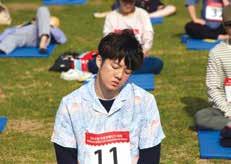
Among those taking part was speed skater Kwak Yoon-gy, a double Olympic silver medalist.
“I tried out for the Olympics five times and have never taken a proper rest while training for 30 years,” said the 34-yearold short-track specialist, who took third place. “I heard this place is where I can clear my mind and rest at least during this time, so I came here thinking, ‘Wow, this is what I needed so much.’”
More than 4,000 people applied to participate in the mind-numbing contest. One hundred seventeen people were selected – with one child in second grade participating.
The contest has been taking place annually over the past ten years. It was founded by a visual artist who calls herself Woopsyang, after she suffered from burnout.
“I wondered why I was so anxious about doing nothing,” she recalled, adding that that’s when she realized her anxiety came from comparing herself to other people leading busy lives.
“In fact, those people could also be wanting to space out and do nothing like me,” Woopsyang said. “So, I created a competition thinking that it would be nice to pause all together at the same place at the same time.”
She added, “This contest tells you that spacing out is no longer a waste of time but a time that you really need.”
Kwon So-a, a freelance announcer, won this year’s contest.
She’s a real good for nothing.

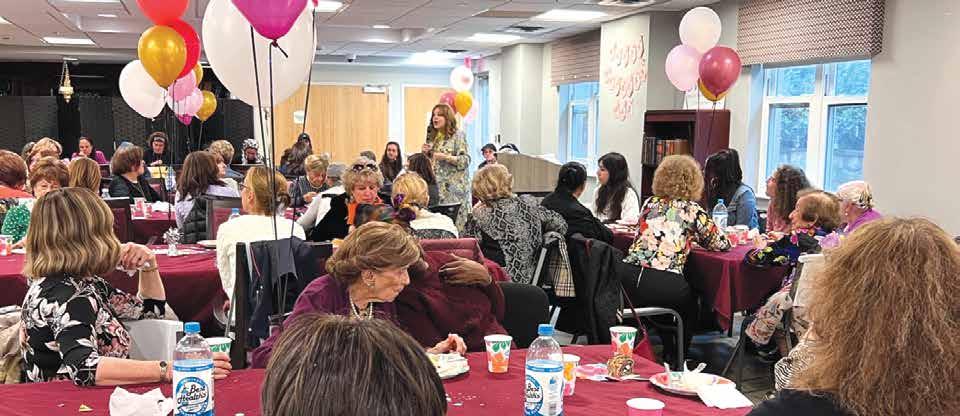
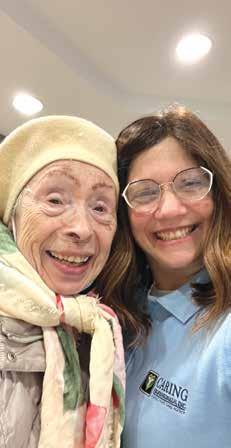
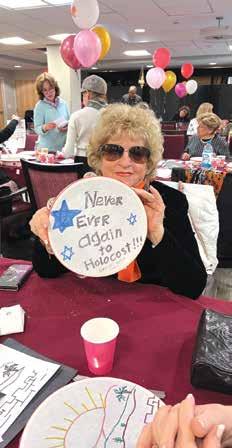
More than sixty women enjoyed a belated Mother’s Day outing last week, courtesy of Caring Professionals Home Care, Jewish Women of Wisdom, and the Five Towns Premier Rehab and Nursing Center of Woodmere. From a warm welcome and photo session to a sumptuous lunch, to a Tzipisa Leyushua tambourine workshop and singalong, a joyous time with family and friends was relished by all participants.
Joseph Benden, Administrator, and Cathy Byrne, Gerontologist, of the Premier Rehab opened the program as hosts of the event held in the shul of the center.
Adina Katz of Caring Professionals is a familiar name to the Holocaust survivors who participated; at the event, they finally experienced her warm persona live instead of just a voice of support and information on the telephone.
The tone of the afternoon was set by Rebbetzin Faigie Horowitz’s welcoming remarks which addressed both older and younger generations. She connected the
marital laws of Parshas Emor with the adjacent injunction against cursing parents. According to Rabbi Samson Raphael Hirsch, respect for parents is an additional resource to our moral code; one who understands the role of parents and accords them honor has an advantage in adhering to ethics.
Our family matriarchs were enjoined to pass on their family narratives as a means for increasing resilience and self confidence in the younger generation, as per the research of Dr. Marshall Duke at Emory University. It is not just about the stories; the ability to rebound and move on is modeled on the oscillating family narratives shared by family members. Miriam Liebermann of JWOW! led the group in decorating tambourines with which to greet Moshiach just as Miriam Hanevia did at our first redemption from Egypt. Singing Hebrew songs of hope for redemption rounded out the program for the grateful participants who came from Brooklyn and the Five Towns with their daughters and friends.



Sunday, May 19, was a glorious day in the history of Yeshiva of South Shore-Yeshiva Toras Chaim Bais Binyamin and a momentous occasion for the Five Towns community at large. Nearly 60 years after the dedication of the original building, in May of 1966 on 1170 William Street, the yeshiva celebrated the Chanukas HaBayis of their brand new Friedman Family Building that will house the elementary school division of the yeshiva.
The beautiful building, which stands on the footprint of the original smaller structure, is a two-story magnificent building with 16 classrooms, five resource and enrichment classrooms, a laboratory, art room, library and more amenities to enhance the educational experience of the elementary YOSS talmidim of grades 1-5.
The Chanukas HaBayis was graced


by scores of rabbanim, political leaders and hundreds of parents and supporters who came to celebrate the growth and accomplishments of the impressive development of the yeshiva, underscore the yeshiva’s connection with almost every shul and chessed institution in the Five Towns and Rockaways.
Rabbi Mordechai Kamenetzky, Rosh Yeshiva, was emotional, stating that almost seven years to the day, the community gathered to pay the kavod acharon to his father, Rav Binyamin Kamenetzky, zt”l, they now gather to celebrate a brand new building as a continuity of his legacy.
“The building,” he explained, “is more than a learning center for the children’s future, it’s a center to explore their past.”
The building includes much history that entails a wall of tribute to Rav Binyamin that contains moving images and photos of the world from which
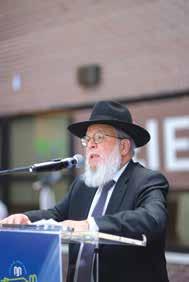

he came and of so many community members who stood by his side from the 1950s until his passing in 2017.
The guest speaker, Rabbi Shaya Kohn, Rosh Yeshiva of Yeshivas Zichron Aryeh, brought his extensive experience and innovative approaches to education to the forefront, enriching the event with his insights into chinuch, and melding them with an emphasis on the life of Rav Binyomin Kamenetzky.
A powerful speech by Congressman Anthony D’Esposito, decrying the rise of anti-Semitism and an affirmation of his unwavering support of Israel, stirred the audience. The congressman was joined with other leaders, among them, Nassau County Executive Bruce Blakeman, Supervisor Don Clavin, Ari Brown and many others, highlights the community’s strong support for the Yeshiva.
The South Shore PTA truly enhanced the celebration with a delectable dessert
brunch, creating a warm and inviting atmosphere.
The beautiful morning ended off with a special sefirah-compatible acapella performance by renowned singer, Shulem Lemmer and the Zemiros choir, singing Mizmor Shir and other appropriate niggunim. The children attending the event after school were treated to creative gifts and tokens of remembrance, as well as fun treats like popcorn, fresh ice cream, slush, and snow cones. The festive atmosphere ensured that everyone had a delightful time and left with a tremendously uplifting feeling that the legacy of Rav Binyamin’s love for Torah and chessed will not only reverberate within the walls of the building, but in the spirit of their children as well.


Yom Ha’Atzmaut was especially important and exciting this year, and you could feel that all throughout HALB. In Lev Chana, the classrooms were transformed into different cities in Israel and the children took their pass-

ports, boarded their El Al flight, and landed in Ben Gurion Airport. They went through customs and then got to visit all the different cities around the school building with special activities in each one. They ended the day with singing and


dancing outside with Gary Wallin!
In the evening, HALB had their Yom Ha’Atzmaut Eitan Katz concert and BBQ in the yard, and hundreds of parents, students and staff joined for the celebration. In addition to the dancing, there were chessed tables set up with Tehillim and special projects for Israel. It was truly an incredible day!
When a delegation from the Yeshiva University High School for Girls (Central) visited YU’s Innovation Challenge in March, the group’s aim was to merely observe the pitch night event. So how did this group – freshmen Camryn Brunner, Sarah Galanti, Maya Goykadosh, Maayan Kotkin, Emily Segall, and Hudis Schnur – go from observers to first-place winners, competing against both college and graduate-level entrants at YU’s Innovation Challenge on Wednesday, May 8? It’s a story for the books.
In March, the students were invited to attend a pitch night event at the Innovation Lab, which was established by YU to shape the next generation of entrepreneurial leaders with educational programming infused with Jewish values. Originally, the group, accompanied by Central’s Head of School, Ms. Bracha Rutner, and Director of Technology, Mrs. Marci Karoll, intended to watch and listen as event participants brainstormed product ideas with professors and entrepreneurs. However, Central’s students were inspired – and had a strong pre-existing idea they had previously developed for Northwell Health’s Medical Marvels Challenge in the fall.
“For our Medical Marvels competition, we were challenged to put together a hypothetical prototype that would help a student with a disability to attend a mainstream school,” explained Emily Segall. Their idea, the Blue Cane, could be used to help students with visual impairments navigate school campuses. The Blue Cane enables users to request
locations using a device with braille-labeled buttons, then move through buildings and navigate crowds independently with the help of a GPS system, Bluetooth, and RFID chips. The positive reception the students received encouraged them to move forward and develop their own pitch.
Supporting the group in their work were the Science Department Chair and Science Institute Coordinator, Mrs. Ruth Fried, as well as Mrs. Karoll. “This was project-based learning at its best,” Mrs. Fried said. “These students had to research blindness, technology, grants, potential consumers, and the cost of manufacturing such a product.”
Also lending support and perspective to the group was disability advocate Rabbi Michael Levy, whose advice was formative in Blue Cane development.
“We asked Rabbi Levy about his experience as a student who could not see,” Emily said. “We took some key points he spoke about, which were mostly related to his struggles as a student with visual impairment, that we wanted to address.”
Sarah Galanti agreed that the contribution such a project could make to the learning experience of users would be significant. “While developing the Blue Cane idea, we learned so much about blindness and different laws in effect for disabilities, as well as some of the business aspects of the project. Overall, I feel that this project can make a big impact on the education of students who are blind.”
An additional mentor for the group: Associate Dean Michael Strauss of YU’s

Sy Syms School of Business, who helped the students craft their pitch to the strict parameters granted by the Challenge – a presentation in seven minutes, followed by a five-minute judge’s question period.
“From the minute that I met these ninth graders and heard a summary of the idea, I knew they were going to win the competition,” Dean Strauss said. “Having worked with Central students in the past, I was not surprised. These students are very bright, motivated, and dedicated to this effort, and it showed at the presentation. I spoke to each judge, and one by one, they told me how impressed they were and how pleasantly surprised they were when they compared the ninth graders’ presentation to others given by much older students.”
Mrs. Fried agreed: “Their presentation was sharp, fast-paced, and effective. And they won.”
On Wednesday, May 15, 2024, the
students shared their project in a symposium held at the YUHSG campus. Also featured at the symposium was Rabbi Levy, who addressed the community with his lecture, “My Journey Through Life as a Jew with a Disability.” The event marked the conclusion of a formative experience for these six students. “I hadn’t participated in a project like this before,” Sarah said, “so it was very new and exciting for me.” Emily agreed: “Collaborating with the group was an incredible experience. We were all passionate about what we were doing, and we each contributed our own thoughts and ideas to the group project.”
The group’s next step: to develop an actual prototype in order to make the Blue Cane a reality. “I loved working with my team to reach accomplishments,” added Maya Goykadosh, “and hope we will have more in the future.”



Thank you to everyone who joined us for the Young Israel of Woodmere 63rd Annual Dinner on May 19, 2024. This year, our theme was
Community, Unity and Support for Israel, and it was heartwarming to see such a strong turnout. We paid special tribute to the Nassau County Police Department
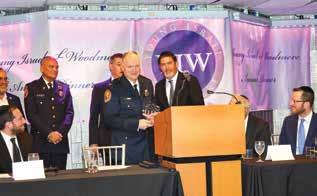
by Ira Thomas

and the 4th Precinct for their dedicated efforts in keeping our community safe. We were also honored to have Miriam Peretz, the mother of IDF soldiers and a
As the State Assemblywoman representing South Queens, I am proud to announce a historic victory for yeshiva education in New York State. Through tireless advocacy and strategic partnerships with TeachNYS and Agudath Israel, I have secured record-breaking funding for yeshivas in the recent 2024 State budget.
Since my election in 2017, I have made it my mission to be the strongest advocate for yeshivas in Albany. This commitment stems not only from my role as a representative, but also as the only Jewish elected representative in South Queens.
The numbers speak for themselves: a staggering $75.5 million dedicated to STEM (Science, Technology, Engineering and Mathematics) education, a doubling of funding since my first term. But it’s not just about the numbers; it’s about the
tangible impact this funding will have on the lives and futures of yeshiva students across the state.
I am particularly proud of the establishment of a reimbursement fund for arts and music education at yeshivas. As a firm believer in the importance of a well-rounded education, I fought hard to ensure that yeshiva students have access to the arts, fostering creativity and expression.
However, perhaps the most significant achievement is the $105 million allocated for yeshiva security funding. In partnership with the Nonpublic School Safety Equipment Grant and SCAHC, we are investing in the safety and security of our schools, creating an environment where students can learn and thrive without fear.
For me, safety and education are not just priorities; they are fundamental rights that every child deserves. By securing this funding, I am ensuring that yeshiva students have access to a cut-
ting-edge education that prepares them for success in an ever-changing world.
Rabbi Yeruchim Silber from Agudath Israel of America said, “This is a budget we can be proud of. Increased security funding and mandated service will benefit the students in every yeshiva and non-public school across the state. We are incredibly grateful to our champion, Assemblywoman Pheffer Amato, for securing the needs of the non-public school community.”
“These are transformative dollars directly impacting our schools,” said Sydney Altfield, Executive Director, Teach NYS, a division of Teach Coalition. “The State of New York recognizes the importance of investing in the future of tomorrow no matter the choice of school they attend, and we are so grateful to our partner, Assemblywoman Pheffer Amato, for fighting alongside us to make this a reality.”
The praise is humbling, but this victory belongs to all of us – especially our
noted Israel Prize winner, as our keynote speaker. Her words deeply resonated with us all. Your presence and support made this event truly memorable.

children! It is a testament to what we can achieve when we come together with a common purpose and a shared vision for the future.
As I look ahead, I am more determined than ever to continue fighting for yeshiva education and the future of our community. Together, we can build a brighter, more prosperous future for all New Yorkers, regardless of their school choice.

On Tuesday night, May 14, an overflow crowd of women from the community and talmidos from MSHS gathered for the Women’s League Annual Sefira Shiur. This was our third such event spearheaded by Mrs. Nataly Magendzo who initiated this important event and has worked tirelessly to ensure its success.
The shiur was dedicated in memory of Mrs. Magendzo’s father, Boruch Binyomin ben Moshe, a”h, as well as in memory of Chaim Avraham ben Boruch Yisroel Jungreis, a”h. We also dedicated the shiur in memory of Rabbi Michael Haber, Harav Menachem ben Chana, a”h, father of our guest speaker, Rabbi Joey Haber.
After reciting Tehillim for the cholim and the matzav in Eretz Yisroel, Rabbi Haber, who had just finished sitting shiva on Tuesday morning, apologized if the shiur was not up to par, since he himself was wondering why he agreed to still come
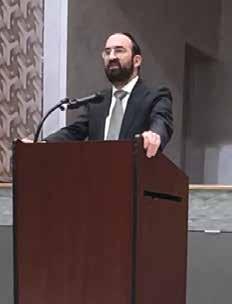
to speak in the evening. No apologies were necessary. Rabbi Haber spoke from the heart about a timely of kavod habriyos during sefirah time. He illustrated the concept of recognizing every person by telling stories about this father, who excelled in this middah. He also included a tribute written by Mrs. Magendzo about her father, and it was amazing that both these men shared similar traits of honoring people and not showing favoritism to those who may be wealthy or powerful.
This important lesson especially resonated with the TAG parents whose daughters in the Elementary and Junior High were participating in the Raise the Bar program which is teaching the talmidos to be inclusive and to treat each other with respect.
May this shiur be an aliyas neshama for, Mr. Lvovsky, Rabbi Haber and Chaim Avraham Jungreis, a”h.

 By Batya Black and Talia Brenner
By Batya Black and Talia Brenner
Every year, our school celebrates Yom Ha’Atzmaut with a celebratory day that includes dancing, laughing, and having fun. However, this year we had to take a different approach. While enjoying a day filled with happiness, joy, and appreciation, we made sure to still remember and mourn those who cannot celebrate with us this year, our brothers and sisters held captive in Gaza. The hostages cannot dance with us, so we made sure to do it on their behalf. In order to not forget our reality, our school created a day that was filled with happiness, but also included stories and commemorations that helped us not lose sight of the realities in our homeland.
In our front yard, we created a Nova Memorial that students who visited Israel had the privilege to see in person. We heard stories from brave survivors of the Nova festival, and of course, in true Shulamith fashion, we danced because even though our nation is hurting, we are forever grateful for all that has happened to get us where we are, and we are hopeful for a bright and fulfilling future.
The focus of the day was to remember that with unity we will dance again. We heard from the Assaraf brothers who were a representation of what the Jewish people are. We go through hardships, however, keep a positive outlook. Throughout the day, we did just this, we danced, we sang, and we remembered that our biggest strength is our unity and
positivity as a nation. Shulamith created an environment where instead of focusing on our loss, we used the loss to fuel our motivation to keep fighting and keep dancing.
After a morning filled with unity, we went outside to enjoy the beautiful party that Shulamith created for us. We had silent DJ, amusement rides, and bouncy houses that encouraged us to laugh and have fun. However, one of the most meaningful events of the day was when we switched from silent DJ to a group kumzitz. When everyone was listening to music in their own ears, we saw that everyone was separated. Each girl danced with different friends and sang their own songs that they were hearing through their personal headphones. However, when we switched to the kumzitz, everyone was together, signing the same songs, and dancing with our arms wrapped around one another.
Throughout the day, we experienced numerous emotions that led us to see that the biggest strength of the Jewish People is our unity and togetherness. We are able to go from sadness to happiness without diminishing either feeling. Shulamith was able to create an experience that really showed the essence of our nation. They took us through the hard, and instilled hope, and then brought us to an environment of joy. We will never forget the impact this day had on us, and we will never stop dancing.
The 5 Towns Soccer League just finished an amazing season! The girls in each of our three divisions are learning the fundamentals of the game, learning to work together as a team and having so much fun while getting a great workout. The boys in grades Pre-1A to second grade had a great time while learning the game. Our energetic high school and parent coaches and refs are doing a great job teaching the skills and the rules of the game while still enabling the participants to have a fun experience every week. Over 120 girls and 40 boys got a great workout, and plans are already underway for next season. Can’t wait!

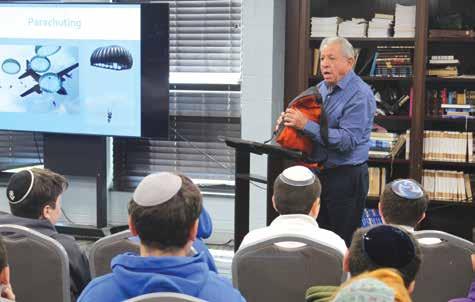
For Yom Ha’atzmaut this year, HANC held two different programs.
In the morning, our very own Benci spoke to the students about his experiences as a Chayal in Tzahal. He spoke about his experiences in an elite unit. Benci took out a satchel, which contained in it the things that he always had with him, no matter what. These were his tallit, tefillin, siddur, and a special Mi Shebairach prayer that he said before he went on a mission. He also told the students about how careful each of the members of his unit was around these
items and how they would say the special tefillah even though they were not necessarily religious. It was very moving.
In the afternoon, we went to 609 and participated in the Mordechai Shapiro concert. Before the concert, we announced a mazal tov and Tzeitchem L’Shalom to the families making aliyah. As usual, Mordechai was awesome, and everyone enjoyed singing and dancing with incredible ruach. When he sang the Mi Shebeirach L’Chayalai Tzahal, it was especially moving. A big thank you to 609 for hosting!

On Sunday, May 19, the Yeshiva League held its second annual Model United Nations, and for the second year, MTA students took home many awards. Led by their Captain, Amir Gross ’25 and rookie Matis Kahn ’27, who earned the gavel for Best Delegate in their respective committees, three other delegates were also awarded as honorable mention (second place) in their committees: Akiva Cohn ’26, Meir Kaller ’25, and Binyamin Sheinfeld ’25.
The one-day event, held this year at Central (YUHSG), is designed to help prepare students for YU’s National Model UN (YUNMUN), held annually over three days in February. As opposed to YUNMUN, which is run by YU students, here the committee chairs and Secretariat were all graduating seniors who had been delegates to multiple Model UNs and knew the rules well. Because the student participants in Model UN tend to be top students in their respective schools who often enroll in AP courses,
This past Shabbos Parshas Emor, a very special yet unique kiddush took place. In a shul in the heart of Far Rockaway, five families celebrated their phone upgrade. Not your typical phone upgrade to a more advanced sophisticated iPhone, but a spiritual phone upgrade from a smartphone to a kosher flip phone!
Rabbi G started off the kiddush, putting things into the proper perspective. “We all know the goal in life as a Yid is to be connected. Connected to Hashem and His Torah. Connected to the meaningful relationships we have in our lives. The yetzer hara’s main strategy is to distract us from the important things in our life. Our job and mission is to do what we can to try to stay focused and connected. These Yidden saw a very real challenge and made a decision. A very difficult one – but they did it for the sake of what’s right. That’s something special and certainly deserves making a kiddush.”
What prompted this decision?
At the kiddush, all five men spoke briefly and expressed what propelled each one of them to make this bold choice. They wish to remain anonymous for the sake of preserving the sincerity of the decision.
Dovid* said: “When I saw that my
the event is scheduled for the first Sunday after APs.
The Model UN consisted of two committee sessions, one sandwiched between Shacharis and lunch and a second between lunch and Mincha, each for around two hours. Delegates, representing a variety of countries, were expected to have sufficiently studied their country, committee, and issues to properly act as a delegate at the actual United Nations would. The students who were awarded were the ones whose preparation and performance came closest to this ideal.
Thanks go to HAFTR’s Alex Libkind and Central’s Chevi Friedman, who organized and hosted the event, and to the committee chairs, who demonstrated maturity beyond their years and superbly handled their committees.
MTA’s team, composed entirely of underclassmen, sees this event as an important step forward in asserting themselves on the bigger stage next year, and is enthusiastic to build on this success as
it works hard to prepare for YUNMUN ’25. Like anything else, Model UN practice makes perfect, and the results from
this competition can only be heartening. The team looks forward to earning more Best Delegate awards next year.
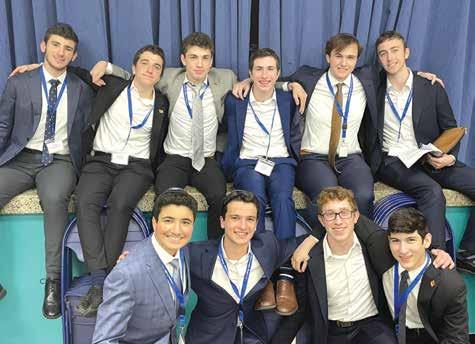
2-year-old knows how to use my iPhone better than me, I knew this can’t be right! I knew it won’t be easy but it’s certainly the right thing to do!”
Meir* said: “I always knew in the back of my mind that this isn’t right. It’s simply too distracting and taking me away from the important things in my life. But the straw that broke the camel’s back was when I was putting my son to sleep. I was looking at my phone and he asked me: ‘Why are you always on your phone?’
That was it! I knew that I had to change. After I got my kosher flip phone, my son asked me about it, and I told him: ‘I got a new phone so that we can spend more time together!’”
Levi* said: “I never really considered myself addicted, but the fact is, I was averaging 3 hour screen time on my iPhone. I couldn’t stop thinking about all that wasted time and what I could be doing instead. I could be so much more productive. Learning, davening, spending more time with my wife and kids. Now B”H after the switch, I’m averaging an hour screen time. It’s still a lot, but I gained 2 hours in my day!”
Yossi* said: “My wife and I were fed up with the fact that any question that came up at home, my kids said: ‘Ask Siri!’ We simply had enough! This is not the
way it’s supposed to be!”
Ari* said: “The one word that I can use to describe it is freedom. Absolute freedom. We tend to think that if we don’t have our smartphone, our whole world will fall apart! But guess what? I did it and nothing happened! I didn’t miss out on anything of importance! My children are so happy that I made the change!”
These five Yidden went on to explain, each in his own words, how although the convenience of the smartphone is a true fact, the freedom of being connected to what’s real is so much more important.
The beauty and Kiddush Hashem of the kiddush is the fact that these five men are all working, busy in the business and working world. There is a misconception out there. People think that kosher flip phones are for kollel yungeleit and rebbeim, but for someone who’s out there in the business world, it’s nice in theory but it’s not doable. These five special individuals are spreading the message that this is simply not true. These five men are role models for everyone to realize that anyone can do it.
The atmosphere in the room was extremely sincere and uplifting. The other members of the shul looked on with respect and admiration. One of the gabbaim, a successful lawyer, in a moment
of inspiration, stood up and proclaimed: “I’m in!” He elaborated so beautifully, “I want to try! I want to be someone in this world who can honestly say that I tried to do the right thing. I tried to make Hashem happy.” Following this, a few others expressed their interest in making the switch, as well.
There are a lot of technical questions that come up when changing one’s phone – especially when it comes to business and work-related needs. However, these men worked through those challenges. They went through the issues and worked it out in a way that works optimally for each one of them. They’re happy to speak to anyone who’s thinking about making the switch and can offer tips and advice on making it an easier transition.
Let’s hope this can become the new movement in Klal Yisroel, proclaiming once and for all, “Enough is enough!” In this merit, may Hashem say to this long, dark galus… “Enough is enough!”
For technical questions and clarification, please feel free to call 562-6666398 or 718-744-4369. For kosher phone questions, please call Tzvi Lieberman at 917-376-7211. For chizuk and inspiration in making this decision, please call Rabbi G at 917-285-3262.

In honor of Israel’s 76th Yom Ha’Atzmaut, the children and staff in HANC’s Elementary School in West Hempstead were treated to a virtual tour of Israel. Prepared by the sixth grade girls, under the guidance of Morah Vered Sharoni, Hebrew department chair, the children toured the “Shvil Yisrael” with great excitement. After researching different locations of interest throughout Israel, the sixth graders prepared tri-folds displaying their work by listing informative facts, photographs and sharing what they learned with their “visitors.” As the children entered the auditorium, they visited “Ben Gurion Airport” and were greeted by flight attendants who provided them with passports and chocolate coins symbolizing the excitement of trav-
el. They then visited Tel Aviv, where they made delicious fresh squeezed orange juice, highlighting one of Israel’s most famous export items.
In the Golan, the children tasted grape juice, representing the magnificent vineyards in this region, and at the Kinneret, they made fish-shaped scratch art and tasted gummy fish. Moving on to Mt. Hermon, they were greeted by four hosts wearing ski outfits, who taught them about this snow-covered mountain. They then recited a bracha in memory of HANC’s Associate Principal, Barbara Deutsch’s mother, Lea Hoffert, Lea bat Tuvia, and enjoyed an icy treat. Next, it was on to Yerushalayim, where they wrote their own note to Hashem and placed it on the floor-to-ceiling Ko -
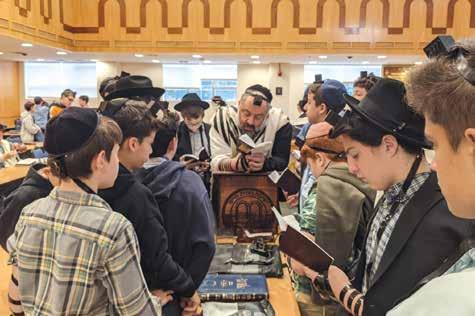

tel. What trip to Yerushalayim would be complete without a visit to the shuk? Delectable treats awaited, and the children filled their treat bags with freshly baked rugelach, burekas and even pickles! Heading south to Eilat, the children decorated a cookie with blue icing for water, crushed graham crackers for sand, and even a paper umbrella on top, evoking the sunny vibes of Eilat’s beaches.
The fun continued outdoors in Hevron, where the next stop was a visit to the Pita Bakery. The Ivrit staff helped the children flatten balls of homemade dough into pitot, and watched as the pitot baked. Once the pitot were finished, the children poured olive oil and zaatar on top of their hot pitot and truly enjoyed
tasting this very Israeli treat that they proudly made themselves.
At the conclusion of this action-packed day, the entire school, along with the students and staff from the Middle School, joined their parents and grandparents in the backyard for the culminating event. Following a meaningful Yom Ha’Atzmaut ceremony, the singing of Hatikvah, a salute to the three families who will be making aliyah this summer, and a performance by the baton twirling Color Guard, the HANC family was treated to a riveting performance by music superstar and HANC’s former music teacher, Mordechai Shapiro. Watching the crowd singing together and proudly waving Israeli flags was truly inspirational!


As has become traditional at MAY over the past few years, this past Monday, the Student Government sponsored and organized a beautiful end-of-year trip for the bochurim of the Mesivta. This year, the trip included Top Golf and ice skating.
After a full morning seder, talmidim
enjoyed a pizza lunch, also sponsored by the G.O., before boarding the coach buses out to Top Golf in Holtsville followed by exclusive ice skating at The Rinx in Hauppauge.
“The trip is quite befitting for the end of the z’man,” commented Menahel, Rabbi Yossi Bennett. “Of course, the boys

have a great time, but the organizing and scheduling is singlehandedly executed by our Student Government, which teaches them fantastic life skills. This year, it also served as our Lag b’Omer trip, as we’ll be on our annual Shabbaton at Camp Romimu this Shabbos through Lag b’Omer on Sunday.”
Over the course of the year, HAFTR Middle School eighth grade students have been busy working on what has now been named the Power of Story Capstone Project. Under the leadership of Principal Dr. Joshua Gold, Associate Principal, Dr. Yali Werzberger, and faculty advisors Ms. Rebecca Zweibon and Mrs.Jennifer Boccia, students embarked on a year-long endeavor that they called “life-changing.”
Dr. Joshua Gold explained that the idea for the program came from research conducted at Emory University that identified a correlation between knowing one’s family story and grit and resilience. To that end, all students researched and learned about their unique family history, heritage, and story. Along with eighth grade Social Studies teacher Ms. Zweibon, students learned that family stories do not exist in a vacuum, and the historical context of the times greatly shapes each person’s life and story. In addition to interviewing family members in person and over the phone to learn more about their heritage, students also visited websites, museums, and communities to learn more about the historical background that shaped their ancestor’s lives.
Students then examined the values that are central to their family and the values that they have learned at HAFTR. Lively and thought-provoking conversations about the importance of values then
followed, and students thought about the person they want to be and the life they want to lead, based on the values that are central and meaningful to them. With the guidance of eighth grade ELA teacher, Mrs. Boccia, students then crafted and wrote a speech, using vivid imagery and powerful prose, to tell their family story, share the values they learned at home and at HAFTR, and discuss how their heritage and values will guide them on the path to becoming the person they want to be and the best version of themselves.
Dr. Yali Werzberger then ran a public speaking seminar, teaching all eighth graders the fundamentals of effective public speaking. Students then practiced and perfected their speeches, and all students gave their speeches to their classmates, inspiring each other. Students and faculty were moved and impressed by the students’ public speaking skills, powerful delivery, family stories, and values. It was heartwarming to listen to students speak about what this project meant to them and how it will shape them in the future.
Students, their families, and the HAFTR Middle School faculty, all celebrated together at the Power of Story culminating event, with Safira Sutain and Ian Taub welcoming families, and Valentina Kupferman introducing four students, Yosef Haimoff, Andrew Rinzler,
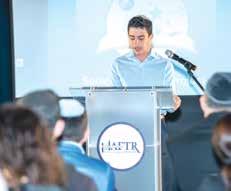
Avi Abikzer, and Lizzy Stern who shared their speeches with the audience. Ethan Grossman then introduced the video that showed clips of each student’s speech. Everyone watched spellbound as students told stories about family members who escaped countries due to persecution and built successful businesses from scratch. The video also highlighted the many values, such as integrity, compassion, and vision that are important for students, and the goals they have for themselves now, and in the future.
Zachary Sternberg then welcomed families to view the photo gallery, where each student submitted a photo of the family member they studied, along with text highlighting the meaningful impact this person had on the family and the student’s values.
Reflecting on this project, Dr. Yali Wezberger remarked, “It was fascinating to listen to how so many family stories
Accompanied by their rebbeim and hanhalla, the trip was an enjoyable and wholesome excursion before the bochurim begin to buckle down and prepare for final exams starting next week.

involved people with a certain goal and life path, and by no fault of their own, due to life circumstances, those plans had to change. Our students spoke with pride about how their ancestors did not respond to these circumstances with resignation and despair. Instead, they persevered, and with grit and resilience, built a new life and a new story. This program is meaningful every year, but this year, following October 7, the program became all the more meaningful and significant. When learning about their family stories, students learned about the eternal nature of the Jewish people, giving us hope and strength to continue building and creating. ”
We thank Ms. Rebecca Zweibon and Mrs. Jennifer Boccia for their commitment to this program, and Ms. Alyson Jacobs and Mrs. Rinat Balsam for their work on the video.

This past Sunday morning, May 19, the beautiful home of Batsheva and Shmuly Neuman was filled with friends and supporters of Madraigos for the Annual Five Towns Breakfast. With the theme “Whispers of Dignity, Roars of Impact,” the community united to support the youth, young adults, and families served by Madraigos through innovative prevention programs and critical intervention and support services.
Rabbi Dov Silver, Founder and Executive V.P. of Madraigos, expressed heartfelt gratitude to the Neumans for their gracious hospitality and pivotal role in making this year’s event enjoyable, meaningful, and successful. Rabbi Silver remarked, “The existence and growth of Madraigos is due to sincere, committed friends like the Neumans. I am touched by their genuine sensitivity to the special needs of our teens and young adults, and I am deeply humbled by their warmth and dedication.”
He also explained the event theme, “Whispers of Dignity, Roars of Impact,” and how it reflects Madraigos’ impactful
strategy in addressing mental health and social challenges. The theme “Whispers of Dignity, Roars of Impact” was chosen to capture Madraigos’ dedication to treating every individual with respect and dignity while showcasing the significant and far-reaching effects of these efforts. Although the work may be carried out privately, gently, and with great sensitivity, the outcomes are powerful and transformative, leading to positive changes in the lives of individuals, their families, and the broader community.
Shmuly Neuman commented, “Madraigos is dedicated to providing vital support to families in our community and beyond who are facing difficult challenges. We are proud to be able to help such a worthy organization raise much-needed funds so they can continue to assist those in need.”
Corporate sponsors from various local industries demonstrated their unwavering commitment to Madraigos, significantly contributing to the event’s success. Leading sponsors included Cross River, Miller Realty, Visionville, SHMA Camps, Town Appliance, And Beyond,

and Binyamin Korn Photography. These sponsors represent a wide range of sectors, showcasing the broad community support for Madraigos’ mission. Their generous contributions not only provided essential financial support, but also highlighted the shared community values and collective effort in addressing the challenges faced by families and youth.
Madraigos extends heartfelt thanks to all the sponsors for their invaluable support and partnership.
Thanks to the efforts of Batsheva and Shmuly Neuman and the dedicated event committee, Madraigos was introduced to many new friends from the Five Towns and surrounding communities. Attendees learned about the extensive services Madraigos offers to families locally and
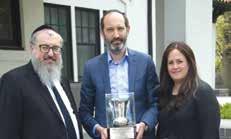
beyond.
“We are sincerely grateful to the Neuman family for their invaluable contribution to making this year’s Breakfast a great success. Their belief in our mission and active sharing of their passion with others has been instrumental. We hope to build upon these relationships as we grow even stronger, effectively serving the needs of families in our community,” said Mrs. Sharon Gross, Executive Director of Madraigos.
For more information about Madraigos, please visit www.madraigos.org or call the office at 516-371-3250. The community can still participate in the Annual Breakfast by visiting www.madraigos. org/breakfast.
“After the attack on October 7, there was a lot of anxiety around school security,” says Rabbi Baruch Rothman, Darchei Torah’s director of institutional advancement.
“Parents worried about sending their children to school. We took some very visible and concrete steps to increase our security. This alleviated the anxiety, but it came at a high financial cost.”
Reflecting on how yeshivas and Jewish day schools in New York have since ramped up their security efforts, Rothman says Darchei has taken a proactive approach to continually evolve its security measures. “The unfortunate truth is that you can never have enough security,” he says.
Darchei and other yeshivas and Jewish day schools across New York are taking a proactive approach to security, constantly reevaluating their protective measures and investing in new ones over time. “Where schools like Darchei have struggled is balancing the need for secu-
rity with the budget, knowing that there’s never enough,” Rothman says.
The issue of security in yeshivas and Jewish day schools is affecting our communities like never before. Since October 7, yeshivas and Jewish day schools in New York and other parts of the country have increased their security spending by 47%, according to a recent study by Teach Coalition’s Office of Jewish Education Policy Research (OJEPR).
Community advocates, alongside Teach NYS, are working tirelessly to resolve issues surrounding security for Jewish institutions, working with state and federal governments to expand security grant funding for yeshivas and other Jewish institutions.
These efforts led to historic results when New York legislators responded to the Jewish community’s call for action with the passage of the FY25 budget in April, increasing the NPSE program from $45 million to $70 million. In addition, the Securing Communities Against
Hate Crimes (SCAHC) grant saw a $10 million increase from $25 million to $35 million.
The fact that the New York State budget doubled its security allocation for nonpublic schools is a massive win for the Jewish community, enabling Jewish schools like Darchei to offset rising expenditures to make safety a number one priority for their students.
“This funding has been life-changing for yeshivas, Jewish day schools, for everybody,” Rothman says. “It is allowing us to improve our security infrastructure, hire more security personnel and do a host of other things, granting our school the ability to make timely, critical improvements to ensure the safety of our students and staff.” Rothman is deeply appreciative of Teach NYS’s tireless advocacy efforts, and of NY legislators for prioritizing security in yeshivas and Jewish day schools.
One way that Teach NYS has committed to improving security is through
Project Protect, a $1 billion initiative to advocate for state and federal funding to support security needs for yeshivas, shuls, and other vulnerable Jewish nonprofits in New York and nationwide. These funds will ensure that Jewish institutions have enough money to meet their security needs.
This initiative has the potential to galvanize decision-makers in our state to action. When legislators see the Jewish community united in asking for help in fighting against antisemitism, they respond in kind.
Teach NYS is committed to safeguarding our communities against potential threats. Going forward, Jewish communities must mobilize and continue advocating for even more security funding for yeshivas and Jewish day schools.
Learn more about Project Protect at www.projectprotect.info.

The seventh graders at HALB spent this semester in STEM class thinking about and creating a design aligned with the theme of the CIJE National Design Fab exploration of “Me and We, Individually within community.” The students had to think of a Judaic connection to the theme and then how to make a 3D representation of it.
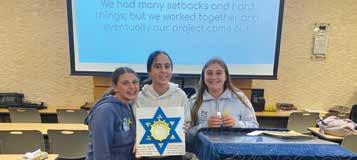

On Wednesday, May 15, the 28 students in MTA’s senior elective course Names, Not Numbers got together with members of their family and Holocaust Survivors for the screening of their film: Names, Not Numbers, A Movie in the Making. It is MTA’s 18th year participating in this program, led by program creator, Tova Fish Rosenberg, and coordinated by Mrs. Rivka Djavaheri. Names, Not Numbers is a Holocaust oral history film documentary project. Students learn firsthand about the Holocaust by making their own professional documentary. Professionals – renowned journalists, documentary filmmakers, and guest speakers – instruct the students in interviewing techniques, videography and editing. The students interview, film and edit the survivors’ testimonies which are then combined into a final documentary.
The event Wednesday night was the culmination of the entire project this
What a week it was at the Five Towns FM Home Loans Flag Football League! This was extra special because it was the start of the playoffs. All the boys were so excited to compete and try to win a championship. In the first grade division, the boys played great and showed how much they improved since the beginning of the season. In the second grade division, the third-seed Eagles beat the second-seed Broncos, and the fourth-seed Patriots pulled off a big upset over the top-seed Vikings. In the third and fourth-grade division, the sixth-seed Falcons beat the third-seed Seahawks, the fifth-seed Panthers beat the fourth-seed Giants, the Raiders beat the Vikings, the seventh Steelers beat the second-seed Packers,
year. MTA was privileged to see the return of five of the six survivors who were interviewed back in December, along with members of their family, to view the final film. Students and survivors were served a catered dinner while listening to speeches from Menahel Rabbi Shimon Schenker, NNN founder Tova Rosenberg, and a number of student representatives about the importance of this project and the impact that Names Not Numbers has had on the life of each student who participated in the project. A lot of emphasis has been placed on the special importance and relevance of Holocaust remembrance in the days following October 7. Through their participation in Names, Not Numbers, these 28 students have become “Witnesses to the Witnesses.” Marlit Wandel, from Germany, was deported to Poland with her family before the war began. She spent the early years of the War in the Radom ghetto and was later transported with her mother and
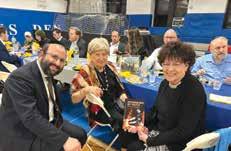
sister through nine camps before they escaped from a Death March. She wrote a book detailing her life’s story, “Nourished By Faith.” Jehuda Lindenblatt, from Budapest, Hungary, survived the war with his family in various safe houses, like the “Glass House” set up by Swiss diplomat Carl Lutz. Tibor Spitz, from Slovakia, survived with his family by hiding in a makeshift underground burrow in the forest for 7 months. Noemi Spitz, from Bratislava, survived as an infant with her family. Malka Shick was born in Italy where her family had fled and was hidden

by righteous gentiles. And Sonja Geismar and her family were on the doomed ship the St. Louis and eventually were allowed into England. Much appreciation goes to these six survivors for sharing their moving stories and coming back to join the culminating event – Marlit Wandel, Jehuda Lindenblatt, Tibor and Noemi Spitz, and Malka Schick. (Survivor Sonja Geismar was away for the graduation of her granddaughter and was unable to attend the final event in person).
and the top-seed Broncos knocked off the eighth-seed Patriots led by Azriel Moskowitz who had two touchdowns. In the fifth and sixth division, the second-seed Jets beat the seventh-seed Dolphins, the eighth-seed Raiders beat the Broncos, the Steelers beat the Packers, and the Panthers beat the Seahawks led by Ezra Lowenstein who had some great flag grabs. In the seventh and eighth grade division, the top-seed Vikings beat the four-seed Giants, and the third-seed Jets beat the second-seed Patriots led by Eli Silver who had four touchdown catches.
The boys were very excited after the game as they all got free ice cream!

Sportsmanship of the Week Awards were given out to: 1st- Reuven Cooper; 2nd- Max Cohen; 3rd and 4th- Yosef Glatt; 5th and 6th- Parker Scharf; and 7th and 8th- Yitzy Fine.
We hope to see everyone on the field for the second round of playoffs and Super Bowl.

The children of Gan Chamesh got ready for Lag B’Omer with simulated bonfires! They sang songs, learned Torah, and enjoyed “roasting” marshmallows over the flickering flames of the bonfires. They also enjoyed making and eating s’mores!
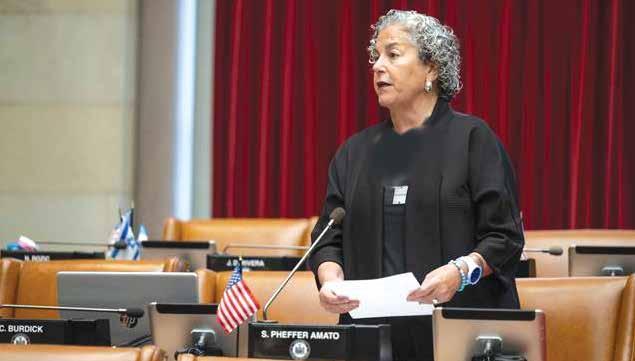
New York State Assemblywoman
Stacey Pheffer Amato passed a State-wide resolution to declare May as Jewish-American Heritage Month in the State of New York. Pheffer Amato, the only Jewish elected official in South Queens, previously succeeded in declaring January 27 as Internation-
al Holocaust Remembrance Day in New York and recently passed the resolution to have New York State recognize Yom Ha’Atzmaut.
“I’m proud of my Jewish heritage and will always stand up for the Jewish community in any way I can,” said Assemblywoman Pheffer Amato.
V’Avrohom
Astrong kol Torah permeates the walls of the Sulitza Bais Medrash most hours of the day when, in addition to the already existing Kollel Boker and Kollel Erev, there is now a thriving afternoon Kollel. Under the leadership of Reb Yitzchok Rubin, Kollel Tiferes Ovadye Vavrohom Beinish started
the new zman with a group of chashuva yungeleit creating a real Torah atmosphere which will hopefully inspire more mishtatfim to take part in limudei Torah filling the few remaining slots. With best wishes for continued hatzlacha and siyata Dishmaya.

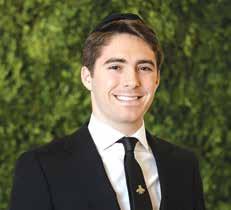


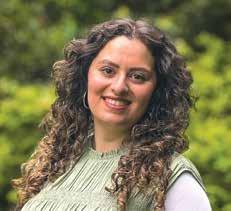
For Ariel Goodstein of Lawrence, attending law school was almost a foregone conclusion. The son of two practicing attorneys who always enjoyed rigorous Talmudic study, he was drawn to the career path from an early age.
Entering Touro’s Lander College of Arts & Sciences in Brooklyn after studying for two years at Yeshivas Toras Chaim in Israel, Goodstein chose accounting as his major. He enjoyed the precise nature of the field and felt his yeshiva training in analyzing texts served him well in a discipline that required close inspection of journal entries and financial statements.
Today, the class valedictorian and summa cum laude graduate of Touro’s Lander College of Arts and Sciences is learning at Yeshiva Shor Yoshuv and headed to Harvard Law School. He may build upon his accounting background to pursue a career in tax law but is keeping his options open as he enters law school.
During his college career, Goodstein interned both at a brokerage firm called Rosewood Realty Group and for Justice Leon Ruchelsman of Kings County Supreme Court. The Supreme Court internship further piqued his interest in pursuing a legal career and cemented his decision to apply to law school.
Besides his academic interests, Good-
Did you know?
stein is an avid sports and exercise enthusiast. A graduate of Mesivta Ateres Yaakov and a member of Kehilas Bais Yehuda Tzvi, Goodstein feels he has gained “so much from my teachers, schools, shuls and the community… “He hopes to pay it forward in the future by using his knowledge in Jewish studies, accounting and law to help community members in need.
“I chose Touro because I wanted to be able to continue learning while pursuing a respected college degree. The flexible schedule at Touro in Brooklyn enabled me to learn two sedorim while attending college and receiving a stellar education and outstanding pre-law advisement.
The prelaw advisor guided me throughout the entire law school application process and helped me achieve my ultimate goal of gaining admission to a top law school.
The positive experiences of my father and older brother, who also graduated Touro, further influenced my decision,” says Goodstein.
“Ariel exemplifies all the qualities of a ben Torah in his character traits and his interactions with others, while also being focused on excelling in his future career. I am confident he will make all of us proud while studying at Harvard Law School, and then when he enters the legal profession,” said Dr. Robert Goldschmidt, Executive Dean at Touro’s Lander College of Arts & Sciences.
The first recipe for s’mores appeared in 1927 in a Girls Scouts handbook.
Goodstein is one of four valedictorians who will serve as student speakers for the 2024 Lander College commencement, to be held June 2 at Lincoln Center in New York City. Stellar students with outstanding academic records and sterling character, they represent Touro’s Lander College of Arts & Sciences, Lander College for Men and Lander College for Women.
Future Medical Professionals Gain Leadership Skills at Touro
Chana Birnbaum of Brooklyn is the valedictorian for the women’s division at Touro’s Lander College of Arts & Sciences. A biology honors major and a recipient of the New York State Scholarship for Academic Excellence, she is employed as a medical assistant in a pediatric clinic and conducting rheumatology research at Brookdale Hospital.
Birnbaum developed her leadership skills as a member of the Touro Flatbush Society of Fellows and by co-founding a committee to support fellow undergrad students pursuing medical careers. She looks forward to an exciting career in the medical field but says her ultimate goal is to harness her empathetic nature to have a positive impact on the lives of her patients and develop close relationships with them.
In her senior year of high school, Bracha Gluck was accepted into Touro’s Medical Honors Pathway program, a program that provides a direct pathway from high school to medical school for qualified students. Gluck chose Touro’s Lander College for Women (LCW), “because it is the perfect blend of academia and spirituality that allows me to be a competitive
student without compromising any of my values,” she said.
The LCW valedictorian currently works as a part-time medical assistant at a Women’s Center in Brooklyn and plans to begin a new position as a part-time research assistant in the cardiothoracic department at New York-Presbyterian Brooklyn Methodist Hospital after graduation. Excited to begin Touro’s New York Medical College, Bracha hasn’t yet decided which field to specialize in, but whatever it is, “I hope to make an impact not only in the world of medicine, but also within the Jewish community by giving back with my new profession.”
Dov Brodkin, 2024 valedictorian of Touro’s Lander College for Men (LCM), is interested in medicine “because it allows me to combine my love of life-long learning and science with helping others.” He’ll get his shot as he begins medical school this summer at the Hackensack Meridian School of Medicine. Brodkin’s preparation for a career in medicine began as he shadowed physicians for the first time when he was a high school student. In order to develop his patient-interaction skills, while at Lander, he volunteered at the Calvary Hospital in Manhattan, which exclusively provides palliative care. He also works as a direct-service professional in a group home for people with developmental disabilities and has become Approved Medication Administration Personnel (AMAP) certified, which enables him to administer medications.
Congratulations to the valedictorians and all the hard-working graduates!

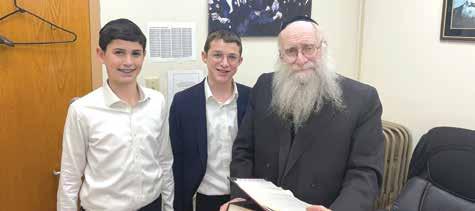
tov to
We are so proud of their accomplishments and look forward to seeing them continue to strive for great things!
During the Sefira period, we focus our efforts on bein adam l’chaveiro as we prepare for Kabbalas HaTorah. On Monday, talmidim of Yeshiva Ateres Eitz Chaim did a tremendous chessed by helping pack boxes for Holocaust survivors at the JCCRP. On Tuesday, talmidim enjoyed a lavish lunch at Traditions Eatery celebrating the completion of Sefer Hilchos Lashon Hara.

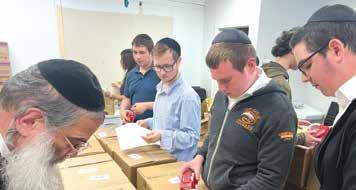

On Yom Ha’Atzmaut, the 1-5 graders at Shulamith enjoyed a real “shuk” experience. The students had the opportunity to smell different spices, taste yummy Israeli foods, play a fun Israeli game, and make their own “Marzipan” rugelach.
Thank you to the parent volunteers who came in and helped run our Shuk. The girls had a great time! Maccabia 2024!
The 6th-8th grade girls had a packed week! On Tuesday and Wednesday, the white team, Artzeinu, and the blue team, Ameinu, faced off in countless activities. From Capture the Degel, to Tzahal training, to Chidon, and an Israeli “mesadah,”
This year, members of the Lawrence-Cedarhurst community, along with neighboring patriots, will gather on Sunday morning, May 26, to participate in the 105-year-old Lawrence-Cedarhurst Fire Department Memorial Day Parade. At 10 am, the live parade begins at Frost Lane and Central Avenue in Lawrence, continuing down Central Avenue. The parade ends in Cedarhurst’s Andrew J. Parise Park where there is a brief and meaningful tribute ceremony.
The annual parade, the production of creative community members and Village staff, led by co-coordinators, Paris (Penina) Popack, Village of Lawrence Deputy Mayor, and JoMarie Capone, of The Village of Cedarhurst, has grown to be one of the community’s favorite events.
Popack stated, “We invite all proud Five Towns residents to our annual tradition of honoring those who have fallen while protecting our freedom. This Memorial Day Parade will be inspiring and entertaining and hope it will be the best ever attended. We are counting on the
ruach and teamwork filled the school.
Thank you to all our teachers who helped make these days such a success for our talmidot. The goal was for the girls to have fun in Macabbia and to be constantly connected and reminded of Eretz Israel.
Mazal tov to the white team, Artzeinu, on their win.
To end off an amazing Yom Ha’Atzmaut, the whole school came together for a special Daglanut performance by the eighth grade and a fun Chagiga. The achdut was beautiful as the girls came together to dance and celebrate Medinat Yisroel!


community to come out to support and cheer our volunteer fire department, military and marchers. It is going to be fabulous!”
Approximately 60-plus interesting entrants will march down the Villages main shopping avenue. Highlights of the parade will include a host of Military veterans, firemen and fire trucks, Air Force JROTC, bag pipes and drums, Lawrence High School Marching Band, exotic cars, motorcycles, Hatzalah, Achiezer, local schools, scouts and organizations and Uncle Sam on stilts. Special guests will be local elected officials, former navy and army veterans, Dr. Yashar and Perie Hirshaut, Sgt. Charles Leonard of the First Troop Philadelphia City Cavalry 28th Division and journalist/radio host, Cindy Grosz. Patriotic American songs will be performed by Mariachi Hidalgo NYC and renowned superstar singer Mendel.
Mendel is a dynamic singer, songwriter, and producer known for his captivating musical compositions and versatile vocal abilities. Mendel’s music seamlessly blends elements of pop, rock, and soul. He has written for and collaborated with notable artists both in the U.S. and internationally.
JoMarie Capone, of Cedarhurst Vil-
lage Hall, expressed, “A great way to say ‘thank you’ to the men and women who have given their lives to defend our nation, our families and freedoms is by attending and applauding the parade. Businesses have been encouraged to salute the parade as it passes by.”
Veteran Syd Mandelbaum, commander of the American Legion Post #339, stated, “As a child of two Holocaust survivors, I have a deep sympathy for all those allies that died at D-Day. It was their sacrifice which is why me and hundreds of thousands of people are living in America today.”
Village of Cedarhurst Mayor and Parade Co-chairman, Benjamin Weinstock, added, “A core value of our heritage is to show respect. Teaching your children and grandchildren about the true meaning of Memorial Day is vital to appreciate our American freedoms. Participating in our parade is an ideal educational opportunity to do so and acknowledge our fallen veterans.”
Alex Edelman, Mayor of the Village of Lawrence and Parade Co-Chairman, said, “Lining the streets in support of our veterans for an hour of your Sunday morning, shows incredible thanks.
Come out and proudly enjoy the parade and show your respect to the Lawrence-Cedarhurst Fire Department, America and the fallen heroes.”
Parade Co-chairman, 2nd Deputy Fire Chief, Joe McHugh, responded,” We can’t take our American freedoms for grant-

ed. On this Memorial Day, we honor and remember the fallen American heroes. It is important to pay tribute to their courage and sacrifice so we can live in peace. Please line Central Avenue, enjoy the parade and show your gratitude.”
PARADE SPONSORS: Joseph and Deputy Mayor Paris Popack; Village of Lawrence and Village of Cedarhurst; Mayor Alex and Susan Edelman; Independent Coach; Walls Bakery; Dunkin Donuts; and Syd Mandelbaum of Rock and Wrap It Up
For more information, please visit http://www.villageoflawrence.org/ and https://cedarhurst.gov/

Yom HaShoah, Yom Ha’Atzmaut, Mother’s Day, Lag Ba’omer –these are some of the important events that punctuate the spring season for the American Jewish community. At The Five Towns Premier Nursing and Rehabilitation Center, these days are acknowledged and celebrated with meaningful programming – for the residents and the community at large.
Over 100 people, young and old, gathered at The Premier on May 6 for Yom HaShoah, the annual commemoration honoring the victims of Nazi genocide, including six million Jews. Residents, family and staff, as well as students from the Hebrew Academy of Long Beach, gathered for an inspirational afternoon of reflection, songs and prayer to remember the lives lost and to honor the resilient and brave survivors.
Keynote speaker Rabbi Blumstein from Yismach Moshe spoke about antisemitism, and seven courageous Holocaust survivors shared their first-hand testimonies. A special candle lighting ceremony followed, with survivors light-
ing in remembrance of their family members who perished during the Holocaust. Premier’s Administrator Joseph Benden emphasized the need to stand up to hatred and bigotry today, as we reflect upon the lessons of the past. The event certainly made an impact, including coverage by NBC News.
The joyous day of Israeli Independence followed, as Yom Ha’Atzmaut was celebrated at The Premier with a cooking demonstration by Hagit Needelman, founder and CEO of Tevony Sauces. She shared some history on the origins of Israeli wheat couscous – said to have been created at the request of David Ben Gurion to make up for a rice shortage in the early days of the Jewish State. She related her personal story, including her love of cooking with her father and now her daughters. Hagit led the group in singing Israeli songs, as residents and their guests were treated to freshly prepared chummus, Israeli salad and couscous.
While residents at The Premier were gifted with flowers and other treats on Mother’s Day, the week following offered a chance for ladies of the extended community to visit and join in celebration of
Irecently played hooky from work. Chanie Wolowik, the indefatigable Shlucha from Chabad of the Five Towns, had posted on her WhatsApp status the week before about a women-only trip to see the late Rebbe’s home, office, archives, and more in Crown Heights. Lunch would be included. A friend and I jumped at the opportunity and signed up.
About 10 women from our greater community made the trip. Chani provided commentary on the background of Chabad and what it was like for her to grow up in Crown Heights. Her father, Rabbi Moshe Kotlarsky, who should have a refuah shleima, oversees Chabad’s 5,000+ shluchim throughout the world. One can only imagine the riveting conversations in the Kotlarsky home. At a minimum, it instilled within Chanie a tremendous love and respect for Chabad and its work. She imparted those feelings and more, including facts about Chabad, to us during our outing. Rebbetzin Wolowik is a proud Shlucha We davened in the Rebbe’s home on President Street which was especially opened for us. Rebbetzin Wolowik ex-

mothers. In collaboration with Caring Professionals, Jewish Women of Wisdom (JWOW!), the “Honor your Ima” program included a lavish lunch, lectures and singing. Gerontologist Cathy Byrne and Administrator Joseph Benden of The Premier welcomed the guests, and words of Torah were given by Miriam Liebermann and Rebbetzin Faigie Horowitz. A creative tambourine workshop followed, after learning how the biblical Miriam and the women of the Torah celebrated the Jewish nation’s freedom with music and song – and how they hope to do so
once again.
Leading up to the next holiday of Lag Ba’omer, The Premier welcomed guest lecturer, Rabbi Zalman Wolowik, rabbi of Chabad of the Five Towns, presenting “Why we burn a log and try to hit a homer on Lag Ba’omer,” and speaking on the meaning of the unique day and other related topics.
Commemorating the past and celebrating the present, while anticipating the future with high hopes, helps keeps all lives enriched at all ages.
plained that this residence was the private abode for the Rebbe and Rebbetzin and was not open to the public. It was the primary locale where Rebbetzin Chaya Mushka davened. Hence, it is deemed a special place for davening, and my fellow travelers and I availed ourselves of this unique occasion.
Like the residence, the Rebbe’s office, located at the world-famous 770 Eastern Parkway edifice, was opened for us. One can only imagine the many world, religious and business leaders who preceded us there, visiting with the Rebbe, seeking and gaining from his wisdom. Here, too, we davened.
Other trip highlights included seeing Lubavitch archives and the original World Lubavitch Communications Center, the kernel of how Chabad commenced building a global communications center before there was Skype, VoIP or even satellite or cable television. The leadership of cTeen, the Chabad organization that provides Jewish teens with environments for socializing, Jewish learning and activism, presented to us. There are more highlights, and each one combined love of fellow Jew with utilizing cutting-edge technology and other means to engage
our brethren in meaningful ways.
I told the group that in late 1991, my mother, a”h, had undergone emergency brain surgery, and the recovery was not easy. I ventured out to Crown Heights with a friend where we waited nearly two hours for the famous dollar bill and bracha from the Rebbe. When it was my turn, the Rebbe handed me a dollar bill.
I stayed in place and told him that I was there to get a bracha for my mother to have a refuah shleima. He asked me her name, which I provided. Then his piercing eyes looked into mine for about three seconds, and he said, “Chana bas Tova just had brain surgery. She will never be quite the same but she will recuperate.” I nearly fell over: How did the Rebbe know she had had brain surgery? The Rebbe then gave me another dollar bill. I ran outside to the pay phone at the corner of Kingston Avenue and Eastern Parkway (remember, this was 1991, pre-cell phone era), and used a credit card to called my mother. She was incredulous that the Lubavitcher Rebbe himself had given her a bracha. The news of that bracha helped set her further on her path to recovery.
Not missing a beat, Rebbetzin Wolow-
ik asked if I could recall the timeframe of that visit. I recall it. She then told me that I could reach out to Chabad’s communications center and go through the footage from that time period. I would most likely be able to find the footage of the Rebbe bestowing that bracha. It would be a privilege to have the footage (and add it to my list of projects to complete). It is most amazing that Lubavitch was already videoing in the 20th century. How did the Rebbe have the foresight to harness technology and use it for kedusha?
This was an unusual “field trip” that all of us appreciated, especially that Rebbetzin Kotlarsky, Chani’s mother, opened her home to us and shared of her life experiences. When we returned to the Five Towns, we all felt “reJewvenated.” It was a break from our typical day, one that filled us with Jewish pride and respect for Chabad’s work. Rebbetzin Wolowik’s running commentary was simultaneously factual and personal. Best of all, Dr. Lightman approved, and now he wants a men’s trip to Crown Heights. He is putting it out there – and Wednesday would be his day of preference.
On Monday evening, May 20, the YCQ Parent-Teachers Organization (PTO) held a beautiful superette honoring beloved longtime faculty members who are leaving at the end of the school year. Morah Sharon Korn, our beloved Preschool Director, as well as long-time Kindergarten teachers, Morah Janet Koenigsberg, and Morah Rhona Lipetz, are retiring at the end of the school year. Mrs. Allison Blass, beloved first grade teacher, will be leaving YCQ for an administrative role in another school.
Throughout her remarkable 33-year tenure, Morah Sharon has profoundly impacted YCQ. Starting as a passionate educator, she fostered a love of learning in every student, and demonstrated an unwavering commitment to their growth. As the Director of the Early Childhood Program, she continued to create a nurturing environment where every child could thrive. Under her leadership, YCQ became one of the first yeshivot certified for NYC’s UPK program and helped introduce a data-driven rotational model in Kindergarten. Morah Sharon has been a cherished member of the community, embodying integrity, empathy, and collaboration, and her presence will be dearly missed.
Morah Janet and Morah Rhona have partnered for decades in the Kindergarten classroom, working side by side to educate students in the most creative and loving ways. From building a tent inside the classroom to teach students about Avraham and the mitzvah of Hachnasat Orchim, to going “fishing” in Eilat on Yom Ha’Atzmaut, the dynamic duo have

always been innovating and making chinuch come alive.
Mrs. Blass, a vibrant, unique, and outstanding first grade teacher, has certainly made her mark on YCQ’s elementary school. Her passion and hands-on energy are always on full display and her classroom is always a must-see. This year, Mrs. Blass also served as the Curriculum Coordinator for K-2 General Studies and provided mentorship and support to other teachers.
All of the honorees expressed their hakarat hatov throughout the evening and were given beautiful gifts, including beautiful Sifrei Tehlilim with a personal message inscribed by Rabbi Landsman on behalf of the administration. Tribute was also paid to the other beloved staff members who will be moving to new locations next year. The YCQ community sincerely thanks Mrs. Linette Boghossian, Mrs. Renee Faibish, Mrs. Sara Hametz, Mrs. Elana Joffe, Morah Jennifer Shakmoroff, Rabbi Yisroel Schonfeld, and Mrs. Aliza Willig for their years of service.
This special event, catered by Riverdale Kosher Market, was well attended, and guests enjoyed the tea party theme and decor, organized and executed by the
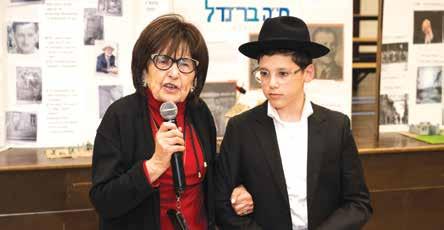

PTO’s Superette Committee. Floral centerpieces in teapots took center stage as they sat on light pink tablecloths with soft pastels.
The PTO also held a raffle with amazing prizes and would like to thank the following sponsors: Joshua Elishayev, Eado and Liel Schwartz, Richie and Ashley Nektalov, Albert and Yelena Yakubov, Customized Moments, Woodibook, and Glamorous Event Boutique.
Special thanks to the committee heads, Penina Nussbaum, Natalie Rakhminov, and Jennifer Jaffe, as well as all the committee members, Aviva Reschke, Daniela Shamayev, Daniella Dyckman,
Khalili, Sara
Aliza Peled, Eliana Langbaum, and Valerie Olsen.
YCQ wishes Morah Sharon, Morah Janet, Morah Rhona mazal tov on their retirement and hatzlacha rabbah to Mrs. Blass and all the other faculty members on the next steps of their careers. We will be forever indebted to Morah Sharon Korn who laid the foundation for our Early Childhood Program. Her legacy and input will be part of YCQ for many years to come.



Ezra Academy went away on the annual retreat to Camp Moshava for an exciting and unforgettable weekend last week. The students participated in many activities keeping busy from the moment they arrived until the moment they reloaded the buses. Scavenger hunt, “Klass Kombat,” Glow in the Dark Capture the Flag, Lion king movie night, boating, football, basketball tournament, and much more. Learning sessions and the divrei Torah over the weekend focused on the theme of “Remember who you are,” as students considered and explored their feelings towards their Jewish identity and values.
Shabbat was a beautiful experience as the Ezra students were joined by the
The sun shone brightly for another amazing Sunday at the 5TLL by FM Home Loans! Plus, this week, all league participants received a free kid’s meal from Chickies.
K/P Baseball & Soccer Highlights
K/P Baseball: Moshe Slone sprinted around the bases while Ryan Polaniecki showcased solid hits for Bright Futures. Ari Kapnick displayed superb defensive skills for Team Laser, and Ari Goldgrab showcased lightning speed for Town Appliance. Azriel Blobstein resembled Francisco Lindor at shortstop for Marciano Pediatric Dentistry.
K/P Soccer: Joseph Feldman stunned with an incredible 8-goal spree for Maidenbaum in their dominant victory. Aron Rieder and Shua Renov nailed the halftime Holy Schnitzel shot, earning a free meal at Holy Schnitzel. Joel Gallis and Asher Brill exhibited relentless hustle for Tikva Fire.
1st/2nd Soccer: Tikva Fire trailed 0-2 in the first half but made a stunning comeback, leveling the score 2-2 in the second half, with Haim Kramer netting both goals, resulting in a thrilling tie. Benjy Blumenthal’s goal tied the game at 1-1, guiding NOJO Promo to triumph.
Minors (1st-3rd) Baseball Highlights
1st Grade: Avraham Weberman delivered an astounding batting performance in Elegant Lawns’ 16-10 victory over Cork & Slice. In a remarkable turn, Weider was up by 4 in the last inning, but Ezra Grabie from Team Exclusive Cabinetry hit a grand slam to tie the game, leading his team to a thrilling 20-19 walk-off victory.
Traveling Chasidim who brought extra ruach, singing, and good vibes to an already electrifying experience. The students and staff said goodbye to Shabbos with a musical Havdalah and spirited dancing and singing that went well past the time Shabbat ended. Motzei Shabbat always culminates with a meaningful kumzitz where seniors express their personal ideas and share the challenges and ultimate success of their journeys.
Although retreat takes place in May, it generally symbolizes the end of the school year and the new opportunities that seniors are working toward. The retreat also solidifies a year-long learning program and helps students prepare for a summer where there is no daily inter-
action with their rebbeim and morot. The beauty of retreat leaves a lasting impression on students, faculty, staff and
administration. The countdown until Retreat 2025 has already begun!
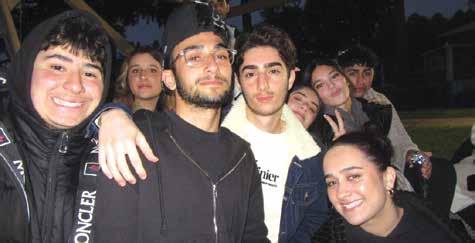
2nd Grade: Wieder clinched a tight win against Insight Optiks 10-8, with MVP Meir Polinsky’s monumental 3-run HR. John’s Auto triumphed over Executive Dry Cleaning 15-10, with action-packed plays all over the field. Jonah Skolnick’s incredible catch at shortstop wasn’t enough as Tikva Fire secured a 14-7 victory over Maidenbaum. Simcha Rostker of Extreme Vent Cleanings hammered a massive home run to put Extreme up 10-7 but Asher Melool, Yaakov Opocynzi, and Akiva Greenspan of NOJO Promo slammed back-to-back-to-back homers to tie it up.
3rd Grade: Elegant Lawns secured a thrilling 17-16 walk-off win against Emerald Health Care. 5 Towns Central edged Signature Coverage 19-15 in a nail-biter, with MVP Ari Samet sealing the deal.
Molly Jewelers outplayed CG Flooring, maintaining their undefeated streak. Wieder Orthodontics dominated with a stellar performance, led by Nechemia Krasner’s 3 homers, Shmuel Pollak’s homer, Simcha Feld’s homer and 2 triples, and Yehuda Aurbach’s 2 triples.
Majors (4th & up) Baseball Highlights
4th Grade: Despite a valiant comeback effort led by Newman Dental, including a bases-clearing double to narrow the score to 10-8, Zach Kahana made a phenomenal play to end the game as Built By Nate emerged victorious 10-8. Elegant Lawn initially took a 3-0 lead against ARG, but ARG fought back, eventually seizing an 11-4 comeback win. Mordechai Gold homered, Noam Cohen had stel-

lar pitching and Izzy Lebowitz’s outfield throw to retire the runner saved the game as JNT secured a 6-3 win.
5th Grade: Yehuda Gorlin’s 4 strikeouts sealed Marciano’s 6-2 victory over Hamaspik. Levi Jeger’s game-tying 3-RBI triple sparked a rally, leading DOMA to an 18-6 win. Avi Grinberg’s 8 strikeouts powered CG Flooring to a 13-7 victory.
6th Grade: Sliced dominated Maidenbaum 13-3, with Sruli Robinson’s lockdown pitching for 4 innings and a grand slam from Yitzchok Hertz. Wieder Orthodontics just barely slipped away with a 4-3 victory over Carving Block.
7th/8th Grade: Moshe Blumstein’s sensational diving catch marked the season’s highlight for Bathtique, but Maidenbaum remained strong, clinching an 8-4 win. Eliyahu Gordon’s 3 hits earned him the MVP title in the victory. Wieder pulled off a stunning comeback against JNT, erasing a 6-run deficit and clinching a dramatic walk-off win with a hit by Baruch Benderly in the final inning.
5TLL Game of the Week
In the 7th-8th Baseball division, the
last game of the day lived up to expectations. JNT started strong, securing a 6-run lead as the game approached the final inning, seemingly poised to add another victory to their record. Yet, Wieder Orthodontics refused to yield, mounting a remarkable comeback to tie the game. With runners in scoring position, Baruch Benderly delivered the winning run, sealing a thrilling victory after an impressive comeback effort.
Men’s Basketball
In the championship rematch, Zev Teitelbaum was relentless, scoring 5 threes, leading TimePiece4Torah to victory. Former YU Basketball star Ofek Reif dominated with 7 three-pointers, helping Extreme Vent Cleaning cruise to a 65-47 victory. Former HANC legend Jack Klein helped Wieder Orthodontics get their first win of the season. Cousins & Shoresh Legends Yisroel Wasser and Yosef Rudansky matched up Sunday night with Yosef Rudy’s long arms stopping many shot attempts as Island Roofing dominated in the win.
As the school year winds down, one particular group of students is looking back with a distinct sense of accomplishment and satisfaction knowing they have made a real difference in the lives of others. Through Chai Lifeline’s Goodman Family i-Shine afterschool program, more than 800 teen volunteers have served as mentors to children affected by serious illness or loss. The program takes place in communities across the country for weekly sessions that include dinner, homework help, and various recreational activities, providing essential support to these often-overlooked ‘shadow children.’
Rabbi Simcha Scholar, CEO of Chai Lifeline, highlighted the importance of i-Shine: “Children with sick parents or siblings or those who have lost a family member face unnoticed challenges and require dedicated support to help them navigate their unique circumstances.”
Beyond the one-on-one interactions, i-Shine volunteers also organize special
events such as carnivals, drum circles, petting zoos, and movie nights, enriching the lives of these children with memorable experiences and new friendships.
Parents like Sarah Dukes in Cedarhurst appreciate the stability the program brings. “The consistency of the volunteers provides a safe, trusting environment for the kids, which is crucial given the instability they face at home,” she explains.
Lizzy Zupnik, who helps coordinate the i-Shine program in Chicago, adds, “For the children, it’s a chance to receive undivided attention and for the teen volunteers, it’s a rewarding chesed opportunity to make a real difference.”
“My children look forward to i-Shine every week,” said Sara Richards of Los Angeles. “They love the extra attention they get from their counselors, and it gives me a chance to relax a little, knowing that they are in caring hands.”
i-Shine programs are active on Long Island, NY; Teaneck, NJ, in memory of Ilana Michal Schwartz a”h; Riverdale,


NY, in memory of Robert A. Finkelstein z”l; Brooklyn, NY; Lakewood, NJ Kids/ Tweens Konnect sponsored and hosted by Mayer & Chaya Rivka Fischl; Chicago, IL; Baltimore, MD; i-Shine Like Esti Boca Raton in memory of Esti Moskowitz a”h, FL, North Miami Beach, FL; Hollywood FL; Los Angeles, CA, also supported by the Erwin Rautenberg Foundation; and Phoenix, AZ, launched this year with a
generous grant from the Jewish Venture Philanthropy Fund. To learn more about Chai Lifeline’s i-Shine afterschool program, visit www.chailifeline.org/ishine.
Chai Lifeline is a leading international support network providing social, emotional, and practical assistance to children, families, and communities impacted by medical crisis and trauma.

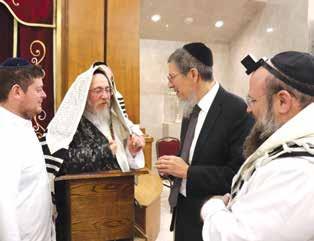
Ttalmidim of
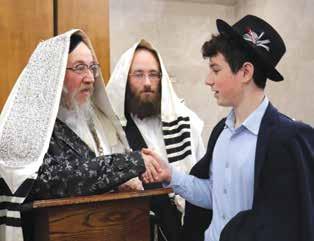
Brak join them for Shacharis last Thursday. In addition to an inspiring tefillah together with the Rebbe, his son, and his
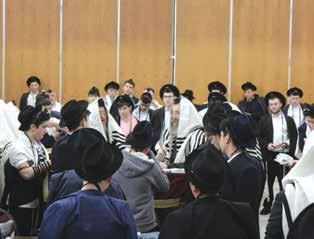
gabbaim, the Rebbe shared divrei chizuk after davening and remained for every bochur to give shalom and receive a bra-
Boots for Israel (BFI) has traveled a long way. Since its October 11 birth in the wake of Hamas’ barbaric October 7 ambush, BFI’s hasn’t stopped moving. While our IDF defenders would go barefoot in their dogged pursuit of terrorists, BFI was created so that they don’t have to.
On Sunday, May 5, BFI returned to the Young Israel of New Rochelle for another successful pairing. Over 100 attendees of all ages packed boots augmented with handwritten letters of support. The mesmerizing hum of activity was occasionally broken as volunteers snacked on Israeli food, took photos with the mountain-high boot-stuffed duffel bags, and sang Hatikvah.
After another successful pairing with YINR, BFI was hosted by Yeshiva University High School for Girls (Central) on Monday, May 13, for a memorable Yom HaZikaron program. Yom HaZikaron will forever hold new meaning for contemporary Jewry as our nation’s story reaches a dark chapter. But in darkness, a single light can shine prominently. Such was the palpable feeling of spirituality manifested by the program of mind, body, and soul, which featured Israeli husband-and-wife duo, Yoni and Yonina, whose popularity has been soaring owing to a bustling social media presence.
Yoni shared his personal experience with BFI. Upon arriving at Central that very morning, he was greeted by one of
BFI’s volunteers and recounted the story of the first day that he joined the IDF operation in Gaza with very old, very torn footwear. It wasn’t long before his feet became bloody and blistered as he rapidly traversed the hostile Gaza terrain. Although Yoni was now on a reprieve from the war effort, he could be summoned back in as quickly as two weeks, to which the volunteer immediately inquired about his boot size. Within half an hour, Yoni received a brand new pair. The incredulous look on his and Yonina’s faces, brimming with emotion and gratitude, said more than any words of thanks.
Following the assembly of inspirational stories, Tehillim, classic Jewish songs, anecdotes from Yakir, and an instructional video portraying both how to pack the boots and BFI’s visible impact on grateful IDF chayalim, students eagerly marched upstairs to the gym, where 2 dozen tables awaited them in neat formation. Adjacent to each table were boxes of boots and duffel bags. Messages of support were tucked within the pairs as they moved from box to bag.
On the heels of Yom HaZikaron, BFI traveled to HANC’s Early Childhood Center in West Hempstead on May 14 for the next step of its ongoing expedition: celebrating Yom Ha’atzmaut with the whole West Hempstead Community. The buoyant rush of activity among the many families in attendance honored Israel’s independence by supporting those who endeavor every day to maintain it.
Seeing volunteers of all ages in seam-

less action as they packed 1,700 pairs reflected the transformative power of achdut. These events aren’t just for communities as a whole, but also as a way for families to bond over a shared chesed experience, making the kind of memories that will carry one through life. What’s special about these events is that, as Yakir emphasized in his opening remarks, within 72 hours the impact of what the volunteers did in America would be felt on the feet of chayalim in Israel.
To conclude the week with warmth and enthusiasm, on Sunday, May 19, Chabad of West Orange, led by Rabbi Kasowitz, hosted BFI for a gathering engineered by Irene Dobkin, New York Regional Director of Club Z, and Senior Educator for Club Z, Yoel Sebbag. Club Z is a group for unaffiliated Jewish youth in grades 8 through 12 who are interested in stepping up for Israel advocacy and Zionism.
Well over 100 participants energetically tackled dozens of boxes of boots in record time. The zest with which volunteers completed every single stage of the packing process could be felt. As soon as the event concluded, a return invitation

was extended. These events demonstrate that even being separated by an ocean cannot dampen the spiritual connection cultivated through chesed-in-action. Boots for Israel, the grassroots organization founded and led by Yakir Wachstock and partnered with the Young Israel of Holliswood, El Al, and the National Council of Young Israel, has mobilized American Jewry to aid their Israeli brethren since Oct. 11th. Over 50,000 pairs have been donated so far, cementing BFI’s role as the foremost overseas supplier of tactical army boots for the IDF.
For more information on volunteering or hosting your own event, please visit https://www.bootsforisrael.com. For donations and sponsorship opportunities, go to thechesedfund.com/bootsontheground/bootsforisrael. Also, follow our trail on Instagram @bootsforisrael, Facebook page, or email us directly at BootsforIsrael@YIHolliswood.org.
Jeremy, a corporate psychologist living in NYC, can be reached at JJUnicorpEnterprises@gmail.com.


Last Thursday evening, Mesivta
Ateres Yaakov held its annual Arista Honor Society Installation and Awards Night, at which tribute was paid to the myriad accomplishments of MAY talmidim. MAY’s Arista program is particularly special, as it commemorates Rabbi Elchonon Zomber, z”l, a MAY alumnus and veteran teacher. The Zomber family graciously endowed the MAY Arista Honor Society in his memory.
Consistent with MAY’s emphasis on developing the entire talmid, excellence in many areas was recognized: Limud HaTorah, Tefilah, Midos, Academics, Athletics and Extracurricular Activities. Awards were presented to over 100 students for excellence and progress in these areas.
The Rosh HaYeshiva, Rabbi Mordechai Yaffe, introduced the program, focusing on the small acts of greatness performed by MAY talmidim that can often
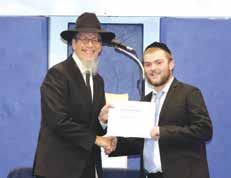
go unnoticed. He noted how the Mesivta not only engenders these acts but also tries to publicly recognize them. Rabbi Yaffe was joined by Menahel, Rabbi Yossi Bennett, and General Studies Principal, Rabbi Sam Rudansky, in presenting the awards of the evening.
Rabbi Rudansky commented, “The evening serves as an opportunity to recognize those students who excel in different areas of the high school experience. That may be academics for some,

On Thursday, May 9, HANC attended their fourth and final debate of the school year at HAFTR. The resolution was that students over the age of 13 should be held criminally responsible for the negative effects of bullying in schools or online.
Congratulations to our winners: Second-place speaker: David Alper
Third-place speaker Jacob Schoenfeld
Third-place speaker: Agam Youseffia
Second place team: Lexi Rosner and Agam Youseffia
Third-place team: David Alper and Sean Mann
Third-place team: Jacob Schoenfeld and Josh Kohen
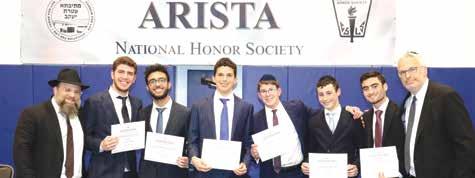
and community service, extracurricular activities and even athletics for others. It’s an evening of tremendous nachas for parents and grandparents.”
The evening closed with the induction of over 60 Arista honors students and lots of pictures and nachas being shared. Mazal tov!

“When Eliyahu Hanavi Will Come, The First Thing He Will Demand is Shabbos!”
It was a small meeting in the home of Rav Yitzchok Sorotzkin, but one that is destined to make a big, massive, transformative change in Klal Yisrael.
Last week, a delegation of prominent rabbanim in Lakewood led by HaGaon HaRav Shmuel Meir Katz, shlita, senior dayan and posek of Beth Medrash Govoha of Lakewood, gathered in the home of HaGaon HaRav Yitzchok Sorotzkin, shlita, Rosh Yeshiva of the Mesivta of Lakewood and Telshe, to discuss and strategize on how to stir more awareness of the imperative to learn hilchos Shabbos. The laws of Shabbos encompass so many areas of daily life, and if a person doesn’t make an effort to learn them properly and comprehensively, even if he is a “shomer Shabbos,” he will sadly not be able to properly be shomer the Shabbos. He and his family will inadvertently transgress multiple halachos
The meeting was also graced by the Nasi of Dirshu, Rav Dovid Hofstedter, shlita, who pledged to utilize Dirshu’s worldwide network to help facilitate greater awareness of the imperative to learn and know hilchos Shabbos.
Among the other rabbanim in attendance were HaRav Moshe Chaim Kahn, Rav of the Willam Street shul and dayan in Beth Medrash Govoha, HaRav Moshe Zev Feldman, dayan in Beth Medrash Govoha, HaRav Dovid Merling, Rav of Khal Zichron Yaakov, HaRav Eliezer Ralbag, Rav of the Lakewood Courtyard Shul, HaRav Chaim Weg, Rosh Kollel Bais Havaad and Rav of the Sunset Grove community, HaRav Yisrael Zucker, Rav of Khal Ner Avrohom and a Daf HaYomi B’Halacha Maggid shiur at Beth Medrash Govoha, HaRav Chanoch Saltz, dayan at the Beis Horaah of Lakewood, and numerous others.
Imagine Hearing that You Have Been Mechallel Every Single Shabbos!!
With a tinge of sadness in his voice, Rav Hofstedter commented, “Imagine what happens after 120 years of life. A frum Yid comes up to shomayim and is asked, ‘Were you a shomer Shabbos?’ His
answer? ‘Of course, I was a shomer Shabbos! I am a frum person….’ Imagine if the Beis Din Shel Maalah then answers, ‘But you have not kept one Shabbos in your entire life! Without realizing it, you have been mechallel Shabbos every Shabbos!’”
Rav Yitzchok Sorotzkin added, “I would like to share a chiddush that I heard in the name of the Chofetz Chaim.
The Chofetz Chaim said that it is a davar barrur, something as clear as day, that when Eliyahu Hanavi comes to herald the coming of Moshiach, the first thing he will muhn, the first thing he will demand, will be an accounting for shemiras Shabbos!”
Rav Sorotzkin then continued, “The Chofetz Chaim said that there is virtually no one who can say, ‘I am a shomer Shabbos k’halacha. Certainly, if you are not a talmid chochom, you cannot make such a claim. If you are a talmid chochom it is your responsibility to make your friends and neighbors aware that one must learn hilchos Shabbos if he wants to truly keep Shabbos!”
Rav Sorotzkin’s words highlighted the purpose of the gathering in his home – to try devising ways to encourage the learning of hilchos Shabbos.
When the numerous rabbanim sitting at the table were asked for advice on how to arouse this awareness, there were several responses.
What was clear from all of the rabbanim is that it was tremendously important to seize the opportunity presented by the fact that the popular Dirshu Daf HaYomi B’Halacha program will begin hilchos Shabbos this coming Shavuos, as the program embarks on Chelek Gimmel of the Mishnah Berurah
If a person starts learning hilchos Shabbos with the Daf HaYomi B’Halacha this coming Shavuos, he will complete hilchos Shabbos within a year and a half. Can we even begin to imagine how many mitzvos assei’s and lo saseis he will have saved himself from transgressing just by dedicating a half hour per day to learning hilchos Shabbos?
A Once-in-a-Lifetime Opportunity
Rav Eliezer Ralbag, made a profound point. He said, this year is an especially auspicious time to start learning hilchos

HaRav Yitzchok Sorotzkin addressing the asifas rabbanim, discussing the Limud Hilchos Shabbos Initiative
Shabbos. Why? Because the Amud HaYomi is also currently learning Masechta Shabbos. Many tens of thousands of people across the globe have been investing heart and soul into learning Masechta Shabbos. They have recently learned about hotzaah, carrying on Shabbos, about cooking and baking on Shabbos, about insulating food on Shabbos… They are already familiar with the sugyos “What an amazing opportunity for them to take it to the next level and learn the actual halachic outcome. All their knowledge of the masechta will give them so much more clarity! It would almost be a shame not to follow through!”
Rav Chaim Weg added that, indeed, he has repeatedly seen that when a person who learns the halachos is actually familiar with the sugyos in the Gemara, the halacha becomes so much clearer and relevant to him, it becomes “lichtig!”
Rav Dovid Hofstedter then reminisced about his years as a yeshiva bachur in Eretz Yisrael. “I learned in Yeshiva Bais Hatalmud of Yerushalayim when Rav Dov Schwartzman was the Rosh Yeshiva, Rav Moshe Shapiro was a maggid shiur and ybl”ch, HaGaon HaRav Aharon Feldman, shlita, today, Rosh Yeshiva of Yeshiva Ner Yisrael of Baltimore, was the mashgiach. One winter zman, we learned Masechta Shabbos. I remember Rav Aharon Feldman urging us all to simultaneously learn hilchos Shabbos, saying, ‘You already learned the sugyos, you understand the underpinnings of the halacha, if you learn the halachos now, you will find it so geshmak and will gain so much!’”
Shabbos, the Mekor of Bracha After much discussion, Rav Yitzchok

Sorotzkin and the other rabbanim agreed that it is important that rabbanim in kehillos the world over should devote time on this coming Parshas Bechukosai to encourage their kehillah members to make a kabbalah to learn hilchos Shabbos with a plan.
There is no better opportunity than to be mekabel Shabbos on Shavuos, the day of Kabbolas HaTorah! On Shavuos, the Daf HaYomi B’Halacha will begin learning hilchos Shabbos, what an amazing zechus!
It is for this very reason that a massive gathering at the Prudential Center in Newark just three days before Shavuos, on 3 Sivan/ June 9, has been planned, to mark the haschala of hilchos Shabbos and get as many people to join as possible, and make this kabbalah before kabalas HaTorah.
The reason for the large gathering in the Prudential Center is that nothing is too much when it comes to encouraging the limud of hilchos Shabbos. Shabbos is the mekor habracha and the greatest shemirah
Dirshu is also making hundreds of new shiurim in hilchos Shabbos available in shuls all over the world. There are also many audio and digital options to hear shiurim daily from the most gifted maggidei shiur in the world.
Today, Klal Yisrael finds itself in an extremely precarious situation from within and without, both in Eretz Yisrael and the diaspora. We desperately need bracha and shemirah, and Shabbos can provide both!
Let us answer the call of the Roshei Yeshiva and rabbanim. Let’s be Mekabel Shabbos – k’hilchaso!

This past Sunday, CATCH hosted a beautiful event with guest speakers Dr. Rachel Lowinger and Rabbi Shais Taub. Together as a community we will continue to knock down shame and stigma within our community surrounding mental illness.
Shame is a topic that no one wants to talk about. Shame is that gremlin that tells us something is wrong, not normal or unacceptable with who we are or what we struggle with. This shame is loud. VERY LOUD! It tells us to disengage and hide. In our culture, shame is an epidemic.
Just a few years ago, after spending my 40th birthday in a psychiatric hospital, I decided to take my excruciating pain of living with anxiety and depression and turn it into purpose. The night before my first speaking engagement, the organization I was speaking for called to suggest they felt it may be safer to share my story in third person. I gave it some serious thought and asked myself what the biggest risk would be. I was already married. Was it truly possible that speaking and sharing my story would affect my children’s opportunity to find their soulmate? As a mom who cares deeply about each and every one of my children, I came to the decision and acknowledgement that we all face struggles in our lives – physical, emotional, marital and financial. The list goes on. No one gets through unscarred. And I want my children to marry someone who has the courage and strength to face challenges and difficulties. Not hide. Not run. Not ignore.
And so, I chose that evening to begin my journey of vulnerability because I understand the loneliness and isolation of living with a mental illness. And I knew that I wasn’t alone. According to Brene Brown, a well-known shame and vulnerability researcher, “Vulnerability is the willingness to show up even when you cannot control the outcome.” And I was willing to take that risk in order to combat the shame within our community.
According to Brown, if you put shame in a petri dish, it needs three things to grow exponentially: secrecy, silence and judgement. If you put shame in that same petri dish and add empathy, shame loses its power and begins to disappear. So, how do we combat shame? We connect, talk to others with shared experiences, and create support. The two most powerful words when you are in struggle is to hear another say, “Me too!”
And this, my dear friends, is exactly what CATCH is here to do. Through our support groups, individuals come together each week to connect, validate and support each other. We become each other’s cheerleaders. We are there to applaud when someone has accomplished a goal, and we are there to pick each other up when someone feels they are falling. Unfortunately, we cannot take away one another’s struggles and pain. We CAN be there throughout the journey and replace loneliness and isolation with comradery and teammates.
It’s time to put shame to rest. It is in our hands to replace shame with acceptance, care, connection and hope.
CATCH Support: Info@catchsupport. org or 347-433-4742.
The 5 Towns Hockey League is finishing up what was an amazing season. The Playoffs have begun, and a champion will soon be crowned. Over 300 boys from 10 different communities participate in the league. The most amazing aspect of the 5 Towns Hockey League is that all participants improve tremendously. When they start in Pre1A and move up as they get older, they become real hockey players. They are the ones that are the best in their camps in hockey and the ones that make the teams when it comes to organized school sports. The skills they learn in the game of hockey follow them forever. The best emails we get are from parents after the summer telling us that their son was the best in the division in hockey or that he made the high school hockey team. Of course, sportsmanship and middot play a big role as well, and that is stressed every game of the season.

The 5 Towns Hockey League, which is in its 26th year, has over 30 teams participating and enjoying the game of hockey. Every season FM Home Loans, the corporate sponsor, provides an amazing giveaway from Nike hats to duffel bags. This season, they gave every participant a new 5 Towns Hockey Gatorade water bottle. Looking forward to the fall season.

Mercaz Academy’s first Art and Memorabilia Auction took place in Plainview on Sunday, and attendees had a wonderful time sipping wine, nibbling on sushi and cheese, and strolling school halls transformed into an art gallery.
Staff, parents, and art lovers admired the paintings as they placed their bids in a silent auction. Featured art included a collection by local artist Ahuvah “Bebe” Dushey, an innovative multimedia artist. In addition to paintings, Dushey’s jewelry – wearable art – was available for purchase as well as her hand-crocheted bags. Sports and other memorabilia were up for bid, and a separate gallery displaying a broad array of student artwork in various media, beautiful but not for sale. Additionally, raffle tickets were sold for a wide variety of gift packages, including a
tuition discount for the coming academic year at Mercaz.
The live auction was conducted by auctioneer Marc Comerchero, a retired teacher who enjoys volunteering his time to help raise funds for worthy organizations. Mr. Comerchero drew in his audience with his witty quips and engaging personality, and items up for auction included a silver seder plate and other valuables as well as swimming parties, art lessons, and other experiences. The most coveted item of all was the opportunity to be principal for a day, contributed by Mercaz Principal Rabbi Kalman Fogel.
The efforts and talents of numerous volunteers and lay leaders made the Art and Memorabilia Auction a huge success, raising money for the school and providing attendees with a fun and memorable evening.
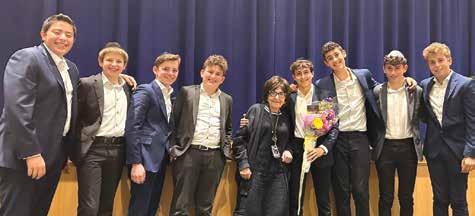
On Monday evening, the eighth grade students at HALB premiered their Names, Not Num-
bers documentary. Sixty students had the opportunity to spend the year interviewing Holocaust survivors, filming and
The Rebbe Who Brought Faith, Hope and Light to a Nation
During and after World War II, a leader of exceptional stature emerged in Klal Yisrael. He was a dynamo, a brilliant talmid chacham who displayed unwavering dedication to Hashem and His people, and above all, unparalleled self-sacrifice. He was Rav Yekusiel Yehudah Halberstam, the Klausenberger Rebbe.
Despite enduring unspeakable personal tragedies, he ascended to remarkable spiritual heights while inspiring his suffering brethren. His indomitable spirit continued to inspire fellow survivors, offering hope and illuminating faith in a world shrouded in darkness.
In this meticulously researched and powerfully written biography, we encounter this extraordinary figure, whose unwavering faith served as a beacon, singlehandedly drawing thousands to Torah observance and rebuilding the Torah world. He instituted programs like Mifal Hashas that were revolutionary and transformative. His private avodas Hashem seemed superhuman, as he spent hours on end immersed in Torah learning and tefillah, inspiring other towards greater spiritual aspirations.
The Rebbe wore many hats: He was a rav who paskened she’eilos, a rosh yeshiva who delivered shiurim, and a Rebbe who accepted kvitlach, guided chassidim, and dispensed brachos…and a father and mother to countless broken survivors.

editing to create their unique documentary. It was incredibly powerful to hear firsthand stories from Holocaust survi-
vors and to see how much the students gained and learned from their experience working on this project.
During the first decades after the war, the Rebbe’s constant chesed on behalf of the survivors superseded anything else. From the most mundane aspects of obtaining food, visas, money to enable them to get married, worrying about a sheitel for a kallah, rebuilding chadarim and yeshivos… The Rebbe’s every waking moment was completely devoted to chesed for others, to the point where he temporarily relinquished his own spiritual goals.
What for most people would have been “dayeinu, enough,” was never enough for the Rebbe. When he had satisfactorily built the mosdos in the DP camps, he did not say dayeinu but set his sights on America. Then he began to branch out to Montreal, South America, and many other places where he saw a need. Even then he did not say dayeinu. Instead, he turned his eyes toward Eretz Yisrael with the dream of building up the entire country and populating it with G-d-fearing Jews.
When enough mosdos were established, he turned his gaze toward providing inexpensive housing so young couples would be free to pursue spiritual goals and not be mired in budgetary concerns. Later, he built orphanages for children and old-age homes, as well as a hospital for the sick and infirm.
He was pure chesed.
He raised copious sums for these projects and traveled the world at great personal sacrifice. He raised millions of dollars, keeping absolutely nothing for himself. He even insisted on paying rent
for his apartment in Union City that was located in the yeshivah building. Millions of dollars passed through his hands, but he lived frugally and simply, not wasting money on unnecessary items.
This devotion to chesed and to filling the needs of Klal Yisrael was already evident in his younger years when he was a Rav in pre-war Klausenburg.
His gabbai, R’ Shmuel Pollack, related the following story: A destitute widow once came to the Rebbe crying bitterly. “I have no money,” she sobbed, “and my daughter is getting married tonight. However, I don’t even have money to buy her the most basic necessities that a kallah brings into the house, such as bedding, towels, and the like.”
The Rebbe was in a quandary. He also didn’t have a penny in the house. “You know what?” he told the woman. “Tell the kallah to come to my house a bit later with an empty wagon. She should make sure the wagon is parked right under my upstairs window.”
Then, he instructed R’ Shmuel to make sure that when she came no one would be looking. The wagon came and the Rebbe himself went upstairs and began taking his own sheets, blankets, pillows, and towels, and those of his children. He literally tossed them out the open window straight into the wagon.
Now the widow could bring her daughter to the chuppah with a light heart.
As for the Rebbe’s family?
They were surprised to discover that all their pillows, blankets, and sheets

had disappeared, and they would have to make do until the money to buy new ones materialized.
The Rebbe’s devotion to chesed was rooted in his illustrious ancestor, the Divrei Chaim of Sanz, who would never go to sleep if there was even one penny left in the house. Every single coin that the Divrei Chaim received had to be distributed to tzedakah that same day. The Klausenburger Rebbe followed in his path. Any money that came his way, whether for kvitlach or through fundraising, was consecrated for the various tzedakah causes and mosdos that he had built and for which he had assumed responsibility.
Indeed, he was kulo chesed
Read the biography and learn of the unfathomable heights to which a human being can reach.

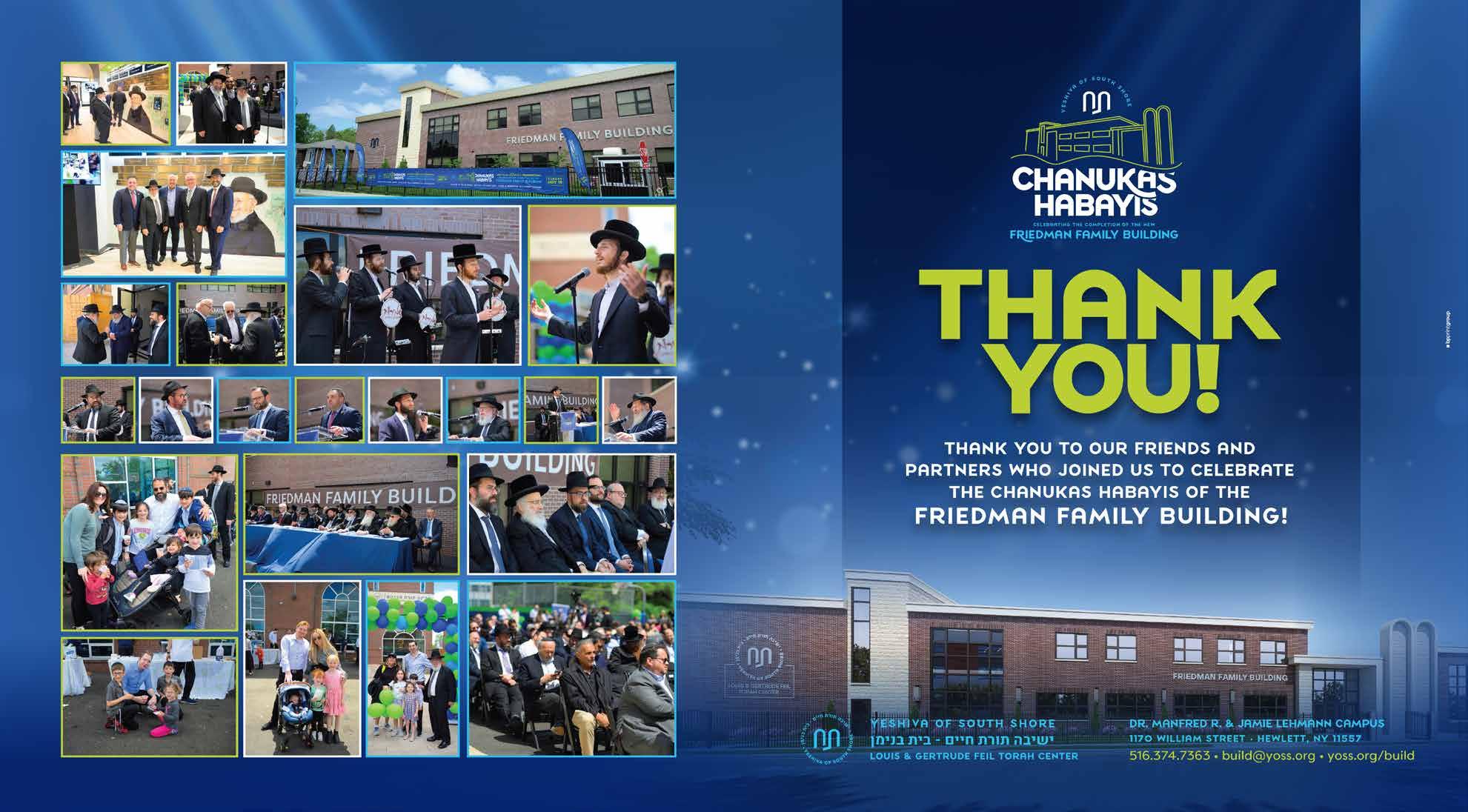

My name is Chana Tova (Popack) Zakon. I have lived in Lawrence for all twenty-three years of my life and have been married for over a year. You may have heard of my mother, Deputy Mayor Paris Popack. For as long as I can remember, she has always been a doer—a go-getter in all areas of life. So, when she told our family that she wanted to run for Mayor of Lawrence, it felt like a no-brainer, as it was so obvious that she would do it well.
Since I participated with my mother in many of her activities for the benefit of the Lawrence community, I have the unique advantage to share with you insights about my her. I decided to write this article on my own because I’ve witnessed some misleading narratives printed that are not reality.
I can only share with you what I have seen firsthand, but I am sure there are many other admirable things she has done that I am unaware of.
I grew up with a father who taught our family the importance of hard work and philanthropic giving back to those in need and a mother who had that same mindset. From a young age, people have been praising my parents to me. In shul, I would hold my mother’s hand after morning davening while she schmoozed with other women. I would look up and attempt to listen to their conversations. She was heavily involved in planning the annual Women’s Luncheons and Chabad Dinners, and they would usually use phrases like “It was such an amazing event you put together” or “How did you pull it off?” I would look up proudly until the nice lady would bend down to ask me, “Do you know your mother is a powerhouse?” or say, “I love your mother – she’s the best,” to which I would shyly reply, “Me too.” I loved having that admiration in common with others as it verified and validated my truth.
Many years ago, I got so excited when I found out my mother volunteered to assist her good friend, Ellen Basch, a playwright, in co-directing my future middle school musical. Both were a multi-talented dynamic duo who knew what looked and sounded excellent on the stage. They spent all summer writing the plays and then during the year casting, rehearsing and producing them. The two of them would rehearse with the students until it was just right. It felt so cool watching my mother make the show come together and turn it into something people would value and applaud. To her, it was as if it was Broadway, because if she was going to do something, she would do it right, and she did so for seven consecutive years. The students came out of their drama experience having learned life skills to carry them forward with confidence.
Around the age of ten, I started playing tennis, so my mother immediately put me into lessons – she always took my interests seriously. My mom watched my first official lesson at the Lawrence Country Club, taking photos.
When I told her I didn’t need a picture, she explained that I would be happy to have them if I went pro. I did not go pro, but it is still nice to have those photos. One day, when I couldn’t make it to a lesson, my mom did me a favor and went instead of me and was hooked immediately. From then on, she was a dedicated tennis player. Fast forward a few years, and she was one of best female tennis players in Lawrence and the President of the LYCC Women’s Tennis Club. That was one of her introductions to genuine involvement in Village issues. She saw changes because she made them happen. Then my mother was appointed a LYCC Park Commissioner, and again, she got to be hands-on, hear the community’s needs, and then meet them. More people saw her impact over the years and wanted her on their side. She eventually ran for Trustee of Lawrence, because it was en-
My mom invests countless hours into every project and spends her own resources if she feels it is appropriate because, to her, the Village of Lawrence is an extension of our family.
for breast cancer research), but she also implemented the sale of banners on the courts and personally supplied swag bags and custom T-shirts for the participants. To coordinate with Play for P.I.N.K and beautify the Tennis House, she donated pink and white hanging flower baskets and had pink and white flowers planted because every detail counts to her.
My mother has always been passionately against overdevelopment in the Five Towns. She was concerned that area residents were not fully aware of what could happen if they did not stop developers from going overboard. In response, she organized community meetings, arranged for and provided lawn signs, car magnets, t-shirts, and some legal fees. My mom is a real grassroots political and community activist.
Additionally, my mother supports the Lawrence-Cedarhurst Volunteer Fire Department by donating life-saving equipment, a training wall that’s used weekly, and tactical gear to safeguard the neighborhood. The Chiefs and firemen appreciated her help so much that I got to ride in their fire truck!
Another example of her efforts for the community, that I was involved in, is the annual LCFD Memorial Day Parade. During her first couple of years taking on the project of planning the parade, I was in high school, and my friends and I would march in it. My mother paid for the parade’s publicity, invested her time and energy in recruiting marchers and entrants, and practically covered the costs from A to Z for many years. Now, the annual parade has a greater turnout, overall excitement, and appreciation because of her involvement and patriotic commitment.
thusiastically requested by so many. My mother has nobly held this position for the past four years.
She consistently goes above and beyond what is asked of her. My mom invests countless hours into every project and spends her own resources if she feels it is appropriate because, to her, the Village of Lawrence is an extension of our family.
When my mother was president of the Lawrence Civic Association, she revived it and personally subsidized the printing and mailing of the Watchdog Newsletter, which was designed and distributed to the residents so that they could be fully informed of the happenings within their village.
As a Trustee, my mother was directly involved in the conception and redesigning of Lawrence’s Zion Park. She felt it was important for families to have a fun community park they could be proud of. The park’s grand reopening took place last year, and it was a beautiful event. She personally provided custom banners and “I Love Lawrence” hats to celebrate the big day, making it all the more special.
Not only did she organize the Lawrence Country Club’s Play for P.I.N.K. Tennis Tournaments (fundraising
Recently, my mother has donated new wooden putting green flagsticks for the golf course and supplied antique hickory golf clubs for upcoming golf tournaments in honor of the Lawrence Country Club’s Centennial Celebration, of which she is the co-chair.
At the Lawrence Country Club Loyalty Party which my mother organized for the 2023 golf members, she gifted elegant golf-themed floral table centerpieces and sponsored the pro shop raffle ticket prizes.
My mother, Paris Popack, wants Lawrence to remain as great as it is for future generations. I am grateful that she isn’t a bystander. She puts in the work and takes every action seriously. A lesson I have absorbed from living with my parents is that if you want to improve the world, it starts with your community first.
Most of what I have listed is not publicized, but as her daughter, I feel it is important for the Village to know what she does behind the scenes. Hopefully, this will inspire others to find a new appreciation of my mother and, in turn, VOTE for her for mayor on June 18, so that she can continue to be as great a blessing to our community as she is to me and our family.


1. What is archery?
a. Firing arrows from a bow
b. The sport of walking through short arches and trying not to bump your head
c. A type of farming
d. Guessing the arch of a ball that is thrown in front of you
2. What is the name of the device used to draw a bowstring back in preparation for shooting?
a. Fletching
b. Nock
c. Quiver
d. Release Aid
3. Which ancient civilization is credited with the earliest recorded use of the bow and arrow?
a. Mesopotamia
b. Greece
c. Rome
d. Egypt
4. In archery, how many points is the bullseye worth?
a. 3
b. 10
c. 25
d. 100
5. What is the

term for one who loves archery?
a. Toxophily
b. Archibilly
c. Archerist
d. Archist
6. How quickly can an arrow travel?
a. 60 MPH
b. 100 MPH
c. 200 MPH
d. 700 MPH
7. Which country won the gold medal for archery in the 2022 Olympics?
a. Turkey
b. U.S.
c. Japan
d. China Answer:

Wisdom key:
6-7 correct: Bullseye!
Without any limit on the number of arrows she can use, how close can an archer get to scoring a total of 100 points?
The point values for the different rings on the target are as follows: 40, 39, 24, 23, 17, and 16.

It’s possible to score exactly 100 points. Shoot two arrows worth 16 points each (32 points) and four arrows worth 17 points each (68 points) for a total of 100 points.
3-5 correct: You just shot an arrow at my head! 0-2 correct: You just shot an arrow at your head! Answer:
The following are all nicknames of fire stations in New York City, except one. Can you spot the fake?
Red Hook Raiders
The Gas House Gang
The Tillary Street Tigers
The Bush Wackers
We Walk The Line
The Pride of Bed Sty
To Hull and Back
Hot Stuff
Going to Blazes
The Flaming Skulls
Blazing Saddles
Knights of Fire
Hang on We’re Coming
Stairway to Heaven
Midtown’s Most Wanted
The Smokebusters
Never a Dull Moment
The Red Devils
The Hot Corner
The Pastafarians

Why didn’t the green pepper practice archery?
Because it didn’t habanero.
Ever tried blindfolded archery?
You don’t know what you’re missing.


Answer: The Pastafarians

 By Rabbi Berel Wein
By Rabbi Berel Wein
The parsha begins with the word that defines its name – behar – on the mountain. The mountain naturally is Sinai, and the Torah’s emphasis is to reinforce Judaism’s core belief that our Torah is Gid-given and not the work of a committee over centuries. This basic belief lies at the heart of many of the contentious disputes that have marked Jewish life over the ages.
While original splinter groups, such as the Sadducees and the Karaites, did not openly deny the validity of the Written Torah as being godly in origin, they strenuously denied the holiness of the Oral Law of Sinai and denigrated its rabbinic interpretations and decrees. This led to serious splits within the Jewish people and to bitter recriminations that lasted centuries. In all these instances, the di-


vinity of Torah and of its Oral Law always eventually won out. Deviant movements eventually fell away from the main body of the Jewish people, both individually and as a potent group in influencing Jewish life and mores.
The “mountain” referred to is the one at Sinai where the Torah was given to Israel. It is a difficult mountain to ascend; the Psalmist asks: “Who can ascend the mountain of G-d?” But as difficult as it is to ascend the mountain, it is even more difficult to remain there. The Psalmist again intones, “Who can maintain oneself, in the holiness of G-d’s place?” The struggle about maintaining the Jewish people on the mountain
its purpose at one time, but that time has now passed. New ideologies and circumstances have rendered it obsolete. So, for them the mountain no longer exists. A second group denies the existence of the mountain altogether. There never was a mountain – it is all an urban legend fostered by the rabbis over the ages. In effect, our grandfathers were all liars or naïve believers in legends and stories for which there is no current historical scientific evidence. Aside from these two groupings, there are groups who wish to be included in the religion of Judaism and who do not see themselves as being secular. But, in varying degrees, they follow the ideas of the Sadducees and
The struggle about maintaining the Jewish people on the mountain of G-d in belief and faith has been the hallmark of Jewish life over millennia.
of G-d in belief and faith has been the hallmark of Jewish life over millennia. It has not abated in our time.
Jewish secularism comes in two different and divergent forms. One is simply that the Torah’s way of life and value system does not harmonize with modern society and its demands. Shabat, kashrut, etc. are all too restrictive to be functional in today’s world. The Jewish people cannot afford to be so different from the rest of the world. The mountain may have had
the Karaites though they essentially also deny that the mountain has anything to do with G-d and divine origins. History shows that in the long run such philosophies and movements give way to the pressures of time and circumstance and eventually lose their influence and power. At the end of the day, only the mountain remains as it always has, challenging us to ascend it and maintain ourselves upon it.
Shabbat shalom.

We long for the opportunity to observe the Yovel, the Jubilee Year, again. The Ramban in this week’s parsha (on Vayikra 25:10) quotes a number of pesukim from throughout Tanach to explain the meaning and origin of the word Yovel. One of the pesukim he quotes is Yirmiyahu 17:8: “He shall be like a tree planted by the waters, that spreads out its roots by the river, yuval.” After all of the proofs he brings, the Ramban concludes, “But the true understanding is yovel [means something which] returns to the river from which it came…” The word Yovel refers to a river, but it comes from the word “movil, to bring” because it means bringing something back to its source. During the Yovel, we somehow return to the waters, to the source, from which we draw the essence of our lives. We return to our roots.
We know that the Torah is eternal, yet we do not merit fulfilling the mitzvah of Yovel today. How can we relate to it? Let us review the three main aspects of Yov-
 By Rav Moshe Weinberger
Adapted for publication by Binyomin Wolf
By Rav Moshe Weinberger
Adapted for publication by Binyomin Wolf

el mentioned in the Torah and consider how each one speaks to us today.
The first is the freeing of the slaves (Vayikra 25:10): “And you shall proclaim freedom [for Jewish slaves] in the land.”
It takes very little imagination to see how we need to be redeemed from so many different types of slavery even today. The Gemara says that we are meant to be slaves to Hashem and not slaves of slaves (Kiddushin 22b). How many of us are enslaved to our jobs and careers? We never see our wives or spend time with our children, and when people ask us why we work so hard, we say, “It’s because I love my children!” How many of us are enslaved to tiny electronic devices? We cannot go thirty seconds without checking, looking at, and touching them. Yovel is when we declare ourselves free from human bondage and allow ourselves to be reclaimed by Hashem as His servants. We recognize that in our core, we are free men. We cannot be bound by human chains. Yovel reminds us to return to our roots, our essential freedom.
The second attribute of Yovel is (Vayikra 25:10), “And you shall return, each man to his property, and you shall return, each man to his family.” Part of the essence of who we are is to stay connected to our families (see also Meshech Chochmah on this pasuk). How many brothers, sisters, or parents have grown apart from each other, either because of apathy or because of some dispute or pain and hurt one has caused the other? Yovel means returning to our hometowns and reconnecting with estranged family. By reconciling with people from whom we have become distant, we reconnect with our own roots, to our essential selves.
The third attribute is our connection with our homeland, Eretz Yisroel. The pasuk (Vayikra 25:23) says, “The land shall not be sold permanently, for the land belongs to Me.” Yovel reminds us that our connection with Eretz Yisroel exists because we and the land belong to G-d. We cannot be separated. We cannot separate from our homeland. It is part of
us. Yovel reminds us that ultimately all of Eretz Yisroel will return to where it belongs, with us.
We see a common denominator in all three attributes of Yovel. They all involve returning to our roots, coming back to some part of our true selves from which we had become separated. With that background, we can understand the true meaning of freedom when the pasuk says, “And you shall declare freedom, dror, in the land.” Dovid Hamelech (Tehillim 84:4) speaks of a bird called the Dror: “Even a bird found a house, and a Dror, her nest.” What is the nature of this bird called a Dror? The Gemara (Beiah 24a) says, “Raba Bar Rav Huna says, ‘This refers to the Dror bird which does not accept [human] ownership… And why is it called a Dror bird? Because it lives, dar, in the house just like in the field.” The nature of this free bird does not allow it to accept human mastery. So even when one puts this bird in his house, it behaves as if it were still in the field, flying and flitting around in every direction. It is
impossible to capture it. It is true to its inner nature as a free creature no matter what its external circumstances are. That is real freedom.
Chazal also teach (Rosh Hashana 9b), “Everyone agrees that the word dror means freedom. What is the origin of this word? As the braisa says, ‘Dror means freedom, like one who lives [as if he were at home] in any inn, who brings, she’movil, merchandise to every country.’” Freedom means the ability to bring anything where it belongs and act and feel as if one is at home no matter where his circumstances bring him.
What does it mean to embrace freedom? Shlomo Hamelech refers to the Dror, the free bird, in a pasuk in Mishlei (26:2): “Like a wandering bird, like a flying Dror…” The Ibn Ezra explains: “It is a small bird which sings when it is in its own domain [when it is free]. And if it is in a man’s domain, it does not eat to the point that it dies.” The Dror was born to sing. It loves nothing more. But the moment it is enslaved, it can no longer bring itself to sing. Over 600 years after the Ibn Ezra penned his commentary on Mishlei, Patrick Henry echoed the substance of his words when he said, “Give me liberty or give me death.” When the Dror is no longer free to sing its own song, to be true to itself, it would rather starve itself to death.
Our people are like the Dror, the free bird, which thirsts for the freedom to return to its roots, to express its own essential nature. It bristles at the thought of being forced to masquerade around as something other than its true self. The Jewish people as a community, and each Jew individually, longs to sing his or her own song. We can only fly higher when we are in our own domain, connected to our own roots.
This is what Rav Avraham Yitzchak Hakohein Kook, zy”a, was trying to tell us when he wrote (Oros Hakodesh 64): Ascend higher, ascend.
For you possess a mighty power. You have wings of the spirit, Wings of mighty eagles. Do not deny them, Lest they deny you. Seek them out, And they will find you.
Our faculties, interests, passions and idealism, when they flow from our deepest selves and not from the desire to imitate foreign nations and ideologies, are powerful wings that will allow us to soar higher and higher if we do not stifle them. It is clear from everything above that that being a free bird means allowing the
truth of our inner essence to express itself. But some feel that being free means throwing off the yoke of all responsibility, whether moral, interpersonal, or religious. But this is a mistake because it not only ignores the true meaning of freedom, it also means closing one’s eyes to the fact that such “freedom” usually means subjecting oneself to the yoke of the fickle demands of the animal soul and foreign nations or their ideologies.
Freedom divorced from responsibility, commitment, and stability leads to destruction because it takes one further
lotted portion and my cup. You guide my lot. Packages have fallen to me in pleasant places, even the beautiful inheritance upon me.”
Dovid Hamelech is saying that he finds whatever portion Hashem gives him pleasant because that is his lot. One’s portion includes being born into a certain family, having a certain wife, being bestowed with certain faculties and limitations, and having a certain level of financial success or hardship. But “Who is rich? One who is happy with his portion.” I soar when I play the hand I am dealt to the fullest. I express my own personal
By fulfilling our commitments to the life Hashem custom designed for each of us, we are truly free because we express our true nature.
away from his own inner truth. It means forgetting the lesson of Yovel, which is movil, brings things back to their source. The Navi refers to this false freedom when he writes (Yirmiyahu 34:17), “Behold I call out ‘freedom’ to you, says Hashem, to sword, plague, and famine…” There is a negative type of freedom. When we “free” ourselves from the need to be true to who we are, it leads to our destruction because Hashem appears to “free” us from a connection with His providence. True liberty means freeing ourselves from the bonds of limited, finite human concepts of “truth.” Real freedom does not mean obeying every fleeting (or persistent) fancy. It means returning to the song of our roots, our essence, our home, our homeland, our families, and our people. “And you shall return, each man to his property and you shall return, each man to his family.”
Hashem prepares a certain life for each person in this world, an environment in which his soul can truly express itself. When a person gets married, he exchanges the apparent freedom of single life for the responsibility and commitment of marriage because that is the life Hashem prepared for him. Fulfilling his responsibilities in the context of that life is the true expression of his nature and the actualization of his personal potential.
Dovid Hamelech refers to the fact that we must each learn to soar in the unique portion Hashem prepared for us when he said (Tehillim 16:5-6), “Hashem is my al-
for me.” But the Rebbe seemed somwhat indifferent and responded, “This world is filled with so much darkness. Why do you want to stay here? Go in good health to the Next World!”
Hearing this, everyone in the room began wailing with mourning and could not understand why the Rebbe was not praying for his son-in-law. So Reb Leizer’l said, “But Rebbe, I’m worried. I do not feel confident about my place in the Next World!” So the Divrei Chaim reassured him, “That’s why you don’t want to leave the world? Don’t worry! I assure you that you will have the highest place in Gan Eden. You have nothing to worry about. Now go in peace.”
But Reb Leizer’l begged him, “But Rebbe, what about my family?”
“You’re worried that there won’t be anyone to take care of your wife and children?! Do not be concerned. They are my family, too. I will ensure that they are cared for. You do not need to stay in this world for that.”
song when I can sing (Shacharis), “We are fortunate and how good is our portion, how pleasant is our lot and how beautiful is our inheritance!”
One’s portion and inheritance are not the product of free will. They are not a matter of choice. Yet in davening we praise Hashem for our portion, our lot and our inheritance. Why? Because they belong to us. By fulfilling our commitments to the life Hashem custom designed for each of us, we are truly free because we express our true nature. We are being ourselves.
Yovel, which means freeing ourselves from external, superficial, temporary, and foreign influences and returning to who we are, forces us to ask ourselves: How far have I flown from my roots? Have I misused my free will by rejecting my personal portion in favor of some stranger’s portion I thought looked more attractive? Have I clipped my own wings by cutting myself off from my family, responsibilities, land, and my brothers and sisters? Am I singing someone else’s song or my own?
Rav Laizer Djhikover, zy”a, was the son-in-law of Rav Chaim of Tzanz, zy”a, the Divrei Chaim. At one point, Reb Leizer’l fell ill. He became sicker and sicker until he was literally within minutes of death. He whispered to someone to summon his father-in-law, the Divrei Chaim. When Rav Cham arrived, Reb Leizer’l said, “Please, I do not want to leave this world. Daven
Finally, Reb Leizer’l pleaded, “But Rebbe! It’s almost Rosh Hashanah. You know that no one sings ‘Unesaneh Tokef’ like me. When I lead the davening on Rosh Hashanah, the angels stand in wonderment. They cannot understand how such a Divine sound can emanate from this lowly world.”
The Divrei Chaim thought for a moment, and then responded, “Indeed you have a point.”
Immediately, the Rebbe ran to the mikvah and, knowing that his son-in-law had only moments of life left in him, returned quickly with his tallis on to daven with every bit of life in him for Reb Leizer’l’s salvation. And in fact, Reb Leizer’l recovered and lived for many more years.
Each of us has our own song in this world, our own Unesaneh Tokef, which only we can sing and which brings pleasure and Divine light to all worlds when we sing it. It is irreplaceable as long as we are truly singing our own song, using the tools and blessings which Hashem gave us. This year, even before Yovel begins, may we merit to return to our own music based on the portion Hashem gave us. Then we will truly be free birds, soaring higher and higher as we sing our own song until our voices join the music of the Levi’im in the third Beis Hamikdash, may it be built very soon in our days.
Rav Moshe Weinberger, shlita, is the founding Morah d’Asrah of Congregation Aish Kodesh in Woodmere, NY, and serves as leader of the new mechina Emek HaMelech.
 By Rabbi Shmuel Reichman
By Rabbi Shmuel Reichman

In our previous article, we began exploring the depth of sefiras ha’omer. Based on the Maharal and Ramban, we explained that we are not counting down to Matan Torah, but rather we are building up towards it, ascending one day at a time. We do not wait for Shavuos to arrive; we actively bring it ourselves through the time and effort we invest as we count the omer. After developing a general understanding of sefiras ha’omer, let us focus on a few specifics of the count itself. The 49 days of sefiras ha’omer parallels the 49-day process that the Jewish people went through upon leaving Egypt, before receiving the Torah. What is the meaning behind this process, and why is it specifically 49 days long?
While we likely take it for granted that the omer is 49 days long, the Torah explicitly commands us: “ Tisperu chamishim yom — You shall count fifty days” (Vayikra 23:16). Why then do we only count 49 days, omitting the fiftieth day completely? This seems to be in direct contradiction to the Torah’s command! Additionally, we seem to skip the first day
of the counting, only beginning the count on the second day of Pesach. What is the meaning behind this?
The Ramchal, Vilna Gaon, and many other Jewish thinkers explain the deep meaning behind the 49-day process of sefirah based on a principle we have previously developed. Every process contains three stages. The first stage is the high, a spark of inspiration, an experience of perfection and clarity. However, this first stage is fleeting, and is immediately followed by a dramatic fall – a complete loss of everything experienced in the first stage. The second stage is a process of rebuilding what was originally experienced, working and building toward perfection. There is then a third stage – a return to the original perfection of the first stage. However, this third stage is fundamentally different from the first. It is the same perfection, the same clarity, but this time it’s a perfection and clarity that you have earned. The first
time it was given to you, but now you have worked to build it for yourself.
The first night of Pesach was a gift, an experience of infinite transcendence. This night was characterized by the miracles of makkas bechoros – performed by Hashem Himself – and yetzias Mitzrayim , as well as the mitzvos of Korban Pesach and bris milah, mitzvos that connected the Jewish people to a higher dimension of existence. However, immediately following this night was a complete fall from this exalted level of transcendence.
The Jewish people faced 49 days in the desert, a place of spiritual emptiness. It was during these 49 days of counting and of building that the Jewish people were able to rebuild and earn that initial transcendent gift. What resulted from those 49 days of building was Shavuos, Matan Torah, an experience of transcendence, of infinity, and of the World to Come.
This is why the Korban Omer is a sacrifice of barley, a food described by the sages as animal fodder (Pesachim 3b).
The Shavuos sacrifice is Shtei HaLechem, a sacrifice of bread made of wheat, a food
characterized by the sages as human food (Aruch Hashulchan 489:3). Prior to the process of sefiras ha’omer, we are on a low spiritual level, the level of animals. After spending the 49 days of the omer counting and building ourselves, we rise to a transcendent spiritual level, tapping into our true nature as tzelem Elokim, now worthy and ready to experience Matan Torah. Perhaps this is why there were two loaves of bread – one representing the original gift on the first night of Pesach, and the second representing what we earned after 49 days of building.
We don’t count the first night of Pesach, because this night is a gift of inspiration, intangible and unearned. We cannot pin a number down to it, as it is fleeting and elusive. Sefiras ha’omer is a process of building, and the building process only begins on the second day of Pesach once the gift has been taken away; it is at this point that we must start the work of truly earning it.
49 Days of Building
Why is the counting of the omer specifically 49 days long? Nothing in Torah is arbitrary; there must be a reason why we count exactly 49 days before receiving the Torah on Shavuos; there must be a significance to this specific number.
In order to understand the number 49, we must recall a principle we have developed previously, based on the ideas of the Maharal. We live in a three-dimensional world, which includes the six directions of space: right-left, up-down, and forward-backward. These are the six sides of a three-dimensional cube. However, the six sides don’t automatically result in a three-dimensional cube; the six sides can be lying face down on the floor, amounting to nothing. The concept of “seven” refers to that which connects all the pieces together into a single unit. This is the unifying center, the unifying force that creates a physical form and vessel from the six disparate parts.
As we have discussed previously, the Maharal explains that seven is the number of the natural (Tiferes Yisrael, chaps. 1–2, 25). This is why all physical and natural components of this world are comprised of sevens: there are seven days in the week, seven notes in the musical scale, seven colors in the spectrum of light, and many other examples. “Six” represents the physical pieces, such as the days of the week. “Seven” represents that which connects the physical pieces together, connecting the physical to the spiritual, like the day of Shabbos. The “eighth” refers to that which transcends the sum of the pieces; it is the transcendent element that emanates from the level of seven, transcending the physical. This is why bris milah is performed on the eighth day; we transform the most physical and potentially animalistic organ into a vehicle of holiness and transcendence. This same theme is why the miracle of Chanukah lasted eight days, and why the miracle occurred through shemen, a word with the same root and concept as shemonah. This is why sefiras ha’omer is a seven-week process of seven days each. Sefiras ha’omer is a process of building from the physical to the spiritual, from the finite to the infinite. This is the journey from six to seven to eight. We build level-by-level toward transcendence, toward the infinite, and toward the eighth week – Matan Torah. We therefore count seven weeks of seven days for a total of 49 days, the ultimate expression of seven. This completes the physical building process, resulting in the fiftieth, the first day of the eighth week, the ultimate tran-
scendence of the eighth level, Shavuos.
Another interesting feature of the omer is the emphasis on counting each day. This suggests that sefiras ha’omer is one long mitzvah, complete only if each of the 49 days are counted. However, l’halachah, we make a bracha on each individual day of the omer, suggesting that each one is a mitzvah in its own right. How can we reconcile this apparent inconsistency?
Rav Dessler describes two different types of order. The first is a practical
one of the 49 pieces are built correctly can the fiftieth emanate from the pieces and can Matan Torah occur.
This second type of order is also the secret behind why we do not count the fiftieth day of the omer. While six represents the pieces, and seven represents that which connects the pieces together, the eighth represents that which transcends the pieces and which emanates from the pieces. The level of “eight” after the seven weeks of counting is the fifti-
We are counting toward the infinite, toward the transcendent.
one, an order that facilitates access and usability. For example, a library is organized according to a system that allows one to access each piece of information efficiently. Without an ordered system, it would be hard to benefit from a huge collection of books. The order therefore provides access and usability.
There is a second type of order of a fundamentally different quality from the first. In this second type of order, the pieces of a structure come together in such a way that it results in a whole that transcends the sum of its parts. For example, a radio is composed of a bunch of pieces, none of which is especially valuable on its own. However, when these pieces are assembled in just the right way, something incredible emanates from the pieces – a radio signal.
This level of order is fundamentally different from the first form of order. Regardless of their organization, each book in a library maintains its individual worth; nothing greater results from their order. However, in a system of the second type of order, it is only when the pieces come together that something truly valuable results.
This second level of order explains the dichotomy between each day of the omer containing its own significance and the fact that it is one long mitzvah, whereby if you miss a single day you can no longer count with a bracha. Each piece is omni-significant, but only inasmuch as each day is built correctly, building off the previous structure and preparing for what is yet to come. Only when each and every
what manifests from that which we create. This is also why the Maharal refers to Torah as the “eighth,” as it is Hashem’s transcendent wisdom and will that He bestowed upon us on the fiftieth day.
This unique approach to sefiras ha’omer brings us back to our first point, deepening our understanding of why we count up from the omer instead of down toward Shavuos. Even if we are building, why don’t we build toward Shavuos, mentioning our destination of Shavuos and Matan Torah every time we count? At least let us count toward the Korban Shtei HaLechem, the sacrifice we bring on Shavuos, instead of the omer, the barley sacrifice we brought back on Pesach. Why do we count from our point of departure, rather than toward our destination?
eth — the eighth week, the day of Matan Torah. We don’t count the fiftieth because we cannot build the fiftieth; the fiftieth is the transcendent level that results and emanates from everything we have built during our 49 days of counting. The fiftieth day, Shavuos, is the result of all the pieces coming together – of all of Klal Yisrael bonding into a oneness. The result is Matan Torah, a transcendent experience of connection with Hashem, the infinite, and the World to Come (Maharal, Nesivos Olam, Nesiv HaTorah 1).
As we alluded to earlier, this is also why we do not count the first day of Pesach. The first day is the gift, fleeting and unearned, and therefore unreal. The next 49 days are the days of building, working, and creating it for ourselves. The fiftieth day is the same as the first day – transcendent, ethereal, and uncountable – but this time, we have earned it; it’s real, and it’s ours. In truth, even the fiftieth has a dimension of “gift” to it, but it is only given once we have created the vessel to receive it after 49 days of building. As the Ramchal explains, “Techilaso avodah v’sofo gemul — the beginning is toil, but the end is a gift [from Hashem]” (Mesilas Yesharim, chap. 26). Although we have worked toward the fiftieth day for 49 days, the transcendence we experience on that day is infinitely more than anything we could have expected or imagined. This is why we only count 49 days, and this is why the chag is called “Shavuos” (weeks), the same root as sheva (seven). We are building seven weeks, and the transcendent fiftieth, Matan Torah, is
The answer is that we are counting toward the infinite, toward the transcendent. When building upwards, you begin by building a foundation and then ascend from there. The same is true for sefiras ha’omer. We are counting toward infinity, toward the fiftieth. While we do keep this lofty end goal in mind, the mechanics of actually building toward the fiftieth require us to first construct a foundation – the first day of the omer – and then build our way up from there. May we be inspired to create something extraordinary as we build toward Matan Torah, one day at a time.
Rabbi Shmuel Reichman is the author of the bestselling book, “The Journey to Your Ultimate Self,” which serves as an inspiring gateway into deeper Jewish thought. He is an educator and speaker who has lectured internationally on topics of Torah thought, Jewish medical ethics, psychology, and leadership. He is also the founder and CEO of Self-Mastery Academy, the transformative online self-development course based on the principles of high-performance psychology and Torah.
After obtaining his BA from Yeshiva University, he received Semicha from Yeshiva University’s RIETS, a master’s degree in education from Azrieli Graduate School, and a master’s degree in Jewish Thought from Bernard Revel Graduate School. He then spent a year studying at Harvard as an Ivy Plus Scholar. He currently lives in Chicago with his wife and son where he is pursuing a PhD at the University of Chicago.
To invite Rabbi Reichman to speak in your community or to enjoy more of his deep and inspiring content, visit his website: ShmuelReichman.com.
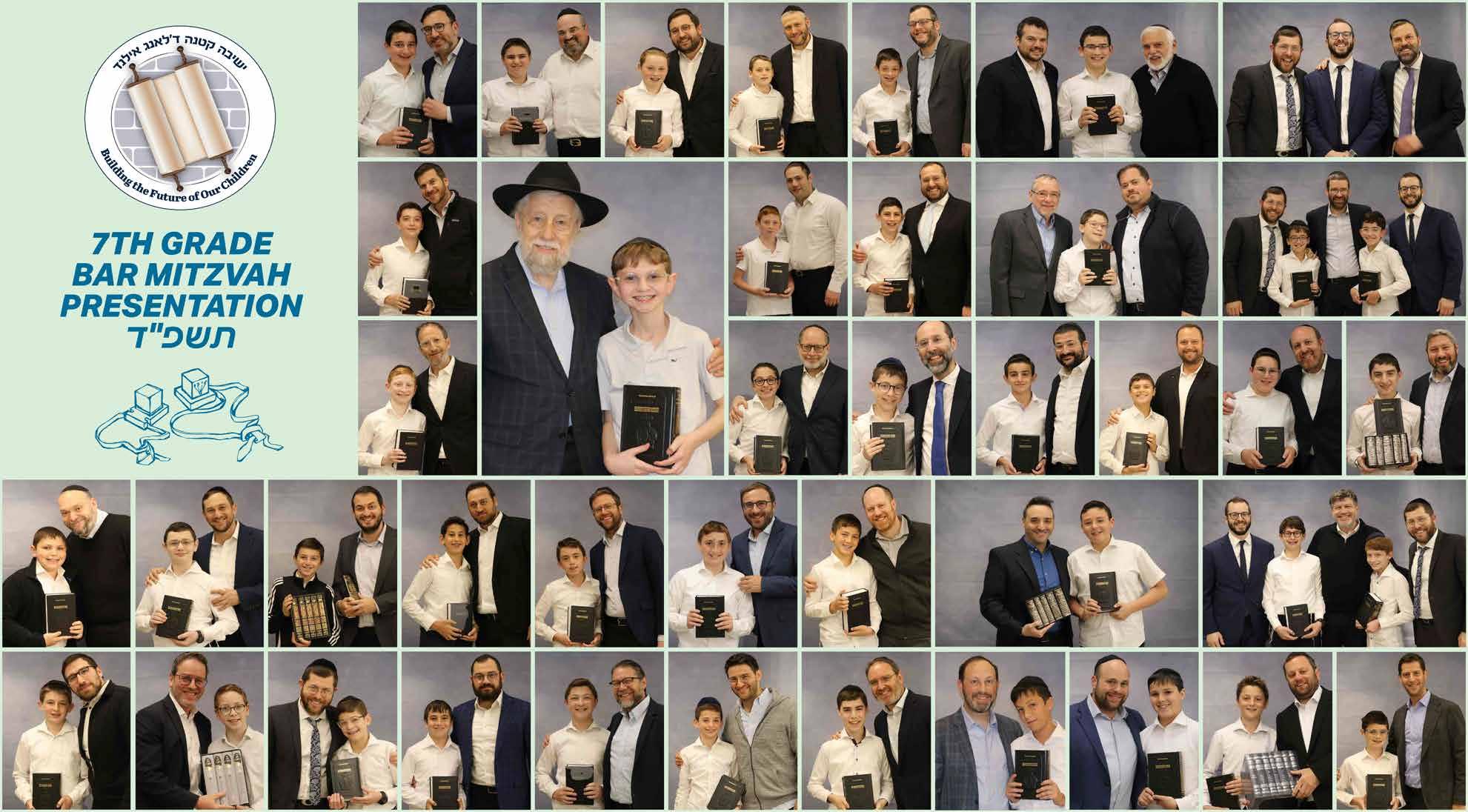

The pelvic surgery took place over the weekend at Tel Aviv Sourasky Medical Center’s Ichilov Hospital. And, yes, there were protests.
A captured Hamas terrorist who murdered innocent people on October 7 needed pelvic surgery was initially refused treatment. In the past, such procedures occurred within the prison hospital system. The Tel Aviv hospital initially refused to admit him for treatment, citing the lack of proper prearrangements. After half an hour, the ambulance turned around.
Ultimately, security officials arranged for the surgery on the suspect over the weekend – per the rotation schedule for hospitals set by the Health Ministry.
Ichilov Hospital issued the following statement: “Like all hospitals, Ichilov operates according to the directives of the Health Ministry and the government of Israel on this complex issue.”
What Would Halacha Say on the Matter?
As in all matters of halacha, the underlying issues need to be properly explored, and we must leave emotion behind. Often, the issues are not so clear-cut, and there are varied opinions among the poskim.
The underlying issue is the idea of “aiva” and its parameters. “Aiva” literally means hate. Halacha tells us that when certain actions on our part would engender an excessive, hate-filled reaction on the part of others, we can and/or must temper or change those actions on our part.
In Shulchan Aruch (YD 158:1), we find that the idea of aiva allows us to provide medical care that would save a life of someone that halacha would normally not sanction to provide for that care. Tosfos in Gittin 70a (Rav Shimi Bar Ashi) explains that Rav Shimi possibly cured such a person on account of aiva. (Imagine that a Nazi leader was shot, for example, in Hitler’s famous

Beer Hall Putsch. Would it have been permitted for Jews to provide that Nazi leader with medical care? Normally, halacha would not sanction it, but if it may lead to aiva, it would be permitted.)
In Shulchan Aruch (OC 334:26), the Remah rules that if a fire breaks out in a foreign location and a Jew is present, it is permitted to violate Shabbos and put out the fire, so that they not accuse us and the matter would lead to aiva. Now, while it could be argued that this is considered a melacha sh’aina tzricha l’gufa, it still appears to all as a full-fledged Biblical prohibition.
Terrorists are murderers of innocent people, and once cured of whatever ails them will probably go out and murder again. Yet, if terrorists are not treated, then other innocents will suffer. Other countries and enemies will refrain from providing treatment to innocent people. Therefore, we are treating them so that mankind in general will benefit.
When two doctors had the question of treating terrorists posed to Rav Elyashiv, zt”l, he ruled that they should be treated on account of aiva. His son-in-law, Rav Chaim Kanievsky, zt”l, in a separate incident, seemed to have ruled otherwise.
Regarding the mitzvah of eishes yefas toar, the Meshech Chochmah on Devarim 21:1, asks why it was necessary for the Torah to write the following italicized words in the whole verse, “When you go to war against your enemies and Hashem delivers them into your hands and you take captives, if you notice among the captives a beautiful woman and are attracted to her, you may take her as your wife.” It would have made sense to just write, “When you go to war against your enemies, and you take captives!”
The Meshech Chochmah answers that only when you have completely vanquished the enemy would it be permitted to take a captive woman as a wife. Otherwise, the enemy may also capture your women and
they may forcibly marry them against their will if they hear that you had married one of their captive women.
Clearly, not every aiva is created equally. Rav Moshe Feinstein, YD 1 #184, cites a number of sources where some aivas would permit Shabbos violation, while others would not. The Chelkas Yaakov YD #168 also differentiates between different times and places in regard to aiva. How bad is this particular aiva and will it adversely affect the way innocent people are treated in other countries and places?
The terrorists who murder and kidnap and stab and kill still have lantzmen who empathize with them in Turkey, Iran, and in other areas, too. Is it really beyond the pale of our imagination that the Iranians and the Turks would not retaliate against Jews if we refused treatment of injured terrorists? Do they so understand the evils of terrorism that they would refuse retaliation?
An argument can perhaps be made that the moral high ground that must be taken is to stand up against terror. Terrorists should realize that when they engage in the murder of innocents, they are tacitly giving up their right to be treated in the best of hospitals.
It must be understood that anytime that there is any doubt whatsoever as to whether there still remains a threat, one must be stringent and ensure that he is eliminated. A terrorist in Maaleh Adumim last year is a case in point. After the terrorist was shot a few times, he continued to get up and remained a threat. Thus, if there is any doubt whatsoever, halachically, one must keep shooting.
In most civilized societies, the law
clearly states that a person is allowed to use only as much deadly force as is necessary to neutralize that threat, and no more. If it takes five shots to do that, but six are fired, that sixth round is excessive force and is not viewed as self-defense. For the first five, you are safe. The sixth gets you a murder conviction.
Notwithstanding the illegality of it, that sixth shot does occasionally happen. In the United States, the sixth shot is to avoid lawsuits; in Israel, however, it is to avoid future murders by the stabber in question.
Rav Moshe Feinstein’s View
In 1982, this author posed a related question in writing to Rav Moshe Feinstein, zt”l.
The question was whether to be halachically branded a rodeif does the person have to be imminently pursuing killing someone? Or does a past history of doing so combined with current statements also render him a rodeif ?
Rav Feinstein’s written response was that technically he would be considered a rodeif but there are three caveats: 1) One may not violate Dina D’Malchusa Dina, the law of the land, 2) no harm, or possibility of harm can come to other citizens as a result of that course of action and a third caveat as well. Rav Feinstein concluded that since it was impossible to fulfill these three caveats, it makes no difference practically whether they are officially branded a rodeif or not.
Gemara in Sanhedrin
There is a further related issue found in the Gemara in Sanhedrin (74a) : “Haba lehorgecha hashkaim l’hargo, One who comes to kill you, arise earlier and kill him.”
This passage in Sanhedrin, however, begs a number of questions:
• Is this dictum considered to be halacha? Or is it merely good advice?
• Is it obligatory or is it optional?
• Is there a difference between this concept and the concept of a rodeif – a pursuer?
• Also, what is the exact source for this dictum? Usually, the Talmud appends a verse to a dictum such as this one, and yet here there isn’t one.
The Midrash Tanchuma (Parshas Pinchas 3) indicates that source of haba lehorgecha emanates from the verse in Bamidbar (25:17) regarding the Midianites where it says, “Tzror es haMidyanim vehikisem osam, afflict the Midianites and strike them.” It seems from the Midrash Tanchuma that this is obligatory and not voluntary, since it is a verse in the Torah.
Obligatory or Optional?
Rav Yitzchok Halperin in his Maaseh Choshaiv (Vol. III p.141) writes that it is, in fact, not obligatory but optional. He does not mention Tzror es HaMidyanim as a source, however.
tual time when he is trying to kill you. If it is not during this time, then this is optional. The suggestion is somewhat perplexing because all cases of “waking up early to kill him” perforce deal with a case where it is not during the actual time. The “obligatory”
Is it really beyond the pale of our imagination that the Iranians and the Turks would not retaliate against Jews if we refused treatment of injured terrorists?
The former Chief Rabbi of Tel Aviv in his Assei Lecha Rav (Vol. IV p.35) follows the view that it is obligatory but qualifies the idea of it being obligatory as only when there is certainty that the enemy will attack. He distinguishes between the obligation of seeing a rodeif in pursuit of his victim and the law of “one who comes to kill you.”
His distinction is that the latter only applies when it is definite that he will try to kill you. In such an instance, there would be an obligation to kill him.
Question From Shmuel Aleph
We do find, however, that in Shmuel I (Chapter 24), King Shaul was in pursuit of the future King David and would have killed him. Dovid, however, spared Shaul – only cutting his clothing. Certainly, Shaul would have killed him – why then did Dovid spare him, according to the Tel Aviv chief rabbi? He should have been obligated to kill him!
HaRav Boruch Dov Povarsky, zt”l, in his shiurim on Sanhedrin cites the Gemara in Sanhedrin (74a) that the law in regard to a rodeif is only if it is impossible to stop him in another manner. There is therefore an essential difference between the law of rodeif and the law of haba lehorgecha. If someone is coming to kill you, then you may kill him without worry about stopping him in some other manner, and you are completely exempt. The law of rodeif, however, limits an observer in killing the pursuer in a number of ways. If he could have stopped him in some other way, then he might, in fact, be liable.
The Minchas Asher (Shmos #39), in trying to resolve the question on King David, suggests another caveat to the laws of haba lehargecha, even according to the opinion that it is obligatory. He writes that it is only obligatory to kill him if it is during the ac-
nature of it would thus never be practically relevant, according to the Minchas Asher.
This author would like to propose an altogether different caveat. The laws of “waking up early to kill him” might be limited by another factor. That factor is the following question: What are the ultimate repercussions of killing this person? If Dovid HaMelech killed Shaul the King, the repercussions would reverberate in Jewish
history for thousands of years. That being the case, it would not be obligatory but would be optional.
Our question might be limited by this factor, too. What are the ultimate repercussions of killing this stabber? If it may be too devastating, then the normally obligatory nature of “arise early and kill him” changes and becomes optional or, in our case, forbidden because of the Law of the Land is the Law.
Rav Yitzchok Zilberstein relates (Shiurei Torah L’Rofim Siman 289) a story that may impact the question as well. He relates a story from the Beis HaLevi. The issue of reinstituting the Korban Pesach had come up. The Beis HaLevi explained that he could probably find a halachic solution to all the outstanding halachic issues, however, due to the hate that will cause Muslims to feel toward Jews who would now be sacrificing once again on Har Habayis and the subsequent violence done to Jews, to that, he can find no heter!
May Hashem remove the rotzchim and bring us yeshuos and nechamos!
This article should be viewed as a halachic discussion and not practical advice. The author can be reached at yairhoffman2@gmail.com.

R’Aryeh Tzvi Frumer (1884-1943), the Kozhiglover Gaon, succeeded R’ Meir Shapiro as Rosh Yeshivah of Yeshivas Chachmei Lublin.1 He authored the sefer She’eilos U’Teshuvos Eretz Tzvi, in which he records a chiddush he developed while visiting Meron in 1935.
In Parshas Vayechi, Yaakov Avinu tells his sons, “Naftali ayalah sheluchah ha’nosein imrei shafer, Naftali is a hind let loose who delivers beautiful sayings” (Bereishis 49:21).
Targum Onkelos explicates Yaakov’s words: “ The lot of Naftali will fall on a good land. His inheritance will yield fruit; he will give thanks and blessings over them.” That is, Naftali’s lands will produce excellent fruit, and he will thank Hashem and recite brachos over them.
The Kozhiglover Gaon wonders how Yaakov could be referring to reciting brachos over fruit. The brachos that we recite before enjoying food are Rabbinically mandated; they are mi’d’Rabbanan. How can we interpret a pasuk in the Torah as referring to a Rabbinic requirement?
The Kozhiglover Gaon explains that while it is true that Talmud Bavli understands brachos to be mi’d’Rabbanan, the Zohar disagrees. Brachos, according to the Zohar, are Biblically mandated. They are mi’d’Oraisa.
The majority of the world follows the ruling of the Bavli that brachos are mi’d’Rabbanan. However, Meron, the city of R’ Shimon bar Yochai, is the exception. There, the psak follows their Mara D’Asra, whose rulings are recorded in the Zohar, that brachos are mi’d’Oraisa. Meron is located in Shevet Naftali’s chelek in Eretz Yisrael. Thus, Onkelos’s interpretation of the pasuk pertaining to Naftali is illuminated. Even though brachos are mi’d’Rabbanan elsewhere, the city of Meron, in the allotted portion of Shevet Naftali, follows the Zohar’s psak that brachos are Biblically mandated. Yaakov’s statement regarding the Biblical recitation of brachos was specifically referring to the portion of Naftali.
Great talmidei chachamim thus arrived at wonderful Torah insights when visiting the holy kever of Rashbi on Lag Ba’Omer. We will learn about another wondrous insight that was reached when visiting R’ Shimon on Lag Ba’Omer.
In Maseches Brachos, R’ Yishmael explains why the Torah needs to tell us “v’asaftah d’ganecha, that you

may gather in your grain” (Devarim 11:14). The Navi instructs: “This Book of the Torah shall not depart from your mouth” (Yehoshua 1:8). The implication is clear. A person should always be learning Torah, and he should not be otherwise occupied. This verse indicates that one should study Torah full time.
The Torah therefore tells us v’asaftah d’ganecha, teaching that the proper way to live one’s life is by fusing Torah and derech eretz. Torah is to be coupled with a source of livelihood. The Gemara instructs, in addition to learning Torah, one must conduct himself in the usual manner of the world, which is to seek gainful employment.
R’ Shimon bar Yochai, however, expresses incredulity at this position. How can a person who is busy with his occupation possibly be properly engaged in limud haTorah?
Is it possible that a person plows in the plowing season and sows in the sowing season and harvests in the harvest season and threshes in the threshing season and winnows in the windy season [as grain is separated from the chaff by means of the wind], and is constantly busy; what will become of Torah? How can someone master the Torah if he is preoccupied with the multitude of tasks required for his livelihood? Therefore, R’ Shimon postulates that when Klal Yisrael are maintaining a high standard in their avodas Hashem, they will be able to learn steadily, and any necessary tasks will be performed for them by others. V’asaftah d’ganecha, says R’ Shimon, will be invoked only when Klal Yisrael are not worthy of receiving Hashem’s bounty. When they do not adhere to Hashem’s ratzon, it will be necessary for them to be involved in performing the mundane tasks needed for their support. Going to work implies that a person places himself in the category of those who are not osim retzono shel Makom, not doing the will of Hashem.
R’ Shimon bar Yochai and R’ Yishmael disagree as to whether a person should step out of the walls of the beis midrash to earn a livelihood, or if the proper approach is to remain in learning full time in lieu of seeking employment. R’ Yishmael holds that one is required to earn a living, and R’ Shimon rules that one should not; he should continue to learn Torah exclusively, since that is the only way to master the Torah.
Minimum Torah
“And
showbread before Me at all times” (Shemos 25:30).
Maseches Menachos teaches that the Lechem HaPanim must continuously remain on the Shulchan . When the Lechem HaPanim are replaced with fresh loaves, the transition is performed in a manner that never leaves the Shulchan bare. The Kohanim would slide the new lechem into place just as the loaves being removed were withdrawn. We learn this from the Torah’s use of the word “tamid.”
R’ Yose disagrees. He opines that the bread can be removed in the morning and replaced in the evening. The Torah’s stipulation “tamid ” means only that the Shulchan cannot be left all night without Lechem HaPanim. As long as the Lechem HaPanim of the previous week remained on the Table at some point during the day and the bread of the new week was placed on the Table at some point during the night, the term tamid, continuously, has been fulfilled.
Rav Ami extrapolates a novel understanding of the mitzvah of talmud Torah from this statement of R’ Yose. As noted above, we are taught that words of Torah must always be on our lips. Just as regarding the Lechem HaPanim the instructive word “tamid ” does not mean “always,” but, rather, that no full day or night passes without the Lechem HaPanim on the Table — so, too, a person can fulfill the commandment of “this Book of the Torah shall not depart from your mouth; rather you shall contemplate it day and night” (Yehoshua 1:8), by ensuring that no full day or night passes without the study of Torah. That would still be considered tamid.
Rav Yochanan then quotes R’ Shimon bar Yochai, who is even more lenient about the requirements of daily Torah learning. R’ Shimon maintains that a person can meet his quota of daily Torah study by simply reciting Krias Shema in the morning and evening.
The Keren Orah points out that R’ Shimon’s statement that the twice-daily recitation of Shema suffices to fulfill the limud haTorah requirement for the day seems to contradict the statement of R’ Shimon in Maseches Brachos. There, R’ Shimon interprets the pasuk “lo yamush sefer ha’Torah ha’zeh mi’picha” quite literally. One must always be learning Torah, day and night! Each and every moment must be utilized in the study of Torah. Even something as significant as earning a livelihood must be pushed aside to enable the
study of Torah. One must forgo all other pursuits and adhere to the Navi’s instruction to never allow one’s mouth to cease learning Torah.
How then can R’ Shimon, in Menachos , rule that reciting Shema twice daily adequately fulfills the daily requirement of Torah study? According to his stance in Brachos , one should be required to spend the entire day ensconced in the beis midrash, studying Torah, to fulfill his chiyuv talmud Torah!
The Sdei Chemed, R’ Chizkiyahu Medini, raises the same question. He offers an approach based on the Shach, who writes that the statement in Maseches Menachos was not in fact made by R’ Shimon bar Yochai. In this instance, the acronym Rashbi is instead referencing another Tanna, R’ Shimon bar Yehotzadak. The Chida points out that this coincides with the girsa, textual version, that is found in the She’iltos
R’ Shimon bar Yochai indeed maintains that one must use all his time to study Torah. V’hagissa bo yomam v’laila (Yehoshua, ibid.) should be interpreted literally: One must engage in the study of Torah all day and all night. The Gemara’s statement that one can fulfill his daily Torah obligation by merely reciting Shema was the opinion of R’ Shimon bar Yehotzadak, who disagrees with R’ Shimon bar Yochai.
Let us explore an alternative approach to reconcile the apparent contradiction between the two statements of R’ Shimon bar Yochai.
The classic story of R’ Shimon bar Yochai hiding in the cave appears in Maseches Shabbos . Its placement there is not coincidental.
The Sar Shalom of Belz related at his Lag Ba’Omer seudah that the Zohar tells us that R’ Shimon bar Yochai is deeply connected to and identified with Shabbos — he is biv’chinas Shabbos. This is why the incident of his hiding in a cave is related in Maseches Shabbos Furthermore, the incident is presented on daf 33 amud beis — a remez to Lag Ba’Omer. Even more incredibly, this statement of R’ Shimon bar Yochai is the 33rd time he is mentioned in Shas! There, the Gemara relates that R’ Yehudah commented about the impressive accomplishments of the Romans. He complimented the marketplaces, bridges, and bathhouses they constructed. R’ Yose remained silent, while R’ Shimon bar Yochai disagreed. He countered that anything the Romans built was purely for their own enjoyment.
The Gemara relates that R’ Shimon’s comments came to the attention of the Roman authorities, who issued a warrant for his arrest and execution. Fearing for his life, he fled, together with his son, R’ Elazar. They initially concealed themselves in the beis midrash, where R’ Shimon’s wife brought them food and drink. Over time, the search for R’ Shimon intensified, and he was concerned that under duress, his wife would inform the Romans where they were hiding. Without informing his wife of their destination, R’ Shimon and his son fled and hid in a cave. A carob tree miraculously grew and provided them with food.
A freshwater spring appeared and supplied them with drinking water. They spent their days learning Torah while covered in the sand on the floor of the cave, donning their clothing only to daven.
They remained there for twelve years, leaving the cave only after Eliyahu HaNavi informed them that the Caesar had died and the death sentence had been rescinded.
As they made their way home, they were appalled to see people engaged in mundane tasks. When they witnessed farmers plowing and planting, they wondered how people could forsake the eternal reward earned by learning Torah and prefer to use their time merely to support and sustain their mortal existence. Everything they gazed upon in this critical fashion was immediately consumed by fire. A Bas Kol, Heavenly Voice, instructed them to return to the cave and not destroy Hashem’s world.
After spending an additional year in the cave, they contemplated leaving, since even the wicked don’t spend more than a year in Gehinnom. At that point, they were again privy to a Bas Kol, now advising them that they could indeed exit the cave. This time, R’ Shi-
Great talmidei chachamim thus arrived at wonderful Torah insights when visiting the holy kever of Rashbi on Lag Ba’Omer.
mon repaired anything that was destroyed by R’ Elazar’s critical gaze.
R’ Shimon’s support for the full-time study of Torah and abandoning all worldly pursuits is abundantly clear from this Gemara and is consistent with his comments in Maseches Brachos
There is another teaching of R’ Shimon that must be examined in this context. The Gemara in Nedarim states: “R’ Shimon [bar Yochai] would carry a basket on his shoulder and proclaim, ‘Labor is great because it accords honor to the laborer.’” Working is thus described as honorable and commendable!
The Maharatz Chayes wonders about this statement of R’ Shimon, which seems to be in direct opposition to the statements he made when he exited the cave and when, in Maseches Brachos, he maintained that one should not engage in earning a livelihood.
The first time he left the cave, R’ Shimon wondered: “These people abandon the eternal life of Torah study and engage in temporal life for their own sustenance?” In Bracho s, as noted above, R’ Shimon wondered how anyone could possibly hope to properly learn Torah while simultaneously engaged in earning a livelihood, stating, “Is it possible that a person plows in the plow-
ing season and sows in the sowing season… what will become of Torah?”
If learning Torah is the singular way one should utilize his time, and it is unworthy and inappropriate to pursue worldly matters, then how, in Nedarim, can R’ Shimon declare that it is admirable to engage in melachah?
The Maharatz Chayes explains that R’ Shimon’s basket mentioned in the above quotation was not a tool with which to engage in manual labor. It was his chair. He turned the basket over and used it to sit on in the beis midrash.
However, as discussed above, this viewpoint of the imperative to be engaged in the full-time occupation of Torah study seems to contradict the position of R’ Shimon in the Gemara in Menachos, where he is quoted as saying that reciting Krias Shema does, in fact, suffice to minimally fulfill the daily obligation of talmud Torah.
The Sdei Chemed provides a novel explanation to understand these contradictory statements of R’ Shimon: One opinion was issued before R’ Shimon heard the Bas Kol ordering him to return to the cave, and the other was the viewpoint he maintained after he heard the Heavenly Voice.
Initially, R’ Shimon felt that spending time on anything other than the study of Torah was a waste of time and energy. When he initially emerged from the cave, he could not fathom that people could abandon limud haTorah in favor of mundane activities. Hashem was unhappy with this approach, and a Bas Kol reprimanded R’ Shimon for destroying the physical world that Hashem had created, instructing him to return to the cave.
The Gemara relates that when he exited the cave for the second time, he encountered a man rushing home on Erev Shabbos. He was carrying two bundles of hadassim, myrtle branches. R’ Shimon asked him why he had two bundles, when one would surely suffice for k’vod Shabbos. The man replied that one is in honor of Shamor, the mitzvah to avoid chillul Shabbos, and the other was for Zachor, the mitzvah to perform the mitzvos unique to Shabbos.
R’ Shimon turned to his son and said, “See how beloved the mitzvos are to Klal Yisrael.”
R’ Shimon clearly had a change of heart after being reprimanded by the Bas Kol and spending an additional twelve months in the cave. He had come to recognize that Hashem had placed human beings into a physical environment in which it was necessary for them to work, to earn a living, and to attend to their material needs. The money they earned could be used to honor Shabbos and to perform countless other mitzvos.
The Sdei Chemed resolves the apparent contradiction — and the question of the Maharatz Chayes — by demonstrating that although both comments were made by R’ Shimon, they were reflections of his opinion at different points in his life. At first, R’ Shimon maintained that one must be occupied in full-time Torah study; otherwise, as he taught in Maseches Brachos, “Torah mah tehi aleha, what will become of the Torah?” Being engaged in work to earn a living would be an absurdity: How is it possible for people to make such an inappropriate choice? That was before he spent twelve
years in the cave and was instructed by the Heavenly Voice to return. After he was reprimanded by the Bas Kol for taking such a critical approach to the path of earning a livelihood, R’ Shimon retracted his original view and now maintained, as recorded in Maseches Menachos, that one can minimally fulfill his obligation to learn by reciting Shema in the morning and the evening. R’ Shimon now even went so far as to say, “Melachah is great because it accords honor to the laborer.”
Maseches Brachos relates in the name of Abaye that many people strove to live their lives according to the [initial] opinion of R’ Shimon, yet they were unsuccessful in their efforts. On the other hand, many conducted themselves according to the opinion of R’ Yishmael, combining Torah study with earning a parnassah, and they were abundantly successful.
The Brisker Rav understands this Gemara to be issuing a psak halachah, a halachic ruling. Normative Jewish practice is hanhag ba’hen minhag derech eretz. That is, in general, it is recommended for one to study Torah while also supporting one’s family.
It is commonly accepted that the kabbalah, the mystical teachings, of the Arizal is greater than that of R’ Moshe Cordovero, the Ramak. The Rema MiFano writes that the Ramak can be likened to pshat, the simple explanation, while the Arizal is the sod, hidden meaning. Furthermore, R’ Chaim Volozhiner writes in the name of the Vilna Gaon that where the kabbalah of Ramak ends, that is where the kabbalah of the Arizal begins.
The Shevilei Pinchas records that when he visited Meron in 2004, while standing between the tziyun of R’ Shimon and that of his son, the Tanna R’ Elazar, he contemplated a machlokes between the Ramak and the Arizal.
The Sefer Geirushin was authored by R’ Moshe Cordovero in the year 1548. It contains the Torah novella he innovated in his self-imposed exile. Therein, he describes a visit he paid to the beis midrash of R’ Shimon bar Yochai and his son, R’ Elazar. He offered a short tefillah, after which his rebbi, R’ Shlomo Alkabetz, shared several chiddushei Torah
R’ Moshe notes that he was able to see the kever of R’ Elazar in the south, while R’ Shimon’s was in the opposite direction, to his left. R’ Moshe declared that R’ Shimon represented the middos of din and gevurah, strength and judgment, as it says in the Zohar R’ Elazar, on the other hand, represented Middas HaChessed, kindness. This is alluded to in his name Elazar — a contraction of Kel, Hashem, azar, helps
The Arizal in Sefer HaGilgulim takes a different approach: R’ Elazar represents Middas HaDin and R’ Shimon corrected and sweetened this Middas HaDin with rachamim. The Rema MiFano,

too, posits that R’ Shimon represents the middah of chessed, kindness. When they exited the cave for the second time, everything that R’ Elazar judged to be inappropriate and thus worthy of destruction was rectified by R’ Shimon.
R’ Pinchas Friedman writes that when he was in Meron in 2014, he sought to clarify this apparent disagreement between the Arizal and R’ Moshe Cordovero as to who represented Middas HaDin and who represented Middas HaRachamim and chessed.
The Shevilei Pinchas explains: Eilu v’eilu divrei Elokim chaim, both are correct. R’ Shimon initially was indeed gevurah. He originally represented Middas HaDin. This is apparent from his comment about the Romans acting only to benefit themselves. It was his Middas HaDin that prompted him to criticize the Romans. At that time, R’ Elazar was chessed; it was R’ Shimon who was din.
ther led to him adopting the Middas HaDin of R’ Shimon. He incorporated it into his persona, becoming more inclined toward employing the Middas HaDin rather than Middas HaRachamim.
This approach to reconciling the teaching of the Ramak with that of the Arizal gives further insight into the proposal of the Sdei Chemed to explain the various teachings of the Rashbi that are found in Shas regarding earning a livelihood.
In Maseches Brachos, where R’ Shimon states that it is impossible for someone to be properly engaged in Torah and perform a job at the same time, that thought was expressed before he spent his time in the cave, when he had a worldview seen through a prism of Middas HaDin. At that time, as taught by R’ Moshe Cordovero, R’ Shimon espoused strict judgment.
During those thirteen years, he came to appreciate the supremacy of the thirteen Middos HaRachamim, with which he sweetened the Middas HaDin and brought great chessed and rachamim to the Jewish people.
The Bnei Yissaschar in Agra D’Kallah writes that the first word of the Torah, Bereishis, is an acronym for many hidden ideas. One interpretation is that it stands for: ohr Torah R’ Shimon bar Yochai, the light of the Torah of R’ Shimon bar Yochai , who Hashem sent to illuminate the world with his Torah.
Our Sages teach that in the beginning, Hashem sought to create the world with Middas HaDin. Thus, R’ Shimon, who is representative of Middas HaDin, is appropriately hinted at in the word Bereishis. When R’ Shimon learned with R’ Elazar, the paragon of Middas HaChessed, for so many years, he too began to embrace Middas HaChessed and rachamim. R’ Elazar’s character influenced R’ Shimon and led him to reflect on the middos of chessed and rachamim. The opposite happened to R’ Elazar. Initially, he was Middas HaRachamim, but learning with his fa-
The Gemara in Menachos , where R’ Shimon teaches that one can minimally fulfill his daily requirement of limud haTorah with the recitation of Shema, and the Gemara in Nedarim, where he states that melachah is to be commended, were said after he left the cave with a revised outlook. Having incorporated Middas HaRachamim, his statements reflect this change of heart. This is in accord with the teachings of the Arizal and the Rema MiFano that R’ Shimon represented the primacy of Middas HaRachamim. As a rule, the Middas HaDin can be changed, it can be sweetened, only from within. Only din could change itself to incorporate rachamim Le’asid lavo, it will be Yitzchak Avinu, the paragon of din, who will arouse mercy on Klal Yisrael by making a pact with Hashem. He will bargain: Palgi alai v’palgi alecha; he will tell the Ribbono Shel Olam that he, Yitzchak, will bear the onus for half the sins of Klal Yisrael if Hashem would shoulder the other half. Only he is capable of sweetening the judgment because he represents din
It is known that Mincha on Shabbos is the ultimate time of rachamim. This is because Mincha is usually a time designated for din. But on Shabbos, when din is suspended and replaced by rachamim, it becomes the time of the week most suited for rachamim. Similarly, R’ Shimon, who was originally the very essence of Middas HaDin and gevurah when he entered the cave, was uniquely qualified to “be mamtik,” to sweeten, the din from within.
R’ Pinchas Friedman suggests that this illuminates the significance of why R’ Shimon specifically spent thirteen years in the cave. During those thirteen years, he came to appreciate the supremacy of the thirteen Middos HaRachamim, with which he sweetened the Middas HaDin and brought great chessed and rachamim to the Jewish people.
1 My great-grandfather, R’ Yehudah Leib Wolman, Hy”d, the last Rav of Sochatzew, was a student of the Eretz Tzvi
After much pleading from my wife, I agreed to take my children to the barber. The last child to get his haircut was behaving rather well, when suddenly, the screaming started. I ran over and saw that the barber had cut my son’s ear. There was plenty of blood, but it looked much worse than it really was.
My wife contacted the family doctor for advice on how to proceed. The question was whether the injury warranted stitches. I walked out of the barbershop and told my wife that I was not paying for the haircuts. My wife instructed me otherwise.
So I declared, “Well, at least I am not going to pay for that last haircut.” Once again, my wife disagreed.
“Well, I am not giving any tips!”
My wife said, “No. You should give the tips.”
So I said, “Well, I am certainly not going to tip the barber who cut my son’s ear.”
My wife replied, “Please tip that barber as well.”
So I went inside to pay for all the haircuts and to tip the barbers. In the end, the proprietor insisted that the haircuts were on the house, but I did tip the barbers.
At the time, I was quite upset, but I realized that my wife was correct. The barber did not intentionally nick my child and probably felt horrible. The incident is reminiscent of the following story mentioned in Bava Metzia (83a).
Rabbah Bar Bar Chana hired workers to transport barrels of wine for him. The workers were negligent, and the barrels broke, causing Rabbah a huge loss. The workers were liable for the negligent actions, so Rabbah seized their cloaks as restitution. The workers went to the great Amora known as Rav to complain.
Rav directed Rabbah to return their cloaks. Rabbah asked Rav, “Is that the law? These workers were negligent!”
Rav said, “Yes, indeed. The verse

states, ‘In order that you travel on the road of the good’ (Mishlei 2:20).” Rashi explains that Rav was directing Rabbah to go beyond the letter of the law. True, the workers were negligent, yet the actions were unintentional. Therefore, Rav felt that the proper course of action was to forgive their negligence but forgo payment.
The workers persisted and complained to Rav. “We are poor. We worked the entire day on this project. We are hungry, yet we have nothing.” Whereupon Rav directed Rabbah to pay the workers their expected wages.
Rabbah asked Rav, “Is that the law? Should I pay for labor that in the end did not benefit me at all?”
Rav answered “Yes. The verse states, ‘And the path of the righteous you shall guard’ (ibid.).”
The Vilna Gaon explains that the first part of the verse is referring to good people who are willing to forgive people who incurred debts to them. This is a wonderful attribute, and fortunately, it is not that rare. Therefore, the verse describes this conduct as the “road of the good.” However, to actually take mon-
ey out of one’s pocket and pay money to people who are not legally entitled to it is indeed rare. Only tzaddikim have this attribute. That is why the verse refers to this conduct as the “path of the righteous.” A path is not well-traveled, as opposed to a road, which is a busy thoroughfare.
Further, this path is taken only by the righteous. When one conducts his business affairs according to a higher standard than others, he must constantly be on guard. He may be tempted to just follow the crowd and reason that he should not have to act more scrupulously than everyone else. Therefore, the verse states, “And the path of the righteous you shall guard.” If someone indeed achieves a higher level of righteousness, he must constantly guard himself to ensure that he maintains it.
The Chida questions Rav’s response to Rabbah. Rabbah asked Rav if it was indeed the law that he had to pay or return the cloak. Rav should have answered, “No, it is not. But it would be a nice thing to do.”
The Chida explains that a righteous
individual is obligated to live by a higher standard. Rav indeed felt that a great sage such as Rabbah should conduct himself according to a higher standard; for Rabbah, this conduct is not optional, but rather expected.
The story in the barbershop is significantly different from Rabbah’s story. I benefited from all the haircuts and was obligated to pay. However, the Gemara teaches us the level we should strive for – we should try to be a cut above the rest.
In conclusion, it is appropriate to cite the Chofetz Chaim in Sefer Shemiras HaLashon (Shaar HaZechirah, 2nd perek). The following is a loose translation:
“If one conducts himself with others to never forgive an iota of what he is due, and to not have compassion on them, he strengthens the strict attribute of justice on the entire world and himself. Because in Heaven they will likewise treat him in kind and not forgive an iota of his sins. This is the intent of the passage in Bava Metzia (30b), ‘Yerushalayim was destroyed because they followed the strict law and refused to go above and beyond the letter of the law.’
How could this be? The verses clearly state there were other sins. Yet now it is understandable. In spite of their sins, Hashem would have dealt compassionately with them if only they had done the same to others. However, the people conducted themselves strictly according to the letter of the law, never budging an inch. Hashem therefore dealt with them in kind.”
We should merit the rebuilding of the Beis HaMikdash very soon.
Rabbi Avrohom Sebrow is a rebbe at Yeshiva Ateres Shimon in Far Rockaway. In addition, Rabbi Sebrow leads a daf yomi chaburah at Eitz Chayim of Dogwood Park in West Hempstead, NY. He can be contacted at ASebrow@gmail.com.
The group was returning from the opening ceremony for a dam on the border between Iran and Azerbaijan. But traveling by helicopter through dense fog in the mountainous region of East Azerbaijan province in northwestern Iran proved to be tricky – and fatal.
On Sunday, May 19, Iranian President Ebrahim Raisi, Foreign Minister Hossein Amir-Abdollahian, and six other passengers and crew crashed in the mountains. It took authorities a significant amount of time to find the wreckage and declare them all dead.
Within days, the Iranian regime announced new elections to fill Raisi’s spot to be set for June 28. In the interim, Supreme Leader Ayatollah Ali Khamenei appointed Raisi’s first vice president, Mohammad Mokhber, as interim president. Mokhber had close ties to the supreme leader and to the powerful Islamic Revolutionary Guard Corps (IRGC) but was not viewed as a potential contender for the presidency.
Raisi’s death leaves many with the question: will his demise impact the Persian regime and world affairs?
The short answer to that question is no.
But longer term, it is possible that the country may begin to change without Raisi on the chessboard.
It is important to understand that the president of the Islamic Republic does not really make any decisions.
That privilege is held by the Supreme Leader. The president is merely someone who implements the ayatollah’s policies. As such, many of the policies presented by Iran now will not change with Raisi out of the picture.
In Iran, the Supreme National Security Council (SNSC) is the highest body in charge of foreign policy and national security. As chair of the council, the president can influence debates and play a role in setting the agenda. But the president still needs to work to form consensus with 11 other permanent members with high-ranking military, political, or ministerial positions. Ultimately, SNSC decisions must be approved by the Supreme Leader.
It’s possible that Iran will refrain from making significant moves – such as sending missiles to Israel –until a new president is voted in. It may also delay new diplomatic initiatives given that the foreign minister was also killed.
Since Amir-Abdollahian also died in the crash, one of Mokhber’s first acts as interim president was appointing Ali Bagheri Kani, the deputy foreign minister for political affairs, as acting foreign minister.
Bagheri Kani is not new on the Iranian political scene. He had been the lead nuclear negotiator under Raisi, although the hardliner was a vocal critic of the
 By Su S an Schwamm
By Su S an Schwamm
2015 nuclear deal. Just a few weeks ago, Bagheri Kani reportedly held indirect talks with Brett McGurk, the White House coordinator for the Middle East and North Africa, on deescalating regional tensions. But a meeting between Bagheri Kani and EU officials that was scheduled for May 22 was reportedly canceled after the helicopter crash.
Raisi had been called “The Butcher of Tehran” –and for good reason. He is most recently connected to the executions of 500 people during the 2022 protests that broke out after the death of Mahsa Amini, a 22-year-old Kurdish woman who had died while in prison for not wearing her hijab correctly. Protests that lasted for three months rocked the country. Raisi was brutal in his crackdown on protesters. Under his watch, hundreds were killed – including minors –and more than 22,000 people were detained.
But the 2022 protests weren’t the only reason for Raisi’s reputation for brutality.
Before he was elected president, Raisi’s hands were stained with blood as far back as 1988. A 28-year-old prosecutor at the time, Raisi was one of four members on the “death commission” that ordered the deaths of more than 4,000 political prisoners in mass sham trials. He was the member of the commission that purportedly planned and organized the brutal executions.
Raisi became a more public name in Iran around a decade ago. In 2016, Raisi was appointed by Supreme
Leader Khamenei to head the Imam Reza foundation, one of Iran’s wealthiest religious endowments – with no government scrutiny and answerable only to Khamenei. It is estimated that the fund was worth tens of billions of dollars at the time of Raisi’s death. Raisi ran for president in 2017, losing to incumbent Hassan Rouhani. In turn, in 2019, Khamenei appointed him as Iran’s chief justice. The United States sanctioned him that year for involvement in domestic repression.
In 2021, Raisi ran again for the presidency, earning 62 percent of the vote. But the victory was hollow, as the turnout at the polls was the lowest for a presidential election in the history of the Islamic Republic. Raisi also ran basically unchallenged due to vetting by the powerful Guardian Council.
As president, Raisi had pledged to fight corruption, build one million affordable housing units per year, create one million jobs per year, control prices of goods, and reduce inflation. But much of campaign pledges were bluster, and he made limited progress on achieving those goals because of strict U.S. sanctions imposed on the regime and also due to mismanagement. For example, in 2022, his administration botched an attempt to reform subsidies for basic imports, including wheat, triggering a spike in bread prices and protests.
By February 2024, his government managed to bring inflation down to 35 percent – the lowest level in two years – but it still fell short of his goal of lowering it to 30 percent. The average Iranian, at the time of Raisi’s



death, was still struggling, grappling with high prices, a weak currency, high unemployment, and cuts in state social services.
when it came to foreign policy, Raisi may have been a bit more successful. When he took office, he had barely any foreign policy experience. But Raisi had his eyes set on expanding ties with China and Russia, which he ultimately did.
Iran supported Putin’s invasion into Ukraine in February 2022, becoming Russia’s top military backer and providing Moscow with more than 1,000 Shahed series suicide drones as well as artillery and tank rounds. Facing U.S. sanctions, the two nations forged tighter economic ties. Russia eventually overtook China as the largest foreign investor in the Islamic Republic.
Iran also turned to China during Raisi’s reign. In 2023, Raisi became the first Iranian leader to make a formal visit to Beijing in more than 20 years. During that visit, he signed 20 agreements that could be worth billions of dollars. Under Raisi, China became Iran’s top trade partner and an economic lifeline. In 2023, Iranian oil exports were up by 50 percent, a five-year high, at 1.29 million barrels per day. The vast majority of exports eventually went to China, often through intermediaries.
Within the past two years, Iran, under Raisi, joined two economic blocs that brought Iran closer to China and Russia. In July 2023, Iran was formally admitted as the ninth member of the Shanghai Cooperation Organization, a security and economic organization led by China and Russia that also includes Central and South Asian countries. In January 2024, Iran became

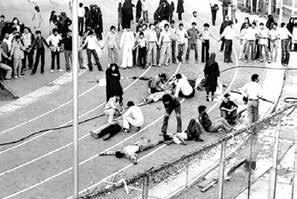

a member of the BRICS bloc of emerging economies — Brazil, Russia, India, China and South Africa. Together, the five nations represented approximately a quarter of the world’s economy and more than 40 percent of the world’s population.
Last year, in a move that shocked many, Saudi Arabia – a staunch enemy of Iran – agreed to restore diplomatic ties with Iran in a China-brokered deal. The Islamic Republic and the Gulf kingdom affirmed their respect for the “sovereignty of states” and “non-interference in internal affairs.” This was not a simple agreement. For years, Iran – led by Shia clerics – and Saudi Arabia –ruled by Sunni monarchs – had clashed over regional conflicts, particularly in Syria and Yemen.
In 2018, the United States, under President Donald Trump, unilaterally withdrew from the Iran nuclear deal. The Biden administration endeavored to revive the agreement, although attempts ultimately collapsed under Raisi. The lifting of U.S. sanctions would have helped to lift Iran’s economy, but Raisi seemed to feel more comfortable dealing with China and Iran on economic and military matters than opening doors to the United States.
more important than who will replace Raisi as president are the rumors swirling around the position of Supreme Leader. While Khamenei is firmly filling that chair, he is hardly a youngster. At 85 years old, thoughts of his successor have certainly been filling his mind.
Raisi had seemed a likely pick to take over for Khamenei eventually. His resume checked all the boxes:
a cleric, former chief justice, former head of a massive foundation, and president of Islamic Republic. Khamenei himself had been president of Iran from 1981 to 1989 and then became Supreme Leader in 1989.
If Raisi would be alive and would take over Khamenei, there would be no expectations of deviations of policy in Iran. Raisi’s views had echoed Khamenei on almost every major topic, and he was a dutiful follower of Khamenei’s directives.
Mojtaba Khamenei, the Supreme Leader’s son, is thought to be a likely contender to take over for his father. Mojtaba is not the most sterling candidate, though. He has never held an official position and lacks top religious credentials.
Even more than that, the leaders of the Islamic Revolution vehemently opposed any system that resembled a monarchy, with father to son succession. If Mojtaba would succeed his father, whiffs of nepotism may just whip the masses into skepticism over the Supreme Leader’s role.
Mojtaba has close connections with the Revolutionary Guards and the Basij paramilitary, which may have significant influence over the succession. The Revolutionary Guards controls a vast network of companies involved in arms, energy, construction, telecommunications, mining and many other sectors. It would stand to gain if the next Supreme Leader depends on it for support.
It is likely that, with Raisi out of the picture, Iran will see serious infighting and numerous backroom deals when it comes to picking its future president –and Supreme Leader.


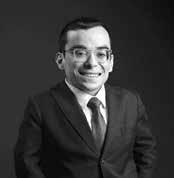
Take a look at Yehuda Neuman – or just watch him speak for a minute – and you’ll notice a few things about him: his proud, yet humble smile, his honest and respectful demeanor, and, of course, his mature and determined outlook on life. But one thing you won’t see in Yehuda is regret.
“Baruch Hashem, I’m literally living it up to the fullest. I’ve traveled the world. I flew an airplane. I stood on top of the Grand Canyon. I’ve been to Israel
so many times,” Yehuda said. “I’m not missing out on anything in my life. Even more so, I could do all 613 mitzvot in the Torah. And because of that, I thank Hashem every day.”
Standing at 3 feet, 4 inches, Yehuda Neuman was born with spondyloepiphyseal dysplasia (SED), a common form of dwarfism, a condition that, for him, initially came along with clubfoot, making it that he couldn’t walk until age three, and a cleft palate – two medical chal -
i understand that there are people with physical challenges that are not necessarily in the same position as me, and they might have it worse than i do. a nd that’s something that i still am thankful for: that hashem made me the way i am. i would never trade it for anything in the world.
i love giving tzedaka. i feel so good giving tzedakah, because i ’ve been in the position on the other end where, you know... i understand what it means to do chessed.
i really hope people can take this message and just see, everybody has struggles just like everybody else. a nd it’s okay to have struggles, it’s okay to ask for help. But, you just have to be authentic, you have to be yourself.
lenges that were later fixed through a series of surgeries.
Months before Yehuda was born, early sonograms indicated that his limbs were shorter than normal. When his parents, who are both of normal heights, found out about the issue, they went to the Skverer Rebbe for a bracha.
“The Rebbe was giving chizuk to my father, and the Rebbe only had one question. He asked, ‘How is the head and the heart?’ And my father said that the head and heart are perfectly normal; there’s nothing wrong with it,” Yehuda explained. “The Rebbe gave him a bracha, ‘Don’t worry. He’ll be a talmid chacham and he’ll go l’chuppah u’l’maasim tovim,’ and that was it.”
When Yehuda was born, he stayed in the hospital for several weeks, and when he finally came home, he didn’t look too different from any other baby, besides the fact that he was in a cast and had a feeding tube.
Growing up in Kew Garden Hills, Yehuda attended Yeshiva Ketana of Queens for elementary school. His younger years were mostly marked by the same features inherent in most people’s childhoods: playing in the yard, going to school, going to camp, and making friends. But throughout his years as a child and teenager, Yehuda was forced to endure a seemingly endless series of surgeries meant to ensure that his limbs stayed straight as he grew and physically developed. In fact, Yehuda estimates that he has had around fifty surgeries since he was born, some lasting minutes
and others lasting much longer. And for the last set of surgeries, at eighteen years old, Yehuda and his parents had to relocate to West Palm Beach, Florida, for six months.
“I remember, before the surgeries, I was at the height of my learning. I was learning well. It was right after my first year of Beis Medrash, and I took a whole box of sefarim with me [to West Palm Beach]. I did not open one sefer the entire time I was there,” Yehuda recalled. “It was definitely a hard time, a dark time. But I think the thing that helped me through it the most was the fact that I knew that it was going to end at some point.”
Since then, Yehuda has emerged as an inspirational figure; a role model whose unwavering positivity, appreciation of life, and refusal to be a victim of circumstance have motivated many people to live a happy and full life.
Today, Yehuda is 27 years old and leads a successful, independent lifestyle. He has a Bachelors in Finance, drives a car, goes out on shidduch dates, and works full-time in the commercial real estate industry. Additionally, Yehuda works as a professional producer and manager in the Jewish music industry and has written a few songs, including Fighter, a beloved single dedicated to the Special Children’s Center and written partly based on his experiences in Florida. Together with a few of his musical buddies, Yehuda has traveled the world.
“My connection to music goes way back. I never liked sports in school, but I always connected to music. And even
from when I was young, I was thinking of melodies in my head,” Yehuda said. “I think I wrote my first song when I was in fifth grade when I was ten years old. And I just kept on doing that. For some reason, when I listen to music, especially the stuff I like, I just feel like I’m in a safe space; I’m in a comfortable zone. I can just relax and be myself.”
According to Yehuda, there are only thirty Orthodox Jews in the world who have dwarfism.
Yehuda’s life is a bit of a paradox. He doesn’t want to be an inspiration; he just

wants to live a normal life and be treated as an ordinary individual. But he realizes and accepts that fundamentally, his insistence on living an ordinary life is, in fact, the reason why he is so extraordinary. At the same time, he accepts his condition and is comfortable in his own skin, so much so that he is able to make jokes about his situation while maintaining his dignity and self-respect.
“When people see somebody with a physical challenge, they think ‘nebach.’
Nebach is a word you use when you hear of a tragedy. There’s nothing tragic about
com or YouTube.com/LivingLchaim
my life, and there’s nothing tragic about somebody who’s in a wheelchair. If anything, you should say ashrecha,” Yehuda maintains. “I drive a car, I have a fulltime job. There’s no tricks, there’s no life hacks, there’s really no secrets, and I just want people to know and understand that. And I think that’s what the beauty of my life is and that’s the inspiration that people carry: that they see somebody who they think has a challenge or is limited, but really, they’re living life to the fullest, just like anybody else.”
Yehuda continues, “Next time you see
somebody on the street that’s in a wheelchair, or next time you see me on the street, don’t assume the worst. There’s nothing to feel bad for!”
Despite his challenges in life, Yehuda is still incredibly grateful to Hashem.
“I understand that there are people with physical challenges that are not necessarily in the same position as me, and they might have it worse than I do. And that’s something that I still am thankful for: that Hashem made me the way I am,” Yehuda Neuman says. “I would never trade it for anything in the world.”


I’ve been going out with a girl I met on an app for the past two months. I’m not the type to meet on an app, but there was something about her profile that really spoke to me. My intuition was right in that Alana* is truly an amazing girl, and it has been amazing getting to know her.
As things have been getting serious, we felt it was about time to spend time with each other’s families. We had an amazing Shabbos at my parents’ house, and she expressed how much she loved it. When it came to planning a time to spend Shabbos with her family, she kept hemming and hawing, but we eventually came up with a date that was good for everyone. Shabbos at her house was nothing I could have ever imagined at my potential in-laws. I don’t have too many examples, but I just felt like something was off. Her mother seemed fake nice. Her father was clearly overbearing and did not hide the fact that things always need to go his way. I was really not comfortable around them at all.
I don’t want to hurt her, and I do want to still find a way to work this out but I would like guidance as to how to approach this without hurting her. I would appreciate any guidance you have.
Disclaimer: This column is not intended to diagnose or otherwise conclude resolutions to any questions. Our intention is not to offer any definitive conclusions to any particular question, rather offer areas of exploration for the author and reader. Due to the nature of the column receiving only a short snapshot of an issue, without the benefit of an actual discussion, the panel’s role is to offer a range of possibilities. We hope to open up meaningful dialogue and individual exploration.

Sorting out what is present in a family and what is present in a person is hard. It’s smart that you made sure to spend time with Alana’s family on Shabbos. Your expectations were clearly not met, and you picked up on several troublesome indicators.
You are right that you need some help in dating skills. You are caring and don’t want to hurt the young woman. That is to be respected.
Getting a person to open up about relationships with others and strategies employed to resolve them is an art. Honesty about oneself is a sign of maturity. What can you do to create a safe environment where another person will open up? What is the person’s commu-
nication style in other environments? What is her response to stress? Strife? Get some dating coaching from an experienced professional in this area. A newspaper column is not sufficient help to developing these skills so that you can really get to know a person’s strengths, weaknesses, and methods of dealing with difficulties as well as your own.
Firstly, congrats on meeting a girl you like and connect with! Getting to know a new family is always hard, not just for the single but also for the parents. It’s great news that your parents liked Alana and that you all had

an amazing Shabbos together. Use this as an opportunity to talk to her about the differences you both experienced going to her house vs. your house for Shabbos; I’m sure you both felt it. You can and should be open about your concerns while also being respectful. What is Alana’s take on it? Does she recognize the elephant in the room, or is she immune to it? The key to this is focusing on awareness and a mutual decision to make it work with an acknowledgment of reality.
As you move forward in life, you will start to learn how to navigate difficult people, together with your spouse. Not every relationship will be easy to do so. You must make sure you’re getting into a marriage with a co-captain on the ship who “gets it.” Talk to her about it in an understanding way and explain that you are trying to get to know what it was like growing up. Tell her how you felt over Shabbos and ask if she has experienced this before. Was something going on that week that made the family particularly on edge or stressed? If her attitude about it is nonchalant, thereby dismissing your concerns, you can speak to a professional to see if this is a healthy situation to put yourself in.
Dr. Jeffrey Galler
It is true that, like it or not, your inlaws will be part of your life for many, many years. But the good news is that you would be marrying your girlfriend, not her parents.
Here are some thoughts for you to consider.
First, you seem mature and experienced in dating, so you understand how difficult it is to find someone you can get serious with. Don’t be quick to drop someone who might be a wonderful life partner.
Second, you don’t sound like the kind of person who will be dependent, either financially or emotionally, on her parents. This independence is crucial. Third, it sounds like your girlfriend
Don’t be quick to drop someone who might be a wonderful life partner.
might also recognize that there is something off-putting about her parents. Note how she seemed reluctant to have you meet them.
Fourth, this might come as a surprise to you, but no one in this world is perfect (except my wife, of course). So, while it would be nice to have in-laws who are warm and kind and remind you of your own parents, that is not a requirement for a happy marriage. What should you do? You need to do some homework. Check with the local synagogue rabbi. Double date with any of your girlfriend’s married siblings, if any. You do want to make sure that there is no criminality and no seriously malevolent behaviors in this family.
In the future, only time will tell if you can, or will, grow to love and feel close to your in-laws. You are not required to do so. All that is required of you is to honor them, respect them, and act politely in your interactions with them.
Only you and your wife will determine how close you are to them, geographically, socially, and emotionally.
Now, don’t try to convince your girlfriend that her mother is not nice or that her father is too domineering. But you could say something to her like, “You seem so different than your parents,” and then see how she reacts.
If she feels, as you do, that her parents deserve respect, but will probably never enjoy a close, warm relationship with the two of you, then this girl is a keeper.
If, however, she expresses a deep love and admiration for her parents, and a strong desire to have a life-long, close relationship with her parents, then, my friend, you might be facing an unsolvable problem in this relationship.
The relationship between you and Alana seems wonderful. Her family gave you the creeps, and maybe rightfully so. You seem like a caring individual. Your concern is that you don’t want to hurt Alana’s feelings. Here’s the thing… Alana’s feelings may be hurt. You are responsible to bring this up in a kind and sensitive way, but what you are not responsible for is how Alana feels after you speak your truth. Sometimes the fear of hurting the other person can quite literally hold us back from living our most authentic lives. But what about you in this equation? You matter, too. I humbly suggest that you speak with her sooner rather than later. You seem like
a sensi - tive soul, so I’m not at all concerned that you won’t have the words…you just have to let yourself speak them. You are allowed to speak them. If you two are meant to be, this honest and kind conversation is going to bring you infinitely closer and more connected to each other.
You can say something like, “I’d really like to share my experience with you about the time I spent with your family. My priority in this conversation is your comfort, and I would never want you to feel badly. But I also know that in healthy relationships, partners share what is on their
minds. I hope you know where my heart is as we talk about this.” Tell her how you felt around her family. Ask her if she notices these dynamics and get a read on what her sense is of the family.
If she sees what you see and has done any necessary work to individuate and is prepared to have healthy boundaries around your marriage, then you have a green light. If she becomes defensive, or simply doesn’t see it, and/or cannot honor your feelings, that is a serious “yellow.”
Yes, a person comes with a family. But if that person has good boundaries around toxic behavior, and lives in the same reality that you live in, this is more than workable, if you want it to be.
Again, you are not responsible for Alana’s feelings. You are responsible for your own honesty and communication and kindness around communication. Take a mo -
ment and sit with the fact that her feelings might get hurt. Process what is coming up for you and what feels hard about having this very honest and raw conversation. Honor whatever it is and allow it into your consciousness. Accept it. Make peace with it. Maybe it is fear of losing her, maybe it is fear of any consequence as a result of being direct. A lot of us are dealing with this. Your relationship is moving to the next level, and this may bring you infinitely closer and infinitely more intimate, ultimately. That’s the thing about good relationships… When we work through our own fears and say what is on our minds, a healthy relationship with the right one will hold space for everything. Hard conversations turn into more closeness.
Best of luck!
Sincerely, Jennifer
Jennifer Mann, LCSW is a licensed psychotherapist and certified trauma healing life coach, as well as a dating and relationship coach working with individuals, couples, and families in private practice at 123 Maple Avenue in Cedarhurst, NY. To set up a consultation or to ask questions, please call 718-908-0512. Visit www.thenavidaters.com for more information. If you would like to submit a dating or relationship question to the panel anonymously, please email JenniferMannLCSW@gmail.com. You can follow The Navidaters on FB and Instagram for dating and relationship advice.

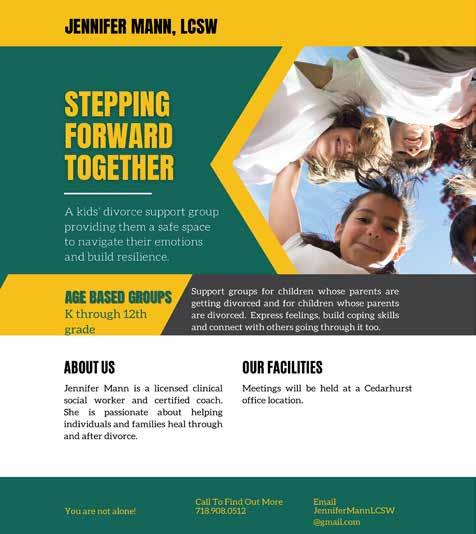
Lag B’Omer has a surprisingly strong place on the Jewish calendar. Children and adults alike are looking forward to the big day. Whether it’s haircuts, concerts, bonfires or simply getting to turn on your favorite music, we’re excitedly anticipating this day.
Throughout the community, we will see many celebrations, with schools, shuls and families marking the day. There will be bonfires with joyous singing. We can look forward to the simcha of new homes being built as weddings take place. There will be many concerts, both locally and throughout Jewish communities. For those willing to travel a little bit, Bracha Jaffe will be performing Songs of Hope to benefit Ray of Hope, an important organization improving the lives of many of our community members (https://www. rayofhopeshow.com/).
Meron has long been associated with Lag B’Omer, with hundreds of thousands of people visiting during that brief period. This year, the festivities will be halted at the site, and I know many of us will take a moment to remember the 45 men and boys that were lost during the 2021 tragedy.
It would be obvious to write an article on Lag B’Omer, and that was my initial plan. But I decided to take a detour to discuss a day that just passed but is not recognized as widely. The korban Pesach is the only sacrifice that a person gets a second chance to offer if they were unable to do so the first time. This day is known as Pesach Sheini, and it was a time of rejoicing for those unable to bring their korban at the prescribed time.
While there is much to be said on this topic, it’s interesting to note that on Pesach Sheini we are given a second chance. As critical as the korban Pesach is, with so many intricate halachos, there are those who were unable to fulfill the mitzvah at the appropriate time. Hashem gave them a second opportunity, another chance to fulfill this mitzvah and experience the holiness that comes with it.
While Pesach Sheini is only there to correct a specific situation, there are many
times that children and adults can make a mistake. Perhaps a child spoke lashon hara about another or a teen did something forbidden on Shabbos, chas v’shalom. There are also errors of a different nature. This includes showing up to an event at the wrong time or accidentally kicking a ball into a neighbor’s window.
We’re all human, and we err. Making mistakes is one of the very definitions of being human. Imperfection is inherent, and teshuva exists to permit us to correct this. Parents and children make mistakes and fixing them is part of our journey. It’s not “if” we will make mistakes, but “when.” We feel discouraged and bad about ourselves when we err, unsure of our next steps. As parents, we can guide our children to learn from their mistakes and forgive themselves as they grow, giving themselves a healthy way to move forward and progress in their development.
It’s human to err, but it’s still unpleasant. Our response depends on the mistake, but there are a few common reactions, and a person may experience one or more of them. There are a surprising number of conflicts that exists within our choice of response. Like most areas, learning balance is important.
Ignore it. Some mistakes are so small they’re not worth correcting. A problem can arise when children get hyper-focused on a minor error and give it too much prominence. When this happens, the child can’t get past the error, and they waste emotional energy feeling bad about themselves. It’s also an issue when children consider a big mistake to be a minor one. A child could seriously hurt a classmate’s feelings yet think whatever they did was “no big deal.” It takes chinuch and maturity to understand what can be ignored and what needs further attention.
Feel remorse. An essential step of teshuva, feeling regret is a prerequisite to correcting a wrong, particularly if the mistake was halachic. There are specific ways to do this and a rav can explain better. Un-

fortunately, extremely strong feelings of regret can impede growth or make one feel negative about themselves. Children need to learn to balance regretting their actions with not being hindered by feelings of guilt.
Correct it. Usually, there is something that, if done differently, may have prevented the mistake. Using the examples above, a child can learn hilchos lashon hara and hilchos Shabbos. They can also learn to ask before acting when they’re unsure. A child who shows up at the incorrect time can learn to write down their activities in a calendar. Kicking a ball away from a neighbor’s window will prevent costly damage. Learning to correct mistakes is a crucial step in their development. Often, mistakes are the only way to learn the appropriate actions.
When possible, we can help children do the right thing. We can help them say “sorry,” be kinder to a classmate, or demonstrate organizational skills. It can be healing for a child to see they can do the right thing and be their best.
Parents can lovingly guide children to recognize which response is appropriate for their situation. We need to remember that what seems obvious to us is often unclear to a young, still developing mind.
Kids make mistakes. It’s the reality and learning from those errors is a major part of their development. Kids usually feel bad afterwards, and we don’t need to exacerbate their negative feelings. We can comfort and reassure them that it’s normal to make mistakes and that it doesn’t take away from who they are.
We should never shame, embarrass
or mock a child for making a mistake. It is hurtful both to the child and to our relationship with them. If a parent feels the child is being careless, there are ways to gently point that out without taking away from the child’s sense of self.
Mistakes do not define us, and children should recognize their self-worth, even with their imperfections.
An extremely large number of parents feel guilty. “I should have done this” or “I can’t believe I did that.” I speak to many good mothers who love their children, yet are overwhelmed by their parenting errors. Parents make mistakes, too, and can feel disheartened. We also need to remember that we won’t get everything correct, and we need to use these errors as lessons to propel ourselves further, not weigh ourselves down.
Feeling remorse is a crucial part of growth but can easily overwhelm and set someone back. We can forgive ourselves, contemplate ways to correct our actions, and do better in the future. Acting as models for our children, we can teach them to balance their feelings, as we all continue to grow and improve ourselves.
Along with forgiving ourselves, we can learn to forgive others. Children can act up, neighbors can be rude, and friends can disappoint. Others deserve a second chance, too.
Sara Rayvych, MSEd, has her master’s in general and special education. She has been homeschooling for over 10 years in Far Rockaway. She can be contacted at RayvychHomeschool@gmail.com.
Why do people wait so long to get help in marriage? That’s a loaded question, but an important one. The truth is, we often wait for things to fall apart before we scurry around trying to fix them – even though it frequently leads to a lot more stress, worry, anxiety, and conflict. Why do we leave complex problems or bad situations to be dealt with when they should have been dealt with years before?
Everyone can relate to this concept on some level. Perhaps you and your husband last went on a date a few months ago. You go out, and the relationship has a renewed sense of friendship and connection. You kick yourself and think, “We should’ve done this months ago!” Maybe there’s a job you stayed in for too long. Once you left, you couldn’t believe you didn’t go sooner. Some people feel this about the community or house they finally move to. Whatever the scenario is, there is a common denominator in all of them.
They require change.
People (some more than others) have a strong aversion to change, and often, that’s why we stay in situations that are not good for us and sometimes even detrimental to our well-being. The thought of making an effort to invoke change can be anxiety-provoking and make a person stay where they are. It’s a powerful thought and one that needs reflection.
Along with the fear of change can come the fear of hard work and the uncertainty of our success. But if you think about it, it’s an emotional response, not a logical one. Let me stay in this lonely place in my marriage because I have to work hard and it may not work? Imagine if someone said this regarding being a parent: “I don’t get my child. I am overwhelmed by their problems. Let’s stay in this place of negativity and see how it plays out.” We all know how it will play out – not great. When we don’t intervene and work on relationships when there is a struggle, there is one guaranteed outcome: a downward spiral, where the

damage is severe, and there is a lot of pain and suffering for both people.
Another reason people procrastinate about getting help in their marriage is because of the immense emotional risk and fear one has to face when they seek help.
Marriage is the most essential relationship in our lives, and the thought of getting help brings up some scary question, like, “Are we saying that there’s something broken in our marriage?” And even scarier, “Is it fixable?” It’s natural for our minds to race to the worst case scenario, but in reality, what often needs fixing is not because of something broken, but because there’s a small crack in the relationship that is amenable to appropriate intervention. What if we could change the script in our minds and hearts to say, “I have something so worthy of protecting that I’m not ready to let that disconnection grow further and further apart”? Then, we can seek guidance when we see a cycle of distance or destructive behavior. That support can be a shiur on marriage, a podcast, a talk with a mentor, and/or meeting with a coach or therapist. But let’s not wait for the distance to create a wall of loneliness, pain, and resentment.
I want you to feel empowered and
proud to work on your marriage. What if we could seek support and discuss marriage in our communities to make our marriages more robust and whole – not because we’re bad spouses or our marriage is hopeless, but because we believe in this relationship and that it can bring us so much joy and love?
There’s been a lot of change in terms of parenting in this regard. Years ago, it was not popular to attend parenting classes or talk about how you’re working to be a better parent. Now it’s the norm and fashionable, which is beneficial for our children. Parents understand that being a parent is complex, and getting help is admirable. What if we could apply that same energy, idealism, and lack of anxiety to our marriages? What if reaching out for support in our marriage is another way of expressing our desire to grow in a relationship that matters so much to us? It is essential to get guidance and support not because you’re a failure or doomed but because you want more for yourself and because there are answers to be found for those brave enough to look for them and look inside themselves. This is my mission.
Marriage is the foundation of a healthy, happy, emotionally sound home.
It’s a place where children learn self-respect, respect for others, love, connection, communication, trust, and how to attain real joy in this confusing world. It creates a bedrock of security and safety for our children, foundational to healthy child development. We need to invest in this relationship, even if it’s at our ego’s expense and anxiety about how others might perceive it. We all have insecurities and flaws that come out in our relationships. We are all works in progress. The difference between a great marriage and a mediocre one or less than mediocre one is a marriage where two people are invested in continuously working together to improve it.
Research shows that couples often wait too long to get help. The resentment and negativity have built up so strongly that it’s hard to create the positive sentiment they once felt. (I said hard, not impossible.) This is not meant to scare anyone or incite fear but to inspire you to seek guidance, support, and work on your marriage today! Not when there is a crisis and things are completely broken.
The effort and work you invest in your marriage is crucial. It’s your present, your future, and your children’s futures. Don’t push it off, and don’t shrug it off. Don’t look in the mirror one day and say, If only I would’ve stopped and invested in the most critical relationship in my life for a day, where would we be? Would things be different? It’s not too late to make that day today!
Malka Klaver is a certified marriage coach and marriage educator. She provides individual and group coaching, as well as yearly workshops, to educate and guide women to a closer, more connected marriage. She also hosts a weekly podcast titled, “Best Friends for Life,” where she discusses relatable challenges and practical tools to enhance marriage. For more information or to contact her, please visit malkaklaver.com.

Dear Etti,
It can be disheartening, and I hope I am not the only teacher with this issue. I put so much into my lessons, and now that the year is ending, I don’t feel that the children remember everything I taught over the year. Shouldn’t they remember the material I taught in December now, when I refer to it or review?
Help! I don’t want to feel like my learning was for naught!
- A Teacher Who Cares
A:Dear Teacher Who Cares, Thank you and all of your fellow teachers for all you do and how much you care! Don’t be disheartened. Even if your class does not remember exactly what you taught them, you are building schema!
Schema is a buzzword in education nowadays. What is schema?
Schema is like a knowledge bridge, where one draws on past experiences to comprehend and connect to what they are currently learning about. For example, good readers are consciously or subconsciously constantly seeing how what they read fits into what they already know. Ellin Oliver Keene and Susan Zimmerman in Mosaic of Thought (1997) wrote about the fact that there are three main types of connections students make as they read: Text to self (how what they
read relates to them); text to world (how what they read relates to what they know about the world around them); and text to text (how what they read relates to other texts they have already read).
Why is schema important? What does it have to do with overall learning?
When a child activates prior knowledge, they are thinking about what they are reading or learning. They are absorbing the information with a deeper understanding. They become metacognitive; they are
We all need brain breaks sometimes to do better, recharge, and face the next hurdle.
thinking about their thinking while they read or learn a new piece of information and then building on that foundation to understand their thoughts even more.
Picture a filing cabinet. Schema theory draws a comparison to the way the brain works to the filing cabinet you have just drawn in your mind. There are many folders, all organized, created from the many experiences you had over your lifetime. When something new happens, there is a folder in which the new
event or information can be stored. This makes it so much easier to recall the information later. If, on the other hand, a piece of information enters but there is no place for the facts to be stored, the information gets a new folder, or is not stored at all! The information gets rejected because it does not connect to anything already stored, so there is no place for it to stick.
The implications for our classrooms are obvious. We see that the more a person knows about a subject, the easier it is for the person to learn and absorb even more information. A good teacher will try to build that bridge to understanding, relating a new concept to a concept the children are already familiar with.
The Dubno Maggid was an expert mechanech. He made sure to bring home whatever point he was trying to make through a rousing story that was relevant to his audience and tied into their lives.
Sometimes, new material is introduced. If a teacher sets up the “folders” in the brain in advance, the students will have an easier time understanding the new material.
I remember struggling to teach a particularly difficult pasuk to my class, but both the wording and concepts were difficult for them to understand. I did my best but left that day feeling despondent that they just weren’t grasping the material the way I wished they would. The next day when we opened up our Chumashim, the class was so receptive to that pasuk, and I was able to teach it the way I had always wanted to.
It made me wonder. I decided to experiment.
I began to end my classes with a quick peek at the next day’s pesukim, and – like magic – lessons im -
proved dramatically as the students were never learning the material “fresh.” They were always joining my lessons at step two, familiar with the concept or words from the day before, ready to really delve in and learn more.
I found the same thing when I taught math in an older grade. A little peek seemed to help the comprehension and retention the next day.
Another thing I noticed when I introduced a concept or topic was that there was more passive listening involved, and questions and deep thinking didn’t really come until time had passed and the new information was absorbed. I didn’t have a name for the need for space to allow a thought to marinate until I read Dr. Lori Desautels’s article on brain breaks (https:// revelationsineducation.com/priming-the-brain-brainbreaks-and-focused-attention-practices-what-is-thedifference/).
Brain breaks – an idea that resonated!
We all need brain breaks sometimes to do better, recharge, and face the next hurdle. Sometimes that means leaving the topic totally and coming back to it at a later point. Other times, it means staying with the idea but through a different modality.
In order to be taught and to absorb material the way we learn best, we need to feel calm and focused. In the middle of intense cooking for yom tov or an all-nighter preparing for a class, you might find me taking a break. I might read an article, call a friend, or sit and stare into nothingness. I then find myself able to jump back, newly recharged, back to the task at hand.
Our students need brain breaks as well. I know teachers who believe in bringing brain breaks into the classroom, unconnected to the material at hand. While these breaks are beneficial, I propose that brain breaks should connect to the material being taught. This allows children to chew on what they have just learned by having a break that stays with the subject but is a relaxed “pause.” In a younger grade, that might mean coloring or doing a fun page on the topic or even pairing up with a seatmate to design a poster on the topic. In an older grade, it might mean pairing up to design something, having a reflection moment in a journal, or having the children create a fun sheet on the topic.
I am sure you can think of so many more ways of offering brain breaks.
Another important concept is review. If every time
you teach a concept, a hard word, or a formula/strategy you cement that knowledge by putting it up on a “Word Wall” or putting it in a large envelope to refer to throughout the year, it is likely that the children in your class will still remember the information months later. Spending a few minutes here and there going through the cards in the envelope or the words on the wall will keep information fresh and make the children feel smart – which they are!
While I have seen many review walls and other memory aids in elementary school classrooms, I have even seen word walls in high school, all student-created, for words and grammar, roshei teivos, history topics, and math concepts.
Spend some time playing review games. You will be pleased at how much you can remind them through a fun activity.
Next year, start sooner. As soon as you teach information that has long-term value or will be needed for a lesson later in the year, decide how you will make it a living concept in your classroom.
Have a rejuvenating summer,
- Etti
Mrs. Etti Siegel holds an MS in Teaching and Learning/Educational Leadership and brings sound teaching advice to her audiences culled from her over 35 years of teaching and administrative experience. She is an Adjunct at the College of Mount Saint Vincent/Sara Shenirer. She is a coach and educational consultant for Catapult Learning, is a sought-after mentor and workshop presenter around the country, and a popular presenter for Sayan (a teacher-mentoring program), Hidden Sparks, and the Consortium of Jewish Day Schools. She is a frequent contributor to Hamechanech Magazine and The Journal for Jewish Day School leaders. She will be answering your education-based questions and writing articles weekly for The Jewish Home. Mrs. Siegel can be reached at ettisiegel@gmail.com.


Consuming breakfast is important for our health and wellbeing.
Despite how essential this meal is, individuals often skip breakfast for various reasons – from lack of appetite in the morning, time constraints, or simply misunderstanding its benefits. Let’s delve into the manifold benefits of consuming breakfast, noting its importance in enhancing physical health, mental wellbeing, and better quality of life.
First off, eating breakfast aids your daily nutritional intake. After a full night of fasting and with blood sugar levels low, your body requires glucose to help replenish our energy store. Glucose, our body’s main source of energy, is crucial and is the primary source of energy for our brain. Ideally, breakfast should be eaten within an hour to an hour and a half of waking up. Doing so can lead to improved problem-solving skills, concentration, and mental clarity. According to some research, skipping breakfast was associated with risks of depression and anxiety, highlighting how breakfast has an impact on mental health.
Carbohydrates along with proteins and fats are the three main sources of nutrients needed in our bodies. Carbohydrates get broken down into glucose or blood sugar which is our body’s main energy source. The most common sources of carbohydrates are bread, pasta, cereals, cakes and crackers. It’s important to choose whole grains as opposed to refined grains to reap the most benefits for your health. Sources of whole grains include whole wheat bread, brown rice, and oatmeal, which offer an abundance of nutrients, vitamins, minerals, and fiber that your body needs. Refined carbohydrates, or simple carbohydrates, have been processed and removes most of the nutritional value. Try to limit or avoid foods with lots of added sugar as they most often contain many calories but lack nutrition. An excess of added

sugar can raise your blood sugar levels and lead to other health conditions.
Common breakfast foods such as whole grains, fruits, dairy products, and protein sources like eggs or nuts are rich in vitamins, minerals, and other nutrients. These components are key for maintaining energy levels, supporting metabolic functions, and ensuring overall bodily health.
More so, breakfast cereals fortified with vitamins and minerals can help individuals meet their daily recommended intake of nutrients like iron, calcium, and B vitamins. These nutrients are vital for bone health, oxygen transport, and energy production. Particularly in children and adolescents who are still growing and developing, consuming breakfast is pivotal.
Along with the physical health benefits, breakfast has significant effects on cognitive function and mental health. Studies have shown that individuals who consumed breakfast had better task performance, memory, and attention span. Specifically, school-aged children
that consume breakfast see positive effects on their academic performance as well as their classroom behavior.
Consuming breakfast is associated with weight management and better metabolic health. A healthy breakfast can help kickstart your metabolism, helping your body burn calories more efficiently throughout the day. Additionally, breakfast consumption helps regulate hunger hormones which reduces the likelihood of overeating later on in the day. Those who skip breakfast may be more likely to experience fluctuations in their blood sugar levels which can lead to increased hunger and a higher tendency to consume higher calorie, nutrient-poor snacks. This pattern can contribute to health conditions like obesity and cardiovascular disease.
The most common reasons I hear from individuals for skipping breakfast are lack of hunger in the morning and being time constrained. If you find yourself with not much of an appetite in the morning, you may be eating too late. If that’s the case, try pushing dinner
earlier, at least three hours before bed. Aside from helping with your appetite, eating right before bed can lead to indigestion and heartburn. Having a lighter breakfast, such as a smoothie or yogurt with fruit, may feel better on your stomach if you are not used to eating much. If you are pressed for time in the morning, then meal prep is key. Oatmeal is a super quick dish to make, but if that’s too time consuming, try overnight oats. Oats contain lots of fiber. Top them with some berries and nuts, and it makes a great breakfast. Egg muffins are also a great option as they can be made and prepped ahead of time. Eating something is better than nothing. You don’t need much time to enjoy a healthy, filling breakfast.
Beyond the physical and mental benefits of eating breakfast, long-term wellbeing is important. Consuming breakfast regularly has been associated with reduced risks of chronic diseases. Some studies have found that individuals who eat breakfast regularly have a lower risk of hypertension and high cholesterol levels. In addition, they are less likely to develop metabolic syndrome which can increase the risks of diabetes, stroke, and heart disease.
The quality of your breakfast matters. A nutritious breakfast that contains whole grain, lean protein, and healthy fats can contribute to better long-term health outcomes compared to a high sugar, refined carbohydrate-filled breakfast. Thus, to maximize the health benefits, make mindful choices.
Tehila Soskel is a registered dietitian nutritionist with a private practice in the Five Towns. She sees clients for weight loss, diabetes, and other various diseases. Appointments can be made for in-person or virtual sessions: 516-457-8558, tehilasoskelrd@ gmail.com, tehilasoskelnutrition.com.


We are all tugged by various strings. Some are strong cables that bind us to family responsibilities. Others are thick ropes of commitments we undertook and feel obligated to continue.
There are thinner, more delicate strands of relationships. They’re fragile and require our input to be sustained and grow into healthier, stronger connections. Sometimes, we tell ourselves that those people and those relationships need us.
Then there are the lacy ribbons that unspool when we think about them, enticing us with their promise of personal development, growth of a talent, and fulfillment of a dream. We can create beauty, not just do and be!
It’s easy to feel tied up in knots by all these cords. Taking the time to untangle them is a worthwhile effort. I find that all I need is a clear head with a rested body, some solitude, and fresh air. Grabbing a notebook, too, to organize my thoughts and clarify my feelings in writing is always part of the exercise. There’s usually a tall glass of Diet Coke with ice cubes at my side, too.
Listing primary responsibilities and needs and then proceeding to wants,
dreams, relationships, and experiences keeps me focused. I see so many things on the list for me to do. There is a finite amount of time for me to invest, however. The multiple choices are written out.
ing? Is now the time to pursue another masters? Can I take a short course now? Do I need more outside joy in my life or more alone time now? Do we need more couple time now? Is there a child or par-
Given my priorities, my energy level, and need for creative initiative, what makes sense for me and my growth at this exact point?
But what does Hashem want from me now, is the bigger question. He gave me abilities, challenges, and energy. He knows my limitations and that I can’t do everything. And so do I.
So, I ask myself: Given my priorities, my energy level, and need for creative initiative, what makes sense for me and my growth at this exact point? Do I need to refresh myself with relationships now that I am spending more time in the community and less time commut-
ent who really needs my time now? Do I need a time-out to nurture myself so that I can continue the activities that generally give me fulfillment? Should I continue to revise my manuscript slowly? What should I postpone for a different time?
Most of the answers that emerge in this search for healthy growth and accomplishment involve a reordering of priorities, time, and energy. It may take some time to calendar these new
foci and shift things around so that we get to actually accomplish them. But we feel invigorated as we begin to do the planning work to make these objectives accessible and doable. Clarity of purpose is so liberating!
Verbalizing the new insights and resolutions to our nearest and dearest, our spouses, our mentors, and our BFFs, helps us in our decisiveness. We may also receive support, understanding, and encouragement.
We can actually proceed along a straighter line without competing tugs when we have been honest with ourselves. Our feelings and our brains get due respect, and we find a sense of divine direction from the introspection and writing. As we move along and daven for continuing clarity, we see hashgacha pratis pointing the way and guiding us. We recognize our blessings and move forward with greater peace of purpose.
JWOW! is a community for midlife Jewish women which can be accessed at www.jewishwomanofwisdom.org for conversation, articles, Zoom events, and more.
 By Country Yossi Toiv
By Country Yossi Toiv

Back in the late ’60s and early ‘70s, when I was dating, there was no national shidduch crisis. But I had my own personal shidduch crisis. I would go out on blind dates once a week and twice on weekends for years and still couldn’t find my bashert. Either they weren’t for me, or I wasn’t for them. And it didn’t take long to figure out.
One look and one or both of us knew it was gonna be a long night.
I remember one date I picked up and we hadn’t driven one block before she gagged and threw up all over my car.
I hoped it was something she ate.
One girl told me sweetly as I drove her home that I reminded her of the ocean.
“Why?” I asked flattered, “Because I’m deep, dark and mysterious?”
“No,” she replied, “because you make me sick.”
At least she didn’t puke.
I mean, I knew I wasn’t a Rock Hudson, but I was the leader of a popular Jewish band The Or Chodosh, had 3
best-selling albums out, and performed at concerts all around the world.
In my mind, I was some catch. Unfortunately, no one else seemed to think so. They’d rather catch the flu.
I remember at one concert I complained on stage, “I don’t know what the big deal is about Mordechai Ben David. Take away his good looks, his beautiful voice and his dynamic personality, and what have you got?” Some wise guy yelled out “YOU.”
Even when I finally found my bashert, I got no respect.
When I met her father, he asked me what I do for a living. I told him I was the lead singer of a popular band.
“Bah,” he muttered, “We don’t need another singer in the family, we have enough chazzanim.”
Determined to save my skin, I told him we had a concert scheduled for next week in Brooklyn College, and I’d be honored if he’d come as my guest. I figured if he’d personally see me in action and hear me sing he might change his mind.
Thankfully, he agreed to come.
At the concert, I belted out all my vocals with extra vibrato, hit the high notes with precision and power like Pavarotti and danced across the stage like Michael Jackson with a few extra shukkles, all the while peeking at him there in the front row to see his reaction.
Completely stoic.
He sat there with arms wrapped across his chest occasionally grunting, moaning and scowling. Occasionally, he would reverse the order.
I was sure my goose was cooked.
After the concert, I warily approached him and asked him what he thought of my performance.
He hesitated for a moment, then said, “It’s OK. You can marry her.”
I couldn’t believe my ears.
“So you were impressed?” I asked hopefully.
“No,” he replied, “Ah zinger bist du nisht.” (A singer you’re not.)
I didn’t know whether to laugh or cry.
But that wasn’t the first time my
voice was dissed.
I once went to play in a hospital going from room to room singing a few songs to cheer up the patients. After one performance, as I was leaving, I told the sickly, elderly gentleman, “I hope you get better.” He looked at me sadly and said, “You, too.”
But there were other obstacles preventing me from finding my bashert. Take my car, for example.
My first car was a 1957 Chevy that my uncle gave me when he got tired of fixing it.
It had a large hole in the floor where the front passenger’s feet go, where, for your weird entertainment, you could watch the road flashing by at 60 MPH under your feet while you choked on the dust and putrid exhaust. I ingeniously covered it up with a large piece of plywood. That worked perfectly well until one night I had a date sitting there right after a torrential downpour. Now, I don’t
know how it is these days, but back then, after a heavy rain, Seagirt Boulevard turned into Seagirt Lake in some spots. Now, there we were, all dressed up – me in my expensive, Shabbos suit and black hat and she in her beautiful, fancy dress – zipping along at 40mph when I see a huge puddle on the road in front of me.
But not to worry.
I make a quick, mental calculation (not one of my strong points) that my car is high enough, the puddle is low enough, and I’m not going fast enough for any problems – completely forgetting about the huge hole in the floor under her feet.
When I hit that puddle, the entire interior of the car was immediately transformed into a high pressure car wash. Water poured through that rusty hole like the mighty Mississippi and, diverted by the wooden plank, streamed in all directions like we were sitting under Niagara Falls. A violent surge of murky, driven liquid streamed up the doors, cascading off the windows, swirling onto the ceiling, ricocheting off the seats and finally flooding into a muddy pool on the floor.
It was refreshing but not something I would recommend in formal attire. In one second flat, we were swimming in 4 inches of water, my best suit drenched, my new, black hat irreparably warped, her coiffure a tangled mess, and her expensive dress ruined.
She sat there dripping wet in utter shock.
“Take me home,” she cried as I tried to explain what happened but for some reason I didn’t have her undivided attention. I quickly picked the plywood up off the floor to help drain the water quicker but that just made matters worse.
She stared uncomprehendingly at the gaping hole in the floor. Her eyes widened in horror as a sudden, stark realization set in.
“I could have fallen through that,” she moaned in a state of tortured delirium.
“Not really,” I said, trying to calm her down. “It’s only big enough for a leg or two.”
She ignored my feeble attempt at humor.
“Take me home…NOW,” she shrieked as if I were Hannibal Lecter and Jack the Ripper all rolled into one. She was staring daggers at me so I quickly turned around, narrowly avoiding another puddle. Needless to say, the drive home was not conducive to constructive tachlis conversation.
After I dropped her off at her house, I quickly zoomed away, not wanting to meet her parents and having to explain her obvious water-logged saturation.
Too late.
I saw her talking to her father in my rear-view mirror and watched him shake his fist at me and shout something. I couldn’t read his lips, but I don’t think it was yasher koach.
But that wasn’t my worst dating experience.
You see, the car was so old that every-
decided to simultaneously break, and the entire front seat flipped back onto the back seat, and there we both sat, feet up in the air, staring at the roof of the car. Luckily, the car rolled to a stop, but it took me quite a while before I could maneuver myself and rollover backwards into the back seat and push the front seat upright.
Meanwhile, she was screaming like a lunatic.
I tried to make light of the situation and cracked, “I guess I flipped over you,”
Water poured through that rusty hole
like the mighty Mississippi and, diverted by the wooden plank, streamed in all directions like we were sitting under Niagara Falls.
thing was rotting and rusting away. That’s why the floor had developed those holes. But unbeknownst to me, the bolts holding the front seat to the floor had also rotted away and were just waiting for the perfect time to completely break off.
Just my mazal that time came while I was on a dynamite date with a rich, beautiful girl who I really wanted to impress. To avoid a repeat catastrophe, I told her if it rains within three days of our scheduled date, we would postpone the date until the next week when all the puddles will dry up.
She thought that was a bit strange, but I explained that although rain is a siman bracha, driving through puddles is not (especially in my car). She thought I was being overly cautious and a bit paranoid but better that than another unexpected shower.
(By the way, I had heard through the grapevine that that previous girl’s father was still on the warpath looking for me so I hid out in Monsey for a few weeks until things blew over but even till today whenever it rains, I keep looking over my shoulder to see if anyone’s coming after me.)
In any case, there we were, on our long-awaited date. I was waiting at an intersection patiently waiting for the light to turn green when suddenly the guy behind me loudly beeped his horn. Startled, I hit the gas a little too hard, and as the car hurtled forward, all the rusty bolts holding the front seat down
when I was suddenly pulled over by a cop.
“What did I do wrong, officer?” I asked innocently, “I couldn’t have been speeding. This car can’t do more than 40.”
“No, you’re being cited for driving a smoking vehicle,” he explained.
“But officer,” I objected, “this car is old enough to smoke.”
Reb Shlomo couldn’t control himself and burst out laughing.
The cop, however, didn’t crack a smile.
These Nassau County cops also have no sense of humor.
One more dating story before I let you go.
I eventually got rid of the jalopy and bought a new small Datsun (before they changed the name to Nissan). A cute little car, but no traction.
but for some unfathomable reason, she didn’t find it funny and demanded to be taken home.
I was saving a fortune on these quick dates, but some people just have no sense of humor.
I knew with the slightest acceleration, the bench would flip back again so I gripped the steering wheel very tightly and drove home very slowly.
As she exited my car, I briefly took my hands off the steering wheel to wave goodbye. Suddenly, she turned and pushed my seat back with both hands, and I immediately flipped over backwards onto the back seat. And as I laid there on my back with my feet up in the air, she thanked me for a wonderful evening and bid me goodnight.
And they said that girl had marvelous middos.
Well, there went that dream shidduch.
Another wonderful feature of this decrepit car was the acrid, thick, white plume of smoke it emitted from the exhaust pipe every time you stepped on the gas. I took it to many mechanics, and I was told I needed a “ring job” but I knew that without them, too. That’s why I was going on all these shidduch dates.
One day, my Rosh Yeshiva R’ Shlomo Freifeld, zt”l, asked me to drive him to the Lower East Side to a seforim store. We were driving up Rockaway Turnpike
I was driving back from a date in Bear Mountain, when I mistakenly got off the Palisades Parkway onto the snakelike Nyack exit at 50 mph. I struggled to keep the car on the road, but the wheels locked, and the car hurtled onto the grass and straight into a tree, snapping it in two. We flipped over, and the car landed upside down. Amazingly, we both crawled out the window and were taken to Nyack Hospital for observation. They took an x-ray of my head and found nothing – which explains a lot of what you’re reading here.
Baruch Hashem, we were both OK. Yes, the car was totaled, but b’ezras Hashem, we weren’t.
Two weeks later, I received a bill from the Palisades Parkway Commission for $250 to replace the Austrian Birch I knocked over. For my generous contribution, I was made an honorary member of the New Jersey Audubon Society. I still have my card.
So if you think you’re having a rough time finding your bashert, my advice to you is…hang in there. Keep davening, saying Tehillim, and knocking on heaven’s door. You never know what nisyonos you have to go through to get there. But when you do, it’ll have been worth all the trouble.
Baruch Hashem, my wonderful wife and I just celebrated our 50th wedding anniversary, ad me’ah v’esrim.
May we all soon celebrate your simchas together in Yerushalayim.
DISCLAIMER: Most of the above stories are a collection of jokes, anecdotes, bubbah maises, contrivances and pure fiction. Nebach , some are true. Hope you had a good laugh. - CY
Dairy / Yields 12 servings
 By Naomi Nachman
By Naomi Nachman
With Shavuot around the corner, I have been sharing quite a few dairy recipes. My daughter in Israel makes this a lot for her young family; she tells me it is always devoured quickly! You can eat them either as a burger in a bun or just have it plain.

Ingredients
◦ 1 medium onion, diced
◦ 2 Tablespoons canola oil
◦ 1 teaspoon kosher salt
◦ 2 cloves garlic, crushed
◦ ½ teaspoon cumin
◦ ½ teaspoon smoked paprika
◦ 2 eggs, lightly beaten
◦ 2 Tablespoons flour
◦ 1 cup panko crumbs
◦ 1 cup uncooked lentils, prepared according to package directions
◦ ½ cup feta cheese, crumbled
◦ Oil, for frying
◦ Storebought spicy mayo
◦ Tomato, additional feta, and buns, optional, for serving
1. Heat sauté pan over medium heat; add oil. When oil is hot, add onion; sauté for 5 minutes. Add garlic, cumin, and smoked paprika. Sauté for 2-3 minutes. Remove from heat; transfer to a mixing bowl.
2. Add lentils and feta to the onion mixture, stirring to combine. Add eggs, flour, and panko crumbs. Stir to combine; set aside to thicken for 20 minutes.
3. In a sauté pan over medium heat, heat 4 tablespoons canola oil.
4. Form the lentil mixture into patties; fry for 5 minutes on each side, until cooked through.
5. Serve on a bun with spicy mayo, a slice of tomato, and a sprinkle of feta, if desired.

This column features business insights from a recent “Mind Your Business with Yitzchok Saftlas” radio show. The weekly “Mind Your Business” show –broadcasting since 2015 – features interviews with Fortune 500 executives, business leaders and marketing gurus. Prominent guests include John Sculley, former CEO of Apple and Pepsi; Dick Schulze, founder and Chairman Emeritus of Best Buy; and Beth Comstock, former Vice Chair of GE; among over 400+ senior-level executives and business celebrities. Yitzchok Saftlas, president of Bottom Line Marketing Group, hosts the weekly “Mind Your Business” show, which airs at 10pm every Sunday night on 710 WOR and throughout America on the iHeartRadio Network.
Since 2015, Yitzchok Saftlas has been speaking with leading industry experts on the “Mind Your Business” show, sharing insightful business and marketing strategies.
In this article, we’ve gathered essential concepts for mastering the field of real estate as explained by five real estate moguls.
i ra Zlotowitz, Founder and CEO of GPARENCY
At its most basic level, residential real estate relates specifically to homes, while commercial essentially refers to

any property aside from a home. The average person probably buys one home in their lifetime, and they take out a mortgage with the goal to pay it off as fast as possible. Generally, unless the rates go down, they never look to refinance. On the commercial side of the business, the typical person who is buying a piece of real estate owns multiple properties. They’re always looking to borrow as much as they can, so that they can buy more real estate. So, if I, as a commer -
cial real estate broker, pick up a new client, I can grow with that client and do a refinance every couple of years when they cash out, irrelevant to the interest rate. They don’t take a 30-year fixed mortgage; they take a 5-year fixed mortgage. Because of that, the interest rate is basically like an adjustable. It’s a 30year payout, but every 5-10 years, they refinance. That is the core difference between commercial and residential real estate. It’s the mindset of the borrower.




I always tell my clients that the best way to drive revenue to your property is to create a kinship between your current tenants and the property. In New York, nearly every other large multifamily has a turnover each year of 50%. Half of the tenants are leaving, meaning 50% of your rent roll is turning and you’ve got to repaint, re-tenant, and re-lease. It’s a lot of work. So, how do you keep more people in your buildings? You create a kinship with the property. For example, kids getting to know each other in the building and making friends forces their parents to stay in the unit. So, put together things for kids. Throw barbecues. Create opportunities for the tenants to get to know each other better. Make it a little ecosystem. When a family has friends in the building, when their son has a friend on the fourth floor that he plays with every day, they are going to be much more hesitant to leave. They won’t want to move away to a different building, because they have developed such a kinship for their current building and the people inside. So, brand your properties by creating things for the tenants.

People ask me all the time, “How do I get started in real estate?” And I always tell them, “What do you like? What talks to you? What are the things that get you up in the morning? Is it development? Is it buying an existing property? Do you like multifamily properties? Do you like office properties?” There are so many different types of real estate. Nearly everything has a real estate component to it. So, the first thing you have to determine is where your interest lies. You have to make sure that you pick something that will keep you engaged and interested. The real estate industry may be very lucrative, but if you don’t focus, that money is gone.
Once you know what talks to you, the second most important thing is understanding your market. There are so many markets across the country with their own
unique intricacies to learn. Just because one guy got a great deal buying a property around the corner, doesn’t mean a seemingly similar deal two blocks over will be just as good. Maybe he owns more properties next door, meaning that it will cost him less to manage the new property. Real estate is a very local business. It literally changes from block to block. So, you really have to know where you are. Getting started is all about knowing yourself and knowing your area.
a deal. Let’s say one of your buddies comes to you with this great real estate deal, and they’re looking at you to write a check. You might like the guy, but you’re a smart businessperson. You’ll want to look under the hood. Some people say, “Why do I need to kick the tires? I know the seller. We went to high school together.” Well, former President Reagan once said, “Trust but verify.” I think that’s the process being performed when you do due diligence. If you’re out there ac -
Create a kinship between your current tenants and the property.
That’s the kind of thing you’re looking for when performing due diligence. As a buyer, you want to basically see that the cash correlates with the projection and division. You want to make sure that the numbers make sense, and then sit in a conference room with the seller and ask them some heavy questions, like, “Do you have any auction balance sheet liabilities? Any legal contingencies? Loss contingencies? Lawsuits?” Ask them pointed questions like, “Do you know your numbers?” If they start telling you to go speak to their lawyer, it means that they’re not really living their deal.


In real estate, there are generally four different types of buyers. The first type is a value-driven buyer. This is somebody who looks at a building and goes, “That building is worth $10 million,” even if the numbers show it’s worth $15 million. They don’t look at the numbers, they look at the asset value. The second type is an analytical buyer. They are looking at the data to weigh the potential return against the potential debt and risk. This type of buyer is much more prone to high-risk deals. The third type of buyers are the developers. They are looking for something that they can really build and develop and generally run 1-3 projects a year. And finally, the fourth type of buyers are the regular syndicators. A lot of them are very fee driven and are mostly looking for commission. When it comes to dealing with these buyers, you generally need to be a little more careful, because their incentive is the fees.
Due diligence is the exercise of care taken by a reasonable business or individual before you enter

tively and skillfully kicking the tires, you might come up with certain issues that weren’t stated in the deal. For example, I was once involved with a $50 million multifamily property acquisition in New York State. We found out that there was radon contamination in the property by digging through fixed asset brackets, because we saw the remediation costs that were capitalized on the books.


Trump can still be convicted. After all, this is Manhattan, where shoving Grandma in front of a moving train gets you a verbal warning… These are the dopes that gave us bail reform, Bill de Blasio, and “Sucker Punch a Woman Week.”
- Greg Gutfeld, Fox News
That is madness. Sheer madness. To close the border and leave them there. That is madness.
- Pope Francis, in an interview with “60 Minutes,” urging America to let all illegal aliens into the country
Catholic Church Distances Self from Pope Francis.
– Babylon Bee
When I was vice president, things were kind of bad during the pandemic and what happened was, Barack said to me, “Go to Detroit! Help fix it.”
- Pres. Biden at a campaign event with the NAACP, bizarrely claiming that he was vice president when Covid hit, more than three years after his term was up
Our nation is led by a man who publicly and proudly proclaims his Catholic faith but at the same time is delusional enough to make the sign of the cross during a pro-abortion rally.
- Kansas City Chiefs kicker Harrison Butker during his commencement speech at Benedictine College in Atchison, Kansas
If Democrats had put half their energy in delivering for the people, Trump wouldn’t even have a chance in 2024 … You’ve had power for four years. From the fabricated Steele Dossier, to trying to take him off the ballot in both Maine and Colorado, the Democrats are the antiDemocrat party.
- Former Mumford and Sons member Winston Marshall addressing Rep. Nancy Pelosi (D-CA) at an Oxford Union debate
We have the lowest ratio of collateral damage in the history of urban warfare. There’s about, let’s call it, 32,000 Palestinians who died. Half of them are terrorists. That’s one to one. In Afghanistan, in Iraq, it was one to nine. For every terrorist you killed, there were six, seven, eight, nine civilians. We’re bending over backward in order to prevent unnecessary deaths. Otherwise, we’d get this whole thing done within three days if we didn’t care about it.
- Former Israeli Prime Minister Naftali Bennett criticizing Pres. Biden for withholding weapons from Israel
The Arab world does not have one functioning democracy despite Arabs ethnically cleansing all their countries of the Jews, and still somehow Jews are to blame for their oppressive regimes, according to WaPo Board member Shadi Hamid.
- Tweet by AGHamilton29 in response to a claim by a Washington Post board member that Israel suppresses Arab democracies

How Michael Cohen’s past lies make him a more credible witness.
- MSNBC headline after Michael Cohen’s cross-examination at the Trump trial revealed that not only did he repeatedly lie to federal authorities and Congress, but he also stole $60,000 from Trump
It sounded a lot like Michael Cohen doing the little that he could within that calculation to rebalance the bonus he thought he deserved, and it still came out as less than the bonus he thought he deserved and the bonus he had gotten the year before.
- MSNBC host Lawrence O’Donnell reporting that Michael Cohen stealing $60,000 seems justified because Cohen thought that he deserved a bigger bonus
I do not.
- Former National Institute of Health Director Francis Collins when asked earlier this year in a closed-door Congressional hearing whether he ever saw any scientific evidence that warranted 6-foot distancing during Covid, according to a just released transcript of that hearing
Yes we did.
- National Institutes of Health (NIH) principal deputy director Lawrence Tabak at a Congressional hearing this week being the first to admit that the U.S. funded the Wuhan lab’s efforts to create a deadly virus, after years of Dr. Fauci denying that despite the strong evidence
I just want to debate this guy, but you know –and I’m gonna demand a drug test too, by the way. No, I really am. I don’t want him coming in like the State of the Union. He was high as a kite.
- Trump talking about his upcoming debate with Pres. Biden
Hamas is a terrorist organization, you know, and it’s very strange for young progressive students… to kind of support a fascist terrorist group because, you know, they’re talking about “free Palestine.”
- Renowned author Salman Rushdie, in an interview with Germany’s The Bild
Is that what the progressive movements of the Western left wish to create? To have another Taliban, another Ayatollah-like state in the Middle East?
- ibid.

One of the causes of this heartbreaking incident is the United States, which by embargoing the sale of the aviation parts to Islamic Iran caused the martyrdom of the president and his companions. The crime of the United States will definitely be recorded in the minds of the Iranian people and in history.
- Former Iranian Foreign Minister Mohammad Javad Zarif blaming “the big Satan” for the helicopter crash that killed the Butcher of Tehran

My thoughts and prayers go out to the Biden administration. They lost a close friend in a helicopter accident today.
-Tweet by Hillel Fuld after the Iranian president was killed in a helicopter crash
Breaking: Gaza Health Ministry is reporting that along with the Iranian president, at least 500 women & children are on the helicopter –along with 12 journalists, 17 aid workers, and 25 surgeons.
– Tweet by David Collier
I’m waiting together with you for the return of your loved ones. The world cannot continue to progress until all of these hostages are home. You need to know that all of us here in America have this uppermost in our mind. This is not something that is just happening halfway around the world. We understand this truly impacts every one of us every day.
– Dr. Phil speaking at a rally at Hostage Square in Tel Aviv
You’re on our minds and we want this to happen for you. We love you, we care about you, and we stand unified with you each and every day as these loved ones are missing from your lives. G-d bless you and know that we’re behind you every step of the way.
- Ibid.
I laugh at the phrase “America first.”
– Sen. Mitt Romney (R-Utah) in an interview with MSNBC
That’s why you lost to a Kenyan.
- A tweet in response
Reason #256 of why Romney is a failed politician.
– Ibid.
Iran’s New President Orders Bodies Hanged At Half Mast
- Babylon Bee headline

Never forget that the [terrible] socialists murdered 150 million human beings. Socialism necessarily leads to slavery and death. Opening the door to socialism is inviting death.
- Argentine President Javier Milei at a rally in Madrid, ahead of the EU Parliament elections
The cancer of society is socialism, the enemies are leftists. Let’s not let the dark, black, atrocious, satanic, cancerous side beat us.
- Ibid.


In a matter of six months, Mike Johnson has gone from accidental House speaker to one of the most consequential House speakers in a generation.
That’s not hyperbole. Despite presiding over one of the smallest and most restive House majorities in history, he has managed to navigate the warring factions of his party to pass a raft of critical legislation, including a government funding bill that averted a catastrophic shutdown; reauthorization of a foreign surveillance law critical to disrupting terrorist attacks; a lethal-aid package for Ukraine that staved off imminent defeat, plus vital military assistance for Israel and Taiwan; legislation that allows the United States to seize Russian assets and use them to aid Ukraine; bipartisan legislation to ban TikTok in the United States if it is not sold to a new parent company that is not Chinese within about a year; and new sanctions against China, Iran and Russia. And in the wake of those legislative victories, accomplished with bipartisan support, he defeated an effort by Rep. Marjorie Taylor Greene (R-Ga.) to oust him, which was rejected by a 359-43 vote amid a cacophony of boos from her GOP colleagues.
Name me another speaker who has accomplished so much, in so short a time, against such overwhelming odds.
He wasn’t even supposed to be in the job. Johnson was chosen only after a three-week standoff in which three other nominees failed. When he ascended to the speaker’s post, few in Washington had even heard of him. Sen. Susan Collins (R-Maine) told CNN she planned to do a Google search to learn who he was. Johnson had never even chaired a congressional committee and went from serving as vice chairman of the House Republican Conference (the No. 6 leadership position) to second in the line
By Marc A. Thiessen
to the presidency virtually overnight.
From the moment Johnson assumed the speakership, many assumed his job was doomed. Just weeks after he was elected, Politico reported that Republicans were “already asking behind closed doors whether Johnson might meet the same fate as the deposed [former speaker Kevin] McCarthy.” Later, he was described as a “leader in name only” whose “grip on his fractious conference appears to be slipping” and who was having a “bad, very, very bad, awful time leading the House Republican conference,” which had become a “hot mess, devoid of ideas and accomplishments.”
No one is saying that today.
Getting there was not easy. After Johnson took office, his already historically small majority narrowed further because of GOP resignations, leaving him little room for error in steering his party to pass controversial legislation. He moved deliberately and sequentially from bill to bill –tackling government spending first, then foreign-surveillance reauthorization, before finally moving forward on Ukraine aid.
The Biden administration has sought to claim credit for getting Johnson on board with Ukraine aid. But while Johnson had voted against previous aid packages, he had been clear from the beginning of his speakership on his intention to pass aid to Israel, Ukraine and Taiwan. In his speech accepting the gavel (which he wrote himself), he declared, “We stand at a very dangerous time. … Turmoil and violence have rocked the Middle East and Eastern Europe. We all know tensions continue to build in the Indo-Pacific. The country demands strong leadership of this body, and we must not waver.” The next day, he told Sean Hannity, “We can’t allow Vladimir Putin to prevail in Ukraine, because I don’t believe it would stop there, and it would probably encourage and empower China to perhaps make a move on Taiwan.… We’re not going to abandon them.”
But first, he had to lay the groundwork with his conference. He invited members to attend intelligence briefings showing how, without U.S. aid to Ukraine, Russian forces would begin breaking through the nation’s
defenses, carpet-bombing Ukrainian cities, slaughtering civilians and marching toward Kyiv. To his chagrin, many anti-Ukraine Republicans declined to attend. “They’re making monumental decisions with global implications not completely informed about the facts,” he told Ben Shapiro before the vote. “I think that’s dereliction of duty.”
Johnson also needed to win the support of Donald Trump, who could have killed the Ukraine aid package if he had come out against it. Many – including Greene and Hungarian Prime Minister Viktor Orban – were lobbying Trump to do just that. But Trump wisely backed Johnson against the anti-Ukraine faction of the GOP, appearing side by side with him at a news conference at Mar-a-Lago and declaring that Johnson was “doing a really good job.” Trump’s hard-won endorsement was critical.
As the moment of truth arrived, Johnson was the epitome of resolve. “History judges us for what we do,” he declared at the Capitol. “This is a critical time right now. ... I can make a selfish decision and do something that is different, but I’m doing here what I believe to be the right thing. … I think providing lethal aid to Ukraine right now is critically important. … I’m willing to take personal risk for that.”
Johnson did exactly that. He put his speakership on the line – knowing that his predecessor had been ousted for less – in order to do the right thing. That is the essence of leadership.
“I never aspired to be speaker of the House,” Johnson recently said. “This was not on my bucket list.” Though he might not have aspired to the job, he has become one of the most courageous and effective leaders to hold it in modern times.
Not bad for an accidental speaker.

Imagine that the campus protesters got their wish tomorrow: not just “ceasefire now” in the Gaza Strip, but the creation of a “free Palestine.” How free would that future Palestine be?
This isn’t a speculative question. Palestinians have had a measure of self-rule in the West Bank since Yasser Arafat entered Gaza in 1994. Israel evacuated its settlers and soldiers from the Gaza Strip in 2005. Mahmoud Abbas was elected president of the Palestinian Authority that same year, and Hamas won legislative elections the next.
How much freedom have Palestinians enjoyed since then? They and their allies abroad argue they’ve had none because Israel has denied it to them — not just by refusing to accept a Palestinian state but also through road closings, land expropriations in the West Bank, an economic blockade of Gaza, and frequent Israeli incursions into Palestinian areas.
There’s partial truth to this. Israeli settlers have run riot against their Palestinian neighbors. The Israeli government imposes heavy and unequal restrictions on Palestinians, as my colleague Megan Stack has reported in painful detail. The frequent mistreatment of Palestinians at Israeli checkpoints is a long-running disgrace.
At the same time, Israeli leaders have repeatedly offered the creation of a Palestinian state — offers Arafat and Abbas rejected. Charges of an Israeli economic blockade tend to ignore a few facts: Gaza also has a border with Egypt; many goods, including fuel and electricity, flowed from Israel to Gaza up until Oct. 7; much of the international aid given to Gaza to build civilian infrastructure was diverted for Hamas’ tunnels; and Hamas used the territory to start five wars with Israel in 15 years.
But there’s an equally important dimension to Palestinian politics that is purely domestic. When Abbas was elected in 2005, it was for a four-year term. He is now in the 20th year of his four-year term. When Hamas won the 2006 legislative elections, it didn’t just defeat its political rivals in Fatah. It overthrew the Palestinian Authority completely in Gaza after a brief civil war and followed it up with a killing, torture and terror spree that eliminated all political opposition.
Perhaps the absence of Palestinian democracy shouldn’t come as a shock. The regime established by Hamas isn’t merely autocratic. It’s more like the old East Germany, complete with its own version of the Stasi, which spied on, blackmailed
and abused its own citizens.
“Hamas leaders, despite claiming to represent the people of Gaza, would not tolerate even a whiff of dissent,” The New York Times ’ Adam Rasgon and Ronen Bergman reported Monday. “Security officials trailed journalists and people they suspected of immoral behavior. Agents got criticism removed from social media and discussed ways to defame political adversaries. Political protests were viewed as threats to be undermined.”
Would an independent Palestinian state, living alongside Israel, improve its internal governance? Not if Hamas took control — which it almost certainly would if it isn’t utterly defeated in the current war. And what if the protesters achieved their larger goal — that is, a Palestine “from the river to the sea”?
We know something about what Hamas intends, thanks to the concluding statement of a conference that it held in 2021 about its plans for “liberated” Gaza. Any Jew considered a “fighter” “must be killed”; Jews who flee could either “be left alone” or “prosecuted”; peaceful individuals could either be “integrated or given time to leave.” Finally, “educated Jews” with valuable skills “should not be allowed to leave.”
In other words, what the campus protesters happily envisage as a utopian, post-Zionist “state for all of its citizens” would under Hamas be one in which Jews were killed, exiled, prosecuted, integrated into an Islamic state or pressed into the servitude of a Levantine version of Solzhenitsyn’s First Circle. Those same protesters might rejoin that they don’t want a future to be led by Hamas — but that only raises the question of why they do absolutely nothing to oppose it.
This is not the first generation of Western activists who championed movements that promised liberation in theory and misery and murder in practice: The Khmer Rouge came to power in Cambodia in 1975 to the cheers of even mainstream liberal voices. Mao Zedong, possibly the greatest mass murderer of the past 100 years, never quite lost his cachet on the political left. And magazines like The Nation eulogized Hugo Chávez as a paragon of democracy.
These attitudes are a luxury that people living in safe and free societies can freely indulge. Israelis, whose freedom is made more precious by being less safe, can be forgiven for thinking differently.

Memorial Day in the United States is an annual observance to honor and mourn those who have died while serving in the armed services. Several other countries also have their own Memorial Day, including Israel’s Yom Hazikaron which commemorates those who were killed in Israeli wars and the victims of acts of terror. This year, Yom Hazikaron in Israel and Memorial Day in the United States are observed two weeks from each other, on May 13 and May 27 respectively. The lives of many of those who died in service both in the U.S. and Israel are not well known, and it is worth the time to learn about these fallen heroes.
Twelve IDF soldiers during the Israeli War of Independence were given the title of Hero of Israel. Later, these recipients were automatically awarded the Medal of Valor, Israel’s highest military decoration. Private Yizhar Armoni received the title and award posthumously after having fallen in battle. Born in Yerushalayim to Polish immigrants, Armoni joined the Haganah when he was just fifteen. He trained with the Palmach and when the war broke out joined the Yiftach Brigade as a mortar operator.
The war started several months before Israeli declared independence, and in April 1948, the British handed a key
position in the Upper Galilee over to the Arabs. The first attempt to take Fort Yoshua failed, and a second effort was made on April 20. The Jewish force was met with grenades and small arms fire coming from the fort that caused casualties. They began to retreat, and three machine gunners including Armoni were assigned as cover. Most of the wounded were collected and sent safely to the rear. The other two machine guns stopped working, but Armoni stayed on the battlefield to pro -
try remembered the fallen of October 7 and the current war in Gaza. The pain for everyone who knows those who were killed is hard to fathom. Eighteen former students of the pre-military Bnei David Yeshiva in Alon Shvut were killed while fight Arab terrorists.
Golani officer Lieutenant Dekel Suissa fell in battle at his base near Gaza on October 7. He was celebrating Simchas Torah when, at 6 in the morning, the attack began. He was the only officer at the
Despite an injured leg and severe burns, he managed to avoid capture and used native assistance as he survived a hundred days in the jungle.
tect the rest of the wounded from being taken captive or killed by the Arabs. Tragically, he was killed by an enemy bullet. The fortress was finally taken by Jewish forces on May 16.
This year’s Yom Hazikaron took on an even more somber meaning as the coun-
base, and he took control of the situation by moving all of the soldiers inside. Suissa called for an airstrike on the base after telling the soldiers to move to the bomb shelter. He then went to help a wounded soldier but was mortally wounded in the process. Hamas terrorists had gotten
to the base’s entrance where Suissa had confronted them with gunfire. Five dead terrorists were found near where he lay. Eventually, IDF reinforcements arrived in the afternoon, and evacuated the soldiers from the base. Soldiers at the base credited Suissa with saving the lives of many others.
Jewish servicemen and women have served in the United States Armed Forces since American independence almost 250 years ago. Up until the 20th century, records were not meticulously kept, and often, historians have to rely on letters or newspaper clippings for information on particular soldiers. Albert Leopold Snowberger came from a Jewish family in Philadelphia that belonged to the historic Mikveh Israel Congregation. His parents sent him to a military academy in Virginia, but when war broke out in 1861, the 16-year-old enlisted in the Union Army. He was a member of the Pennsylvania 99 th Infantry Regiment and took part in several battles. During the Battle of Fredericksburg on December 13, 1862, Snowberger was mortally wounded but continued to encourage his fellow soldiers. He passed away less than a month later due to his wounds. His commander later wrote to his parents of his bravery and heroism in battle.
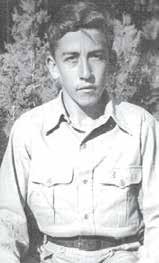


World War II saw the expansion of air assets for major combatants with the American factories producing an astonishing 300,000 aircraft during the course of the war. Pilots and aircrew were needed to fly these planes, and Arthur Post of Milwaukee, Wisconsin, was one of those who answered the call. Captain Post was a Jewish officer who became the commanding officer of the 8th Photographic Reconnaissance Squadron, 5th Air Force. They were based at 14 Mile Drome in New
Guinea and flew photo reconnaissance versions of the P-38 Lightning.
On September 28, 1943, Post was flying alone and unarmed in a mission to photograph Japanese installations on Rabaul. After photographing the base, he noticed an enemy convoy but was attacked by fighter planes. After skillfully evading the planes for a while, a Japanese Zero shot out his engines. Post was forced to jump out of his aircraft; his parachute opened up just 500 feet from

the ground. Despite an injured leg and severe burns, he managed to avoid capture and used native assistance as he survived a hundred days in the jungle. He gathered intelligence on enemy installations and soon made contact with Australian Coastwatcher Malcolm Wright. Finally, Post was rescued by the submarine USS Grouper (SS-214) and taken to Australia. Post was awarded the Distinguished Service Cross for this mission. Tragically, on August 25, 1944, his plane fell into the
sea off the coast of Biak, and Post didn’t survive the crash.
Yom Hazikaron and Memorial Day should be for remembrance to those who made the ultimate sacrifice for our freedom.
Avi Heiligman is a weekly contributor to The Jewish Home. He welcomes your comments and suggestions for future columns and can be reached at aviheiligman@gmail.com.

MAJOR APPLIANCE REPAIR
Servicing Washers , Dryers , Refrigerators , Dishwasher, stoves
All work guaranteed. Call 718 3762288
VACUUM SALES AND REPAIR
All areas call Max Flam 718-444-4904
THE LEATHER SHOPPE
The spot for all your custom leather Judaica. Tallis/tefillin bags, lulav and esrog bags, havdallah sets, challah covers, shtenders, pesach sets, matzah/afikomen bags. WhatsApp: (732) 523-0007 or email: theleathershoppe732@gmail.com for a full catalog. We ship.
MY MOTTO IS DON’T WAIT TO buy real estate
Buy real estate and wait Your realtor for life 516-784-0856 Alexandra at Realty Connect USA
PEACEFUL PRESENCE STUDIO
Men’s private yoga, Licensed Massage & Holistic Health Guidance 436 Central Ave, Cedarhurst Info. & free video training www.peacefulpresence.com 516-371-3715
GERBER MOVING
FULL SERVICE MOVING Packing Moving Supplies
Local Long Distance. Licensed Insured 1000’S Of Happy Customers Call Shalom 347-276-7422
HANDYMAN AVAILABLE
For big or small jobs, Sheetrock, carpentry, painting, electrical, plumbing, install & repair appliances Call Ephraim at 347-593-4691
MANAGEMENT STAFF WILL ASSIST
you with:
* Obtaining Medicaid and Pooled Income Trust
* In-home Assessments, Individual and Family Counseling
* Securing reliable home care assistance
* Case and Care Management services
Dr. S. Sasson, DSW, LCSW (718) 544- 0870 or (646) 284-6242
HAIR COURSE:
Learn how to wash & style hair & wigs. Hair and wig cutting, wedding styling Private lessons or in a group Call Chaya 718-715-9009
ZEVIZZ WOODTURNING JUDAICA Challah knifes, batei mezuzah, besamim holder, kiddish cups, havdalah candle holders, yad for sefer torah, pens, stenders, bowls and more 952-356-2228
DON’T GET STUCK WITH A TWO STORY HOUSE YA KNOW, IT’S ONE STORY BEFORE YOU BUY IT BUT A SECOND STORY AFTER YOU OWN IT!
Call Dov Herman For An Accurate Unbiased Home Inspection
Infrared - Termite Inspection
Full Report All Included NYC 718-INSPECT
Long Island 516-INSPECT www.nyinspect.com
LAWRENCE
5 Bedroom, 3 Full Bath Center Hall Colonial. Prime Location in Lawrence. Formal Dining Room, Formal Living Room, Den, Kitchen, Bedroom + Full Bath on the 1st Floor. Second Floor
- Master Bedroom - Full Bath, plus 3 Additional Bedrooms and Full Bath. Gas Heating, Basement with Lots of Storage and Utilities. Lot Size 76X122. Great Corner Property. Mark Lipner Associate Broker Berkshire Hathaway Laffey International 516-2988457 mlipner@bhhslaffey.com
LAWRENCE
Stunning One of a Kind Mid Century Modern 6 Bedroom, 6.5 Bath, Contemporary Ranch. Resort Style Home on Over an Acre of Property in Back Lawrence. Incredible Views, Regulation Size Tennis Court - Deco Turf. IG-Gunite Pool, Low Taxes, 5318 sq. ft. of Main Floor Living Space. Plus 5000 sq. ft. Basement With Very High Ceilings. Call Mark 516-298-8457 for more details Mark Lipner Associate Broker Berkshire Hathaway Laffey International 516-298-8457 mlipner@bhhslaffey.com
CEDARHURST JUST LISTED
Magnificent renovated 4 bedroom 3 bathroom in SD#15, new roof, windows, plumbing + electric, gas cooking, new marble bathrooms, marble kitchen with stainless steel appliances, LED lighting, security cameras and speakers throughout the home, custom closets, outdoor patio, 1 car garage, near all. Mark Lipner Associate Broker Berkshire Hathaway Laffey International 516-298-8457 mlipner@bhhslaffey.com

CAN’T AFFORD YOUR PROPERTY TAXES? MORTGAGE?
Must sell for any reason? Call for FREE Consultation. Call now 212-470-3856 Cash buyers available!
NORTH WOODMERE
Stunning Split, 5 Bedrooms With 3 Full Baths. Custom Features Throughout. Well Maintained Home. Hardwood Floors, Granite Counters in kitchen, Formal Living Room and Dining Room, Den, Full Finished Basement. Relax in the Private Backyard With Inground Pool. SD#14. A must see! Close To All Houses of Worship Mark Lipner Associate Broker Berkshire Hathaway Laffey International 516-298-8457 mlipner@bhhslaffey.com
WOODMERE
Charming Colonial on beautiful tree lined street in the heart of Old Woodmere. Home features 3 bedrooms, 1.5 baths, kitchen, dining area, living room, full basement. Relatively new heating system + hot water tank. Large & beautiful backyard. Great for entertaining. Close to all. Mark Lipner Associate Broker Berkshire Hathaway Laffey International 516-298-8457 mlipner@bhhslaffey.com
WOODMERE
Beautiful, brick, colonial boasting 5 bdr 3.5 Bth in pristine condition. Excellent location, near all! Move right in! RCUSA 516-512-9626
WOODMERE
New to the market renovated 3 bedroom 2 full bathroom ranch home with a full finished basement in the heart of Woodmere, sd#15, on a lot size 90x118, gas heat, central air conditioning, garage, new windows, roof, siding, appliances, lighting, kitchen and bathrooms. Eat in kitchen with 2 sinks, 2 dishwashers, double oven, island, lots of cabinets and storage. Spacious renovated basement with lots of storage, washer dryer and utilities, minutes to the railroad, shopping and houses of worship. Mark Lipner Associate Broker Berkshire Hathaway Laffey International 516-298-8457
mlipner@bhhslaffey.com
NORTH WOODMERE
Meticulously maintained fourbedroom, two-bathroom home on an expansive corner. Main floor: entrance foyer, generously sized bedroom, a full bath, attached two-car garage. On the next level: sophisticated formal living room with cathedral ceilings, eat-in kitchen, formal dining room, sleek black banisters, hardwood floors. Third floor: master suite, two additional bedrooms, and another full bath. Lower level: cozy den with brick fireplace, laundry facilities, ample storage space, and utilities. New heating system, central air conditioning, custom closets throughout, inground sprinkler system. Conveniently located near parks, shopping centers, and houses of worship, and situated within SD#15 with low taxes. Mark Lipner Associate Broker Berkshire Hathaway Laffey International 516-298-8457
mlipner@bhhslaffey.com
WOODMERE
Welcome to this stunning residence situated on a tranquil residential street in Lawrence SD#15. This spacious and flawlessly maintained home boasts 4 to 5 bedrooms. Bright, airy living room with vaulted ceilings, skylights and wet bar. Central air conditioning, elegant quartz countertops, eat-in kitchen, formal dining room, main floor den with fireplace, master bedroom with bathroom snd dressing room, Jacuzzi tub, three other bedrooms and two full bathrooms. Inground sprinklers, lush landscaping, alarm system. Spacious playroom. Two-car garage. Mark Lipner Associate Broker Berkshire Hathaway Laffey International 516-298-8457
mlipner@bhhslaffey.com
LAWRENCE
New to the market 5 bedroom
3.5 bathrooms prime location with a lot size 77x130 features an eat-inkitchen, formal dining room , main floor den , formal living room with vaulted ceilings, finished basement, 2 car garage, gas heat, central air conditioning, in ground sprinkler, alarm call for more details.
Mark Lipner Associate Broker Berkshire Hathaway Laffey International 516-298-8457 mlipner@bhhslaffey.com
WOODMERE
Woodmere just listed 3 bedroom 2 full bathroom hi-ranch in sd #15 with central air-conditioning , gas heat, 2 car garage, eat-in-kitchen, l/r, d/r, den, hardwood floors, minutes to transportation , shopping, and houses of worship Mark Lipner Associate Broker Berkshire Hathaway Laffey International 516-298-8457 mlipner@bhhslaffey.com
NORTH WOODMERE
New to the market magnificent 5 bedroom 3 full bathroom split level. Bright & sunny, living room with vaulted ceilings, formal dining room, eat-in-kitchen, den with fireplace, sunroom, 2 car garage, gas heating, central air conditioning, master bedroom with en-suite, hardwood floors, in ground sprinkler system, plus so much more.
Mark Lipner Associate Broker Berkshire Hathaway Laffey International 516-298-8457 mlipner@bhhslaffey.com
School district. New to the market. 4 bedroom 3 full bathroom home features living room with a fireplace, formal dining room leading out to the deck, eat-in-kitchen with granite countertops, stainless steel appliances, 2 dishwashers, double oven, new microwave, primary bedroom with an en-suite bathroom, plus 3 additional bedrooms and 2 full bathrooms, large family room, central air conditioning, gas heat, in-ground sprinklers, hardwood floors, modern high hat lighting, custom window treatments, driveway has recently been done, 2 car garage, beautifully landscaped plus so much more.
Mark Lipner Associate Broker Berkshire Hathaway Laffey International 516-298-8457 mlipner@bhhslaffey.com













Introducing a stunning new construction home. Nestled in a picturesque neighborhood. Large windows, open-concept layout that merges the various living spaces. The expansive living room is bathed in natural light, thanks to the windows that offer great views of the surrounding area. Gourmet kitchen with top-of-theline stainless steel appliances, sleek cabinetry, expansive center island with a breakfast bar. Ample counter space and a well-designed layout. Wonderful dining area providing. Large glass doors, spacious patio. Luxurious master suite with a spacious bedroom, a lavish ensuite bathroom and a large walk-in closet. Additional bedrooms. High-end finishes, premium flooring, and custom details throughout.
Mark Lipner Associate Broker Berkshire Hathaway Laffey International
Spacious home within school district 14 with exquisite upgrades and central air conditioning, splendid kitchen with dual sinks, five bedrooms. Main level encompasses a spacious great room, office space, complementing the formal living and dining areas.
Unfinished basement, detached garage. Expansive lot, measuring 80 x 100. Conveniently located near shopping, railroad, restaurants and places of worship.
Mark Lipner Associate Broker Berkshire Hathaway Laffey International 516-298-8457 mlipner@bhhslaffey.com


Introducing a stunning 14-side hall colonial home in the Hewlett Woodmere School District. Formal living room, formal dining room, den with a skylight. Eat in Kitchen, two sinks, a double oven, a warming draw and a microwave. First floor bedroom, a full bathroom and laundry room. Two-car garage. Upper level has four bedrooms, two full bathrooms. Finished basement with playroom, storage and utilities. Well-groomed exterior with porch adjoining the master bedroom. Hardwood floors and back patio. Central air conditioning, inground sprinkler system, alarm system. Close proximity to schools, shopping centers, restaurants, and transportation options.
Mark Lipner Associate Broker Berkshire Hathaway Laffey International 516-298-8457 mlipner@bhhslaffey.com
1st showing spacious bright and sunny 5 bedroom 3 full bathrooms in school district 15. Features an expanded gourmet kitchen with stainless steel appliances, 2 sinks, double oven, warming drawer, great counter space, central air conditioning, gas heat, 2 of the bathrooms are new, hardwood floors, recessed lighting, in ground sprinkler, gas line for the barbeque, 2 car garage and minutes to all.
Mark Lipner Associate Broker Berkshire Hathaway Laffey International 516-298-8457
mlipner@bhhslaffey.com

classifieds@fivetownsjewishhome.com • text 443-929-4003 APT./COOP/CONDO SALE
LAWRENCE
New to the market 2 bedroom 2
full bathrooms top floor elevator building, 24 hr doorman, open concept, totally renovated kitchen, granite counter tops, stainless steel appliances, 2 dishwashers, island, 2 new bathrooms, terrace, central air conditioning, u/g parking, high hats throughout, custom closets minutes to shopping, railroad, park, and houses of worship Mark Lipner
Associate Broker Berkshire Hathaway Laffey International 516-298-8457 mlipner@bhhslaffey.com
WOODMERE
New to the market studio co-op apartment, elevator building, high ceilings, low maintenance, laundry room on premises, minutes to the railroad, shopping, restaurants and houses of worship. $130K Mark Lipner
Associate Broker Berkshire Hathaway Laffey International 516-298-8457 mlipner@bhhslaffey.com
Totally renovated 1 and 2 Bedroom, Apartments with washer/dryer, kitchen with quartz countertops, stainless steel appliances. Recessed lighting, hardwood floors, storage in basement. Close to RR, shopping, and houses of worship. Mark Lipner Associate Broker Berkshire Hathaway Laffey International 516-298-8457 mlipner@bhhslaffey.com
1 bedroom apartment, elevator building, eat-in kitchen, full bath, hardwood floors, plenty of closet space. Ceiling fan in bedroom & kitchen, laundry room in the basement. Close to the railroad, shopping, and houses of worship. $179k Mark Lipner Associate Broker Berkshire Hathaway Laffey International 516-298-8457 mlipner@bhhslaffey.com
LAWRENCE
New to the market spacious 1 bedroom 1.5 bathroom condo, elevator building, central air conditioning, garage parking, 24hr doorman, many closets, kitchen with granite countertops, generous counter space, washer/dryer, minutes from shopping, park, transportation and houses of worship Mark Lipner Associate Broker Berkshire Hathaway Laffey International 516-298-8457 mlipner@bhhslaffey.com
LAWRENCE
New to the market 1 bedroom 1.5-bathroom condo apartment, elevator building, 24 hr doorman, central air conditioning, washer/dryer, u/g parking, terrace, many closets, social room, gym, library minutes to shopping, restaurants, transportation and houses of worship. Mark Lipner Associate Broker Berkshire Hathaway Laffey International 516-298-8457 mlipner@bhhslaffey.com
LAWRENCE JUST LISTED
This amazing two-bedroom two full bathroom condo Features a luxurious lifestyle in the beautiful city of Lawrence. What more could you ask for? The building has a 24-hour doorman and elevator access, with a social room, library, washer/dryer inside the unit, and terrace. Plus, the added benefit of having a live-in super to ensure maximum safety and security! And don’t forget about your new kitchen complete with a gas stove, refrigerator, microwave, and even two dishwashers! The living room and dining room are spacious and have recessed lighting installed throughout. Both bedrooms feature lots of closet space for storage. To top it off, there’s even garage parking available to make your life just that much easier! Don’t miss out on this incredible opportunity. Please call for a private showing Mark Lipner Associate Broker Berkshire Hathaway Laffey International 516-298-8457
mlipner@bhhslaffey.com

SYNERGISTIC SUBLET
We produce brands and video with offices on Central Ave. Sublet includes internet & graphics / editing computers & software. Rates commensurate with space needed. Contact David Jasse 9175705514
1500SF LOFT OFFICE
(formerly Shmuel Flaum Architect) 2 store/offices; ~600sf each
2 Cedarhurst offices; ~100sf each
Starting at $650 Also… Large Parking Lot & Storage available Utilities, Internet & Parking incl. with some Kosher kitchen – Minyan Next to LIRR - No broker fee Call/text/Whatsapp: 516-206-1100
CEDARHURST
2 bedroom 2 bathroom apartment, private entrance, washer/dryer, central air conditioning, freshly painted, hardwood floors, recessed lighting, garage parking, stainless steel appliances, great courtyard, minutes to the railroad, shopping, restaurants, park and houses of worship. Mark Lipner Associate Broker Berkshire Hathaway Laffey International 516-298-8457 mlipner@ bhhslaffey.com
Welcome To Luxury Living in The Heart of Hewlett! This Spacious 2 Bedroom, 2 Full Bathroom Condo Boasts in Unit Separate Laundry For Ultimate Convenience. Enjoy Lovely Courtyard Views from Your Private Terrace. With Elevator Access and A Doorman, Experience The Epitome Of Comfort In This Prestigious Building. Mark Lipner Associate Broker Berkshire Hathaway Laffey International 516-298-8457 mlipner@bhhslaffey.com

WOODMERE
Totally renovated bright and sunny 1 bedroom corner unit apartment with a washer/dryer. Features quartz countertops, ss appliances, recessed lighting, bathroom with chrome fixtures, close to the railroads, shopping and houses of worship. Call for details Mark Lipner Associate Broker Berkshire Hathaway Laffey International 516-298-8457 mlipner@bhhslaffey.com
CEDARHURST
1, 2 and 3 bedroom apartments, totally renovated private entrance , central air conditioning, hardwood floors, washer/dryer, garage parking, dishwasher, recessed lighting, private playground, close to railroad, park, shopping and houses of worship. Call for more details
Mark Lipner Associate Broker Berkshire Hathaway Laffey International 516-298-8457 mlipner@bhhslaffey.com
DUE TO EXPANSION
TAL Academy seeks outstanding special educators and Rebbeim for the 24-25 school year. Please send resumes and cover letters to careers@talacademy.org
5 Towns area Nursing Home management office seeking a Regional/Corporate level MDS Nurse to work in our office. Must be an RN. Regional experience preferred. 2-3 years MDS experience with good computer skills required. Position is Full Time but Part Time can be considered. Great Shomer Shabbos environment with some remote options as well. Email: officejob2019@gmail.com

classifieds@fivetownsjewishhome.com • text 443-929-4003
GREAT OPPORTUNITY!
Seeking Home care PT, OT, SLP therapists in Brooklyn, Nassau, Queens. Competitive rates. Email resume to apply@linkhometherapy.com.
SEEKING ELA TEACHER
Teaching position for Gr. 6. Mon.-Thurs., afternoon hours. Far Rockaway/5T area. Great salary, warm, supportive environment. Training in our curriculum is provided. Teachersearch11@gmail.com
POSITION AVAILABLE
Female Head Lifeguard needed at CCRP pool in FR this summer. Mon-Thurs evenings and Sundays Must have Lifeguard certification. Please contact: 646-345-6990 or ericmaslin@me.com
BOOKKEEPER
Excellent growth potential, Frum environment, Excellent salary & benefits. Email resume to: resumetfs1@gmail.com
BNOS MALKA ACADEMY
In Queens is seeking office staff. P/T or F/T. Send resume to office@bnosmalka.org.
REGENTS EXPERT
Tutoring regents in Algebra and Geometry A Darchei Torah instructor. Guaranteed results Text 347-491-8045 WhatsApp 347-767-1755
A YESHIVA IN QUEENS
is looking for an experienced part/ full time secretary, 2-year-old morah, kindergarten morah, kindergarten morah assistant and Pre-1A English teacher for the 2022-2023 school year. Nice and timely pay. Please email resume to mshelt613@gmail.com or call/text 718-971-9799.
THE GURAL JCC
Early Childhood Center is hiring Assistant Teachers for the 2024-2025 school year, and Camp Staff over 16-years-old for Summer, 2024. Please send resumes to JCC.Nursery@guraljcc.org or call (516) 239-1354.

SHARE YOUR HEART WITH A
Sweet 18-year-old girl in need of a warm home. Seeking a family living in NY or NJ to welcome her into their home. Support provided. Contact 347831-3315.
DEVELOPMENT ASSISTANT
A multi-tasker needed for general office work. The ideal candidate is someone who is detail-oriented, responsible, and can take ownership. Looking for someone who is eager to learn, and expand his/her skill set while possessing the ability to work independently and as part of a team. Experience with Excel required. Five Towns location. In-office position only, not remote. Please send resume to 5tpart.timecareer@gmail.com
BNOS MALKA ACADEMY
In Queens is seeking teachers and assistants for the upcoming academic year. Kodesh, general studies, gym, art, computers. Send resume to rungar@bnosmalka.org
5 TOWNS BOYS YESHIVA Seeking Elem Gen Ed Teachers
Excellent working environment and pay. Only lic/exp need apply. Email resume to yeshivalooking@gmail.com
YESHIVA DARCHEI TORAH
In Far Rockaway is looking for secular studies teachers for grades 5-8. We are a warm, professional, supportive and collaborative environment offering a competitive salary.
Monday-Thursday - 5th grade-1:20-4:30 6th-8th grades 2:30-5:30
Send resumes or inquiries to mleff@ darchei.org
SHMIRAS HALASHON
Text 516-303-3868 with a time slot of your choice to be careful on lashon hara. Be a part of the 1,000 people for klal yisroel!

Everyone knows Uncle Sam is spending money faster than he takes it in. Just how fast? As of March 1, according to CNBC, we’re adding a trillion dollars to the national debt every 100 days. Naturally, that eye-popping number has the IRS scrambling for every nickel they can find. So they’ve launched all sorts of campaigns to squeeze more money out of particularly promising prospects. Some are dreadfully technical and dull, like the “FIRPTA reporting for NRAs” campaign. (For the record, that involves withholding a 15% tax on gains when non-resident aliens sell U.S. real estate.) Others target a small number of high-dollar opportunities, like the “expatriation of individuals” campaign chasing after taxpayers who renounce their U.S. citizenship, or the “business aircraft campaign” that targets personal use of corporate jets.
But some of those campaigns target higher-profile taxpayers. The independent newsroom ProPublica has just released a story highlighting a new “Sports Industry Losses” campaign, “designed to identify partnerships within the sports Industry that report significant tax losses and determine if the income and deductions driving the losses are reported in compliance with the applicable sections of the Internal Revenue Code.”

Pro sports teams are some of the most valuable businesses in America, jewels in capitalism’s crown. Forbe s magazine reports the Dallas Cowboys are worth $9 billion. Even the least valuable NFL franchise, the Cincinnati Bengals, is worth 3.5 $ billion. Basketball and baseball
ner before every game. You want us to pay income taxes too?”)
Let’s look at the Los Angeles Clippers to see how it works. Steve Ballmer, the former Microsoft CEO, bought the team for $2 billion in 2014. (They’re worth $4.65 billion today.) But he didn’t just buy “the team.” He bought a collection
As former Cleveland Indians and Chicago White Sox owner Bill Veeck once said, “Look, we play the Star Spangled Banner before every game. You want us to pay income taxes too?”
and even many of the concession workers selling hot dogs and beer in the stands. Critics of the current rules argue that writing off some assets, like broadcast rights, is abusive. Why? Because the value of the asset never really goes down. This is especially true for the NFL, which dominates TV ratings and distributes revenue equally among the 32 teams. There’s one downside of the current rules, however. Writing off assets when you buy them means paying more tax down the road when you sell them. But sports franchise owners can afford the best tax planners in the business to manage those obligations when they sell. And if franchise owners die without selling their team, the “stepped-up basis” rules eliminate any such taxes for their lucky heirs.
franchises sport similarly glittering numbers, with the New York Yankees hitting 7.1$ billion and the Golden State Warriors reaching 7 $ billion.
Where’s the tax issue? It turns out that many owners are using noncash amortization and depreciation deductions to offset cash income and cut their tax bill, in some cases, to zero. (As former Cleveland Indians and Chicago White Sox owner Bill Veeck once said, “Look, we play the Star Spangled Ban-
of assets that includes player contracts and TV deals that he can write off over 15 years. Separating out those assets lets him deduct players like his own crown jewel, LeBron James, twice – once against his operating income, and a second time against his purchase price. From 2014-2018, Ballmer deducted over $700 million in operating losses for a business that generates over $400 million in revenue per year. Ballmer himself paid a lower tax rate than his star James
There’s no reason to assume the IRS is looking for illegal behavior. Rather, as is so often the case, the real scandal is what’s legal . But who can blame team owners for taking every advantage in the code? You should do the same – so call us for a three-pointer against the IRS!
Allan J Rolnick is a CPA who has been in practice for over 30 years in Queens, NY. He welcomes your comments and can be reached at 718-896-8715 or at allanjrcpa@aol.com.
Have you ever come to Washington, D.C. to lobby for Israel / American relations?
Have you ever gone in May to advocate with NORPAC?
If not, let me just warn you not to take, nor pack, anything. You’ll be shlepping it with you all day, going from meeting to meeting, congressional building to congressional building.
It’s worth going, of course, because we need to be heard from.
But be prepared – you’ll be running around all day from here to there. You’ll start your day with grabbing stuff. Starting with a to-go lunch, a water bottle, and important talking points packet. Then you’ll be adding business cards and notes as the day goes on to it. If you
stop a second to organize anything or take a call…you may suddenly have to figure out where your group just disappeared to…
There are prearranged meetings to show up to and we can’t show up late. You’re there to make an impression. But senators and House members can show up late. You’re on their turf.
Now, you might also be wondering, are the people you’re meeting with really hearing your arguments and/or your requests? Are you making an impact?
You hope so.
You woke up at 5:30 a.m. Shlepped on a bus for five hours. Lined up for the bathrooms, which, of course, are down three flights of steps. Sat through some speeches, though those were the ones that you


didn’t have to influence, so it was easy. But then they send you off in multiple directions seeing what kind of abuse you can tolerate to make things happen. Most of all, you are learning you
need not be silent. You need not stay at home and feel defeated. Hopefully, the impact of 1,200 Jews descending on D.C. and pleading their case was worth the day out of your busy schedule.
Rivki Rosenwald is a Licensed Marriage & Family Therapist working with both couples and individuals and is a certified relationship counselor. Rivki is a co-founder and creator of an effective Parent Management of Adolescent Years Program. She can be contacted at 917-7052004 or at rivkirosenwald@gmail.com.

